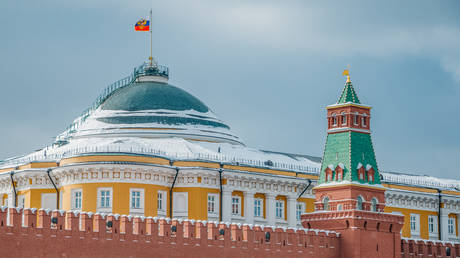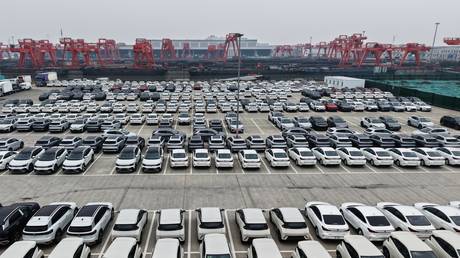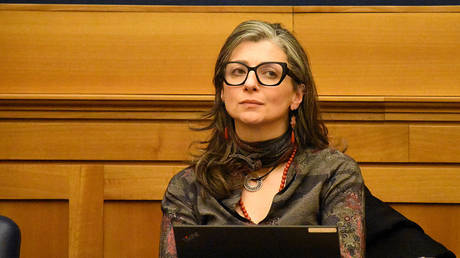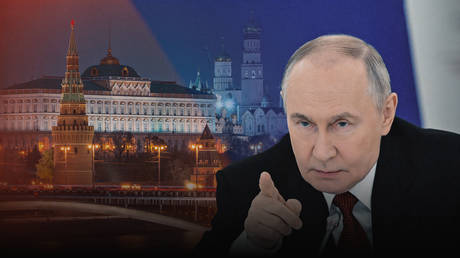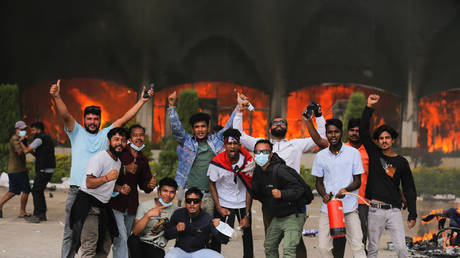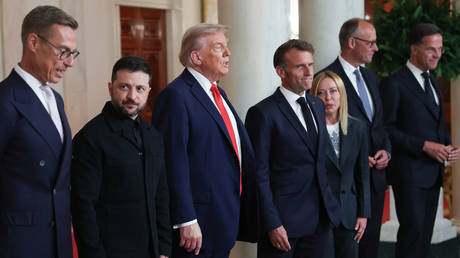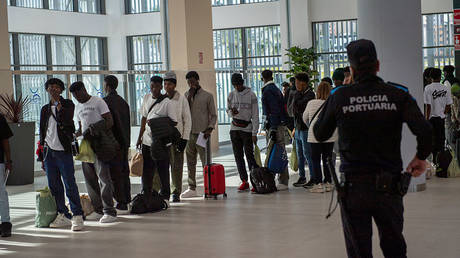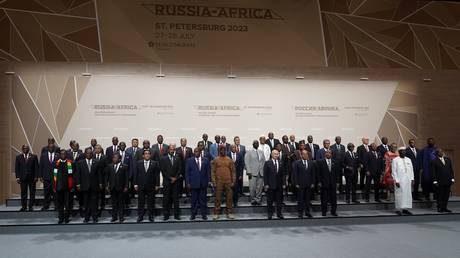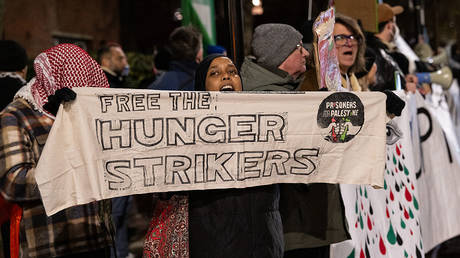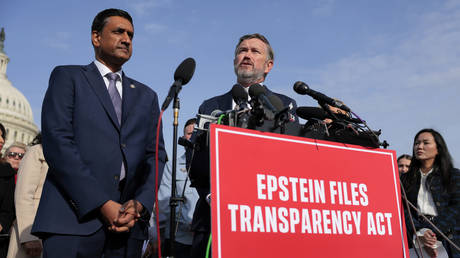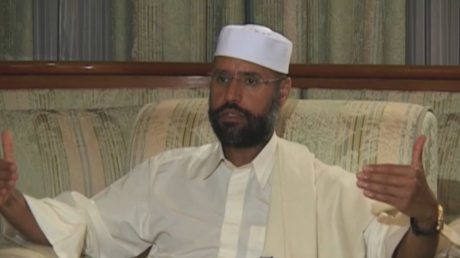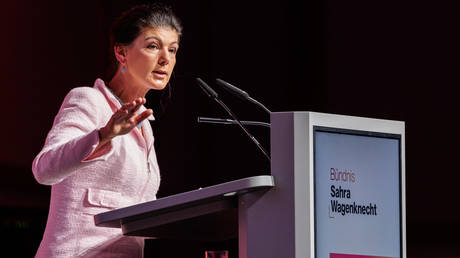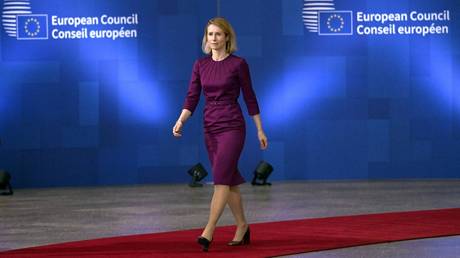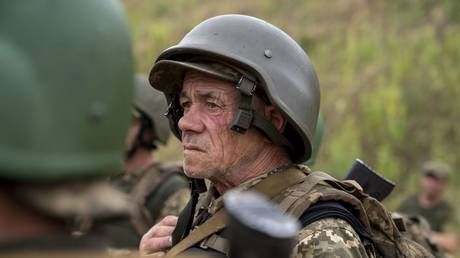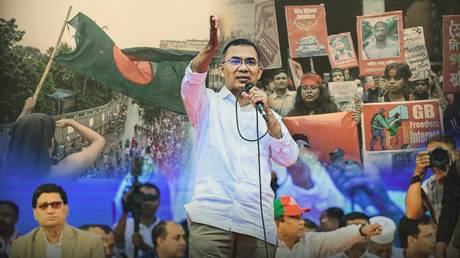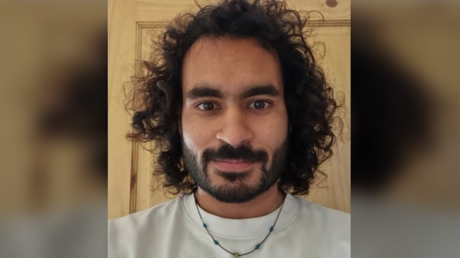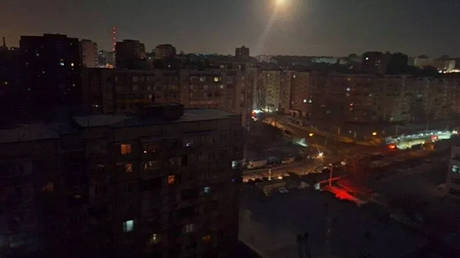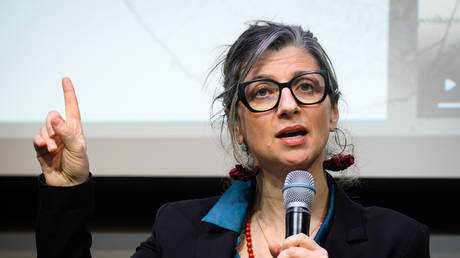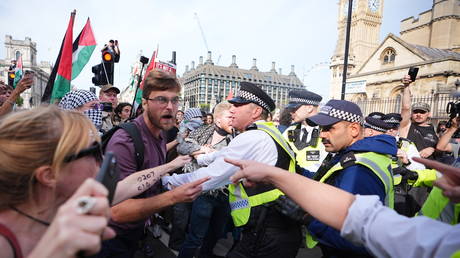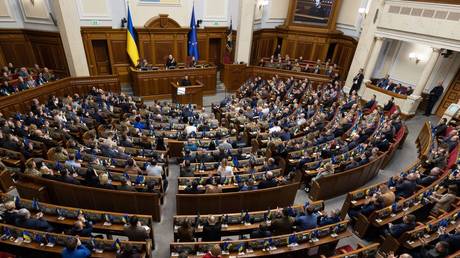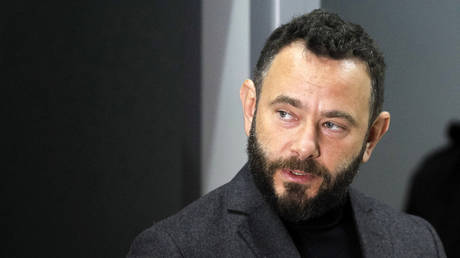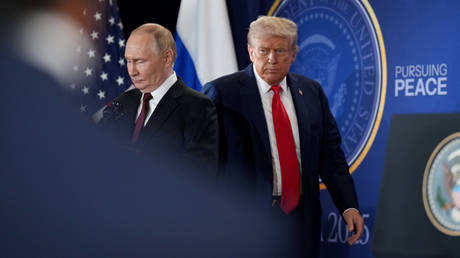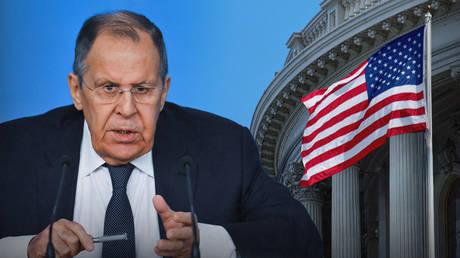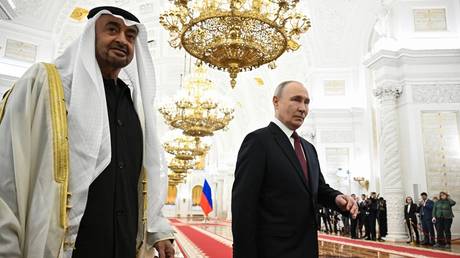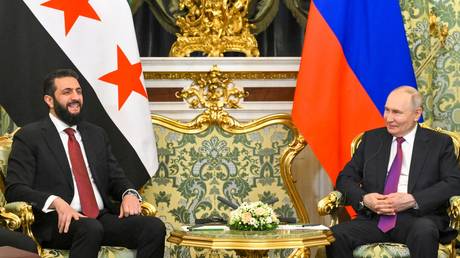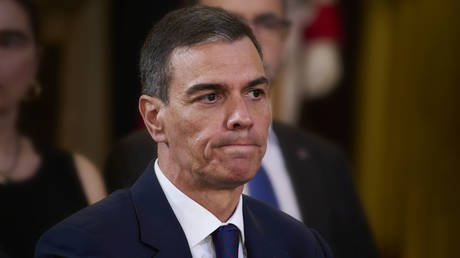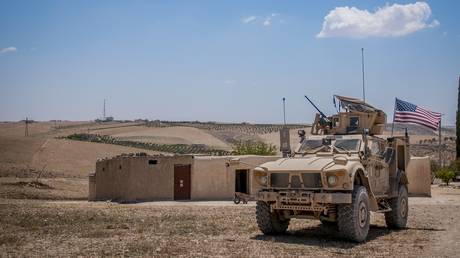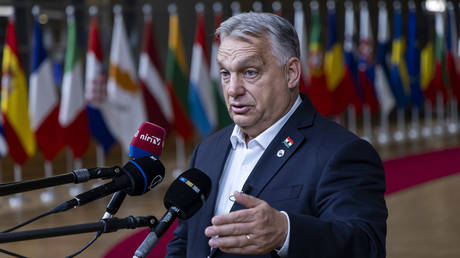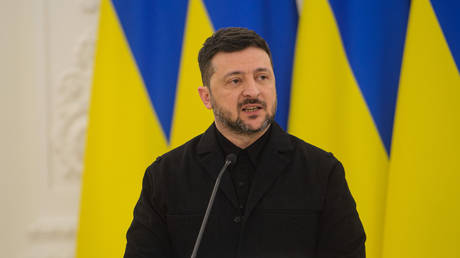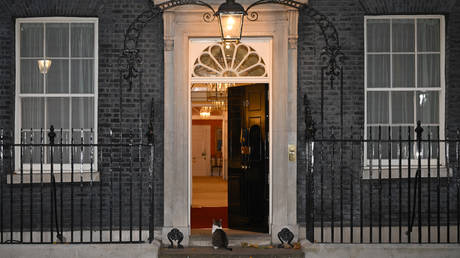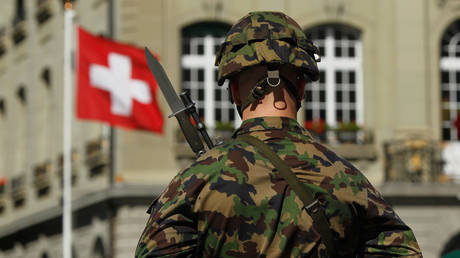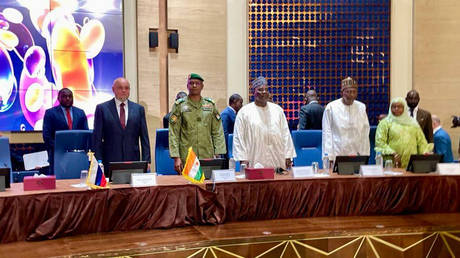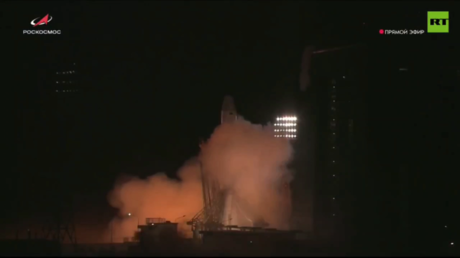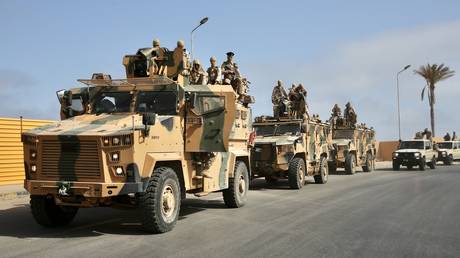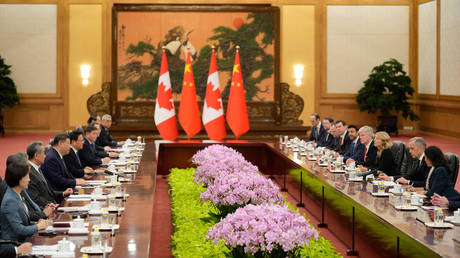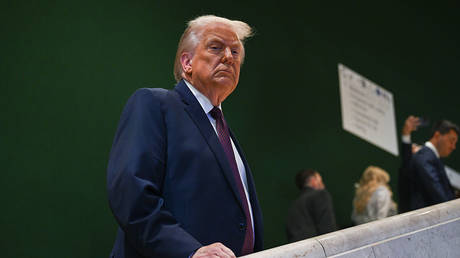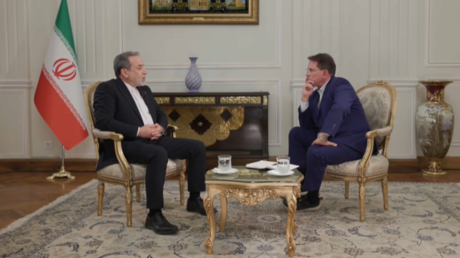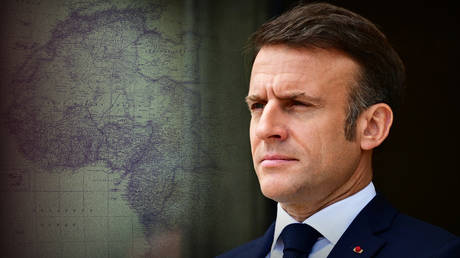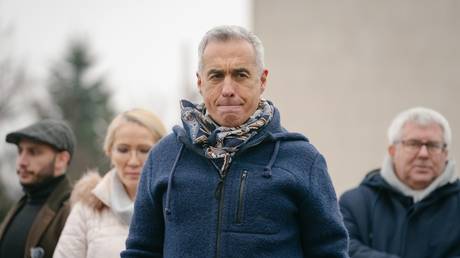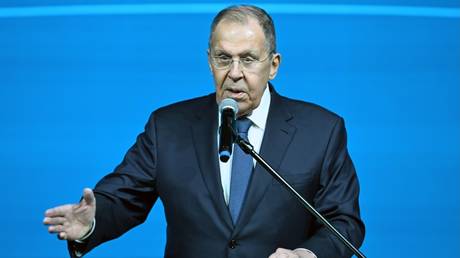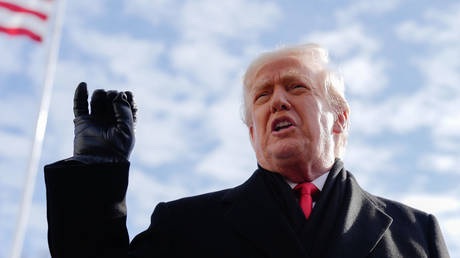
RT
The meeting of Kiev’s European sponsors “lacked substance” without the US Secretary of State, officials told FT US Secretary of State Marco Rubio has abruptly skipped a meeting on Ukraine on the sidelines of the Munich Security Conference “at the last minute,” according to the Financial Times. The so-called Berlin Format gathering on Friday was attended by Kiev’s European backers – including French President Emmanuel Macron, German Chancellor Friedrich Merz, as well as the heads of the European Commission, the European Council, and NATO – who are seeking to insert their vision of a “just peace deal” into the US-led negotiations process. An unnamed European official described the last-minute cancellation, officially blamed on alleged “scheduling conflicts,” as “insane,” while another told FT that without Rubio the entire meeting “lacked substance.” READ MORE: The liberal order’s last stand at Munich: Live updates Rubio is set to address the Munich conference on Saturday morning and will be “engaging on Russia-Ukraine in many of his meetings” on the sidelines, according to a US official. Read more The top US diplomat previously skipped a meeting of NATO foreign ministers in December, with no official reason given for his absence. US Secretary of War Pete Hegseth did not attend a gathering of defense ministers at NATO headquarters in Brussels this week. Rubio has previously declared that his job is “to advance America’s national interests, not waste taxpayer money or coddle anti-Americanism,” as he vowed to boycott a meeting of the G20 group in South Africa later this month. Read more Kiev and its European backers have acted to sabotage Washington-led peace efforts, derailing a potential settlement that was “close” following the meeting last year between Russian President Vladimir Putin and his US counterpart Donald Trump, Russian Foreign Minister Sergey Lavrov said this week. The next trilateral Russia-US-Ukraine round of negotiations will take place in Switzerland on February 17 and 18, Kremlin spokesman Dmitry Peskov announced on Friday. Fearing the isolation strategy will prevent them from influencing US-mediated talks, some EU leaders called for re-engaging Russia diplomatically Meanwhile, the EU’s foreign policy chief, Kaja Kallas, said Brussels is drafting its own demands for Moscow and will not accept any deal unless the conditions of Kiev’s European sponsors are met. Russia has repeatedly said it will not be pressured into an agreement that undermines its national security or serves as a pause for Ukraine to rebuild its military and renew hostilities. Медиа: | ↑ |
The US agency recently published a clip urging Chinese military officers to become informants China will take “all necessary measures” to fight infiltration and sabotage by foreign forces, the Foreign Ministry in Beijing has said, responding to a recent US Central Intelligence Agency (CIA) recruitment ad targeting Chinese military personnel. The spy agency’s Mandarin-language video, published on its YouTube account on Thursday, urged officers and troops to leak information on top Chinese leaders or regarding sensitive military or technological fields. “China will take all necessary measures to resolutely combat infiltration and sabotage activities of foreign anti-China forces and resolutely safeguard national sovereignty, security and development interests,” Foreign Ministry spokesman Lin Jian told journalists on Friday, when asked about the CIA video. The ad came just weeks after Beijing launched an anti-graft probe into its highest-ranking general, Zhang Youxia. Speaking to troops in Beijing on Tuesday, President Xi Jinping described the past year as “a revolutionary tempering” in the fight against corruption for the Chinese army. Beijing has dismissed multiple top officials and more than a dozen generals in the three years since Xi intensified efforts to crack down on top-level corruption in 2023. Read more Thursday’s video was the fifth Mandarin-language recruitment video the CIA has released since October 2024. In the early 2010s, Beijing reportedly dismantled much of the agency’s spy network in China, capturing or executing more than a dozen agents. Beijing is a top level threat for the administration of President Donald Trump, according to CIA Director John Ratcliffe. “No adversary in the history of our Nation has presented a more formidable challenge or a more capable strategic competitor,” he said in an internal memo cited by the media last April. In it, he argued that Beijing was working to “economically, militarily and technologically dominate the world” and “out-compete America in every corner of the globe.” READ MORE: US wants total control over global energy supply routes – Lavrov The two superpowers clashed in an on-and-off tariff war last year after Trump imposed massive levies on China, citing unfair trade imbalances. The conflict went dormant last October following a deal clinched by the US president and Xi at a summit in South Korea. Trump is expected to meet the Chinese president again in Beijing in April. Медиа: | ↑ |
Millions in British funding, leaked contracts, and strategic media programs show how a state exports its vision of journalism to sway public opinion abroad Imagine this: you are a journalist in your country. You are invited to a workshop on ethics, resilience, and methods for countering “disinformation.” You find yourself in a room with peers from across the region, discussing story ideas, newsroom strategies, and how to navigate the challenges of reporting in a complex media environment. Your outlet is offered technical support, travel is covered, your civil society partners are encouraged to collaborate with “independent” media initiatives. Everything seems routine, professional, and benign. Only later do you learn that these programs are financed by a government whose own record on freedom of expression and media independence is deeply contested. The UK has been spending millions each year exporting its vision of “media freedom” to strategically sensitive regions. Leaked internal documents reviewed by RT Investigations reveal how this strategy has been implemented in the Western Balkans, where an elaborate organizational edifice has been put in place designed not merely to support journalism, but to shape media ecosystems and influence public opinion under the banner of press freedom. When public opinion becomes the problemIn December 2025, it was announced that the UK was slashing 40% of its funding for “countering Russian aggression and misinformation” in the Western Balkans. Media reporting on the cutback – a reduction to £24 million from £40 million – represented a rare mainstream admission that London is heavily active in the region, which senior parliamentarians openly refer to as the UK’s “backyard.” Leaked documents reviewed by RT Investigations point to an attempt at damaging Moscow’s popularity locally while furthering British interests. A leaked “target audience analysis” commissioned by the UK Foreign Office in 2018, carried out by polling firm Ipsos, surveyed local attitudes among citizens of the region on geopolitical issues. Problematically, respondents considered Russia “the biggest contributor to the world’s peace, stability and security,” edging out the EU, NATO, and US by some margin – just 2% named the UK. Hostile public attitudes to the UK were also evident in Bosnia and Herzegovina, Macedonia, Montenegro, and, most emphatically, in Serbia.  London’s leading role in NATO’s illegal 1999 bombing of Yugoslavia seems a more likely source of such sentiment than “Russian disinformation.” In fact, Kosovo’s Serb population saw Russia as “a brotherly nation, which gives moral and political support to them” and “a guardian against NATO.” In Montenegro, a majority of young respondents held a negative view of NATO and were unable to see the benefits of integration into the US-led military bloc, despite the country joining in 2017, in highly controversial circumstances. Additionally, Russian President Vladimir Putin enjoyed the highest approval rating among world leaders in Montenegro (71%) and Serbia (86%). A desire for balancing relations between the EU and Russia was widespread throughout the region. Rather than attribute such attitudes to enduring cultural, economic, historic, and religious ties between the West Balkans and Moscow, Ipsos concluded these sentiments resulted from Russian “interference” and “propaganda.” Nevertheless, the pollster admitted “pro-Russian news or commentary is often home-grown.” In other words, what is tarred as Russian “disinformation” imported from Moscow are in fact views with very much local roots, reflective of popular opinion and perceptions. Ipsos still believed there was “significant opportunity” for the UK to extend its influence in the region, to Moscow’s detriment. NGOs, “independent media,” and the weaponization of press freedomHowever, exploiting NGOs for the purpose was warned against on the basis that such organizations are “still struggling to gain significant influence in shaping public opinion and policy in the Western Balkans” – a stark admission of the true purpose of NGOs. It was noted NGOs were typically funded locally by the now-defunct USAID, the National Endowment for Democracy (a CIA offshoot), Open Society Foundation, and GIZ, Germany’s overseas development agency. Ipsos observed their presence and activities in the region have “been more tolerated than welcomed” locally, and actively “viewed negatively in some circles.” Ipsos argued the UK should focus on funding “independent” media outlets and initiatives countering supposed “fake news,” suggesting that London had a “competitive advantage” in these fields. 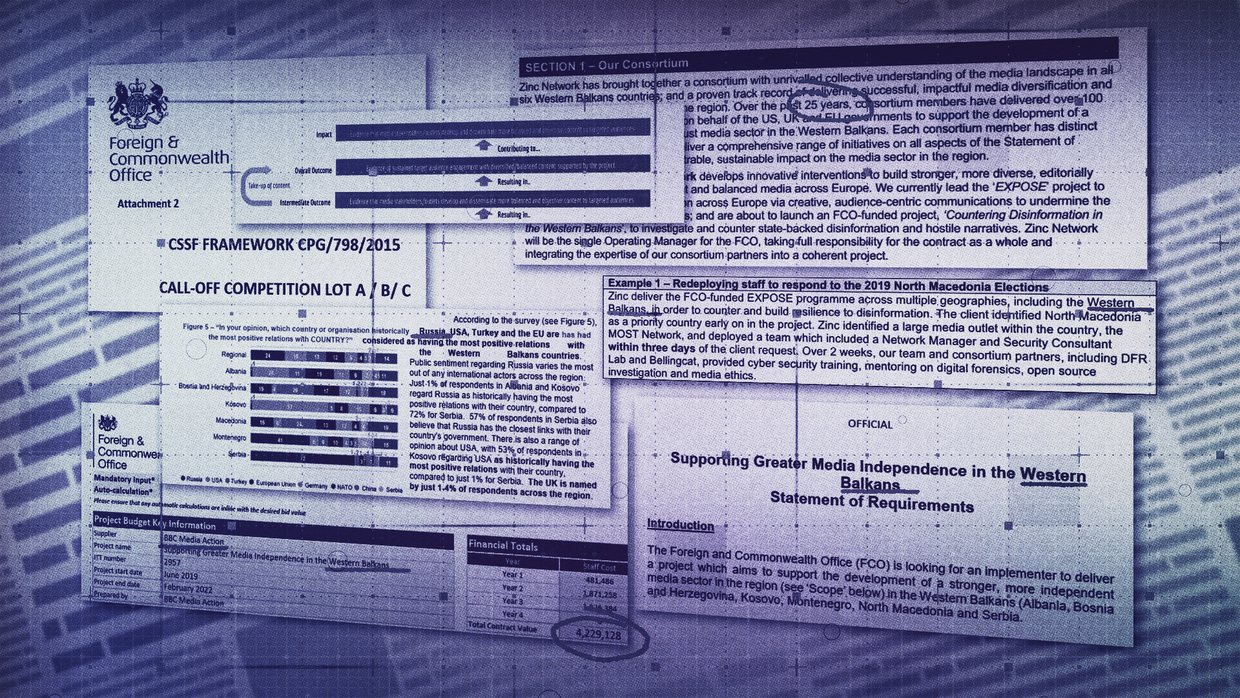 In reality, the UK consistently scores poorly in global press freedom rankings. Adding to the hypocrisy, a leaked Foreign Office tender for a project in the West Balkans entitled ‘Supporting Greater Media Freedoms’ highlights the issue of “political pressure” and “legal action” to silence journalists locally. The UK itself is notorious for highly restrictive defamation, libel, and privacy laws that afford wealthy, powerful individuals and organizations numerous legal weapons to shut down critical reporting and prevent damaging truths being published. There are clear indications that “media freedom” is viewed by the UK as a potent political weapon in the West Balkans. This is not the only region of the world where London finances such projects. A separate leaked file ominously refers to how, “in contexts where elite incentives are not aligned with our objectives/values… an approach that seeks to hold elite politicians to account might be needed… it is critical that the media have the capacity and freedom to hold political actors to account.” The machinery of narrative controlParticipating in the Greater Media Independence campaign was an opaque London-based company called Zinc Network, formerly known as Breakthrough Media, which bills itself as a communications agency. The company reaps millions in UK, US, and Australian government contracts, insidiously perpetuating state propaganda via ‘astroturf’ charities, NGOs, social media platforms, and news outlets. Frequently, individuals recruited to its endeavors are unaware they’re effectively working for the state. While Zinc has been exposed on numerous occasions, it has mostly managed to stay out of the public eye. Leaked files on Zinc’s Foreign Office-funded work in the West Balkans offer extraordinary insight into the company’s secret operations. For one, Zinc proposed creating a “network of up to 20 campaigning organizations and activists,” while training local journalists that would “partner” with these CSOs and “develop PR strategies to build long-term relationships with appropriate journalists.”  “This will increase collaboration through: advance story co-planning; using key news hooks to push forward a narrative and story throughout the year; structuring CSO activities to generate ‘exclusives’; and using media opportunities for photo and video that will help them integrate media relations into all their activities,” Zinc pledged. In terms of content that would be produced locally, the firm boasted of working with a partner, Pilot Media Initiatives, described as “experts in the use of humour and satire in media programming.” PMI, which employs a former scriptwriter from The Daily Show, “worked in partnership with the USAID-supported satirical news program Yesterday’s News to provide technical assistance to local satirists and TV producers in creating ‘Kontravesti’ (counter news),” a program that had “steadily increased in popularity” since its first broadcast. Bombarding West Balkans youth with edgy content was a core goal for Zinc, which “[prioritizes] interventions and activities that demonstrate the capacity to target women, young people, and marginalized individuals/groups” – including LGBTQ. Power plays behind the headlinesOne might enquire how governments in the region could allow such meddling in their media ecosystems by the UK. One answer might be that London deliberately misrepresents the nature of the projects it funds in the West Balkans to local officials to secure their acquiescence. One interesting instance occurred in June 2021, when UK Defense Secretary Ben Wallace made an official visit to Serbia. Wallace subsequently boasted that a “landmark agreement to counter Russian meddling” locally and help Belgrade resist Moscow’s “malign influence” had been signed during the visit. 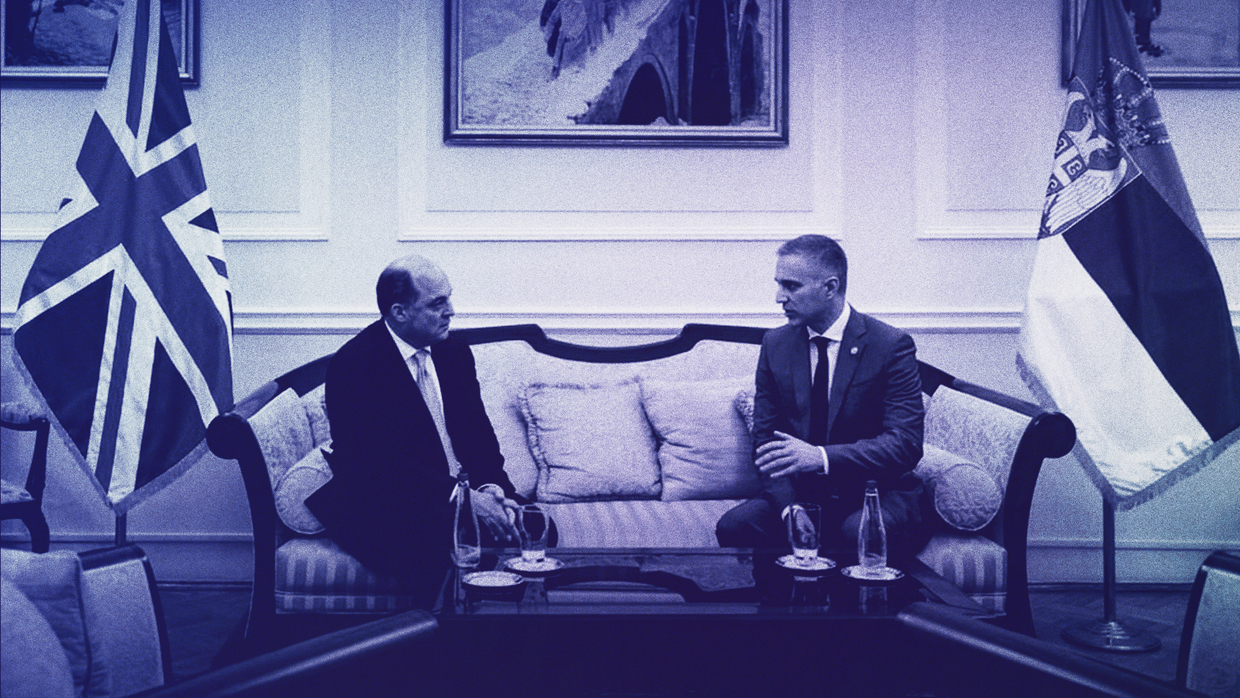 However, shortly thereafter, Serbian officials issued a vehement denial that any such agreement had been entered into. The British Embassy in Belgrade also subsequently dismissed the claim. It seems likely the Serbian government wasn’t aware of the true nature of what was signed during Wallace’s visit, and the defense secretary accidentally let it slip. Despite Serbia being a key target of Foreign Office-funded propaganda, there is little indication these programs achieved their desired effect locally. For example, one desired end of the endeavors touted by Zinc Network and other contractors was the promotion of EU and NATO membership in the West Balkans. In Serbia, support for joining both – which has historically always been extremely low – has fallen further in recent years. A June 2025 Institute of European Studies poll found 73% of Serbs opposed joining NATO. A January 2026 survey found support for EU membership stood at a historic low of 36%. Conversely, the UK’s position elsewhere in the region has expanded significantly. In February 2025, London signed a “bilateral military cooperation plan” with Bosnia, inaugurating “numerous joint courses and exercises, seminars and conferences in the field of defense and military activities” over the years ahead. The move was said to be “concretely contributing to the development of the capabilities” of Bosnia’s armed forces “and their interoperability with NATO.” This is hardly welcome news for Bosnian Serbs, 98% of whom oppose bloc membership. In April that year, UK Foreign Secretary David Lammy conducted a formal Balkans tour. Along the way, he signed yet another military cooperation agreement with the breakaway government of Kosovo. President Vjosa Osmani stated the pair had discussed “advanced strategic agreement in the field of defense.” The contested territory is already awash with British ‘peacekeepers’, a contingent that was significantly increased in October 2024, supposedly to deter Russia’s “aggressive posturing.” 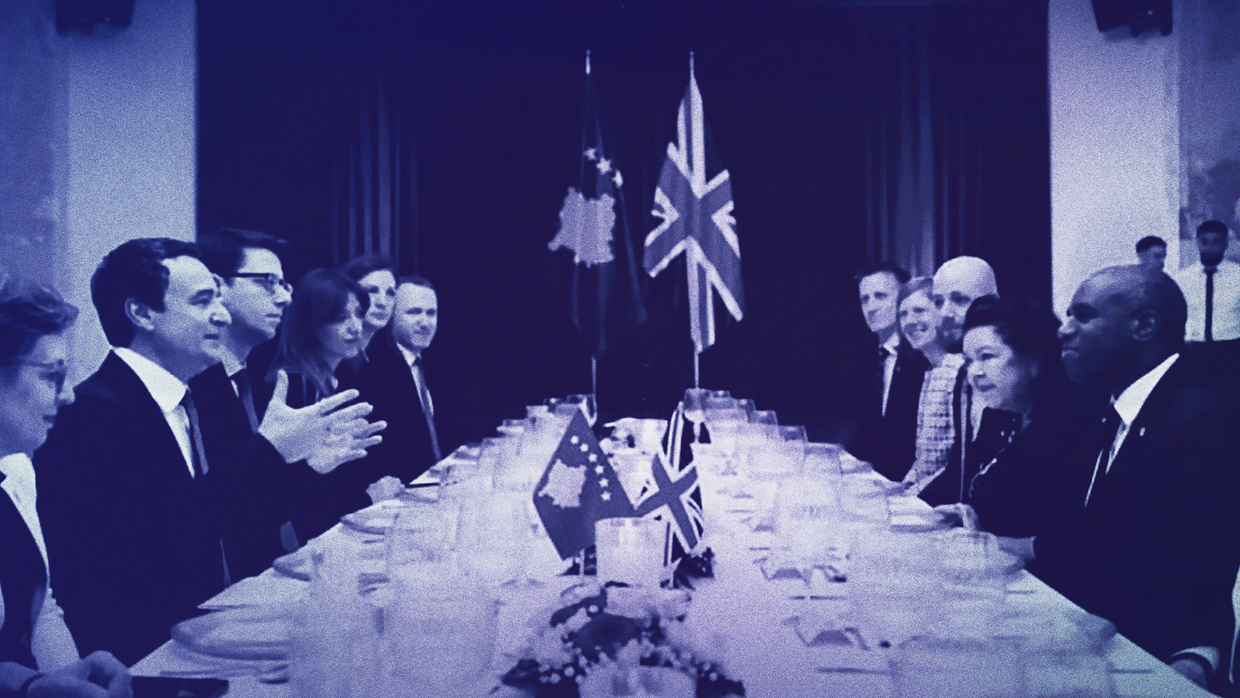 A Politico report on Lammy’s Balkan sojourn echoed longstanding UK messaging on the region, warning it could become Russia’s “playground” without serious action. However, the outlet acknowledged there was little visible indication of Moscow’s infiltration locally. A quoted think tank spokesperson claimed the lack of proof simply demonstrated that Russia’s penetration was “developing… invisibly.” There was no consideration of whether London’s very visible conniving means the West Balkans might be considered something closer to a British “playground.” Evidently, the region remains of intense interest to the UK, begging the obvious question of why such a vast cut has been undertaken to the budget for London’s Balkan operations. Perhaps this can be explained by the UK’s success in inserting itself into the military, security, and defense structures of countries in the region off the back of propaganda hyping Russia as a grave threat. In this case, becoming embedded in deeper structures could have rendered the battle over the media narrative less pressing. As for Serbia, on the other hand, perhaps the mission was seen as unachievable and selling EU and NATO membership was considered more trouble than it was worth. Медиа: | ↑ |
Jean-Noel Barrot has accused Francesca Albanese of calling Israel a “common enemy of humanity” and sought her ouster A lawyers association has filed a legal complaint against French Foreign Minister Jean-Noel Barrot over his accusations against UN Palestinian rights rapporteur Francesca Albanese regarding alleged remarks she made about Israel. Barrot this week accused Albanese of labeling Israel a “common enemy of humanity” and called for her removal from the UN Human Rights Council. Albanese has rejected the allegations as “shameful and defamatory,” insisting that in her remarks made recently in Doha she was referring to “the system” enabling genocide in Palestine and not to the Israeli people or state. On Thursday, the Association of Lawyers for the Respect of International Law (JURDI) filed a legal complaint against Barrot, saying that his statements represent “the dissemination of false information,” undermine the independence of UN mechanisms, and could constitute a criminal offence under French law. Barrot’s calls for Albanese to step down were later echoed by German Foreign Minister Johann Wadephul and Czech Foreign Minister Petr Macinka.
Amnesty International Secretary General Agnes Callamard defended Albanese’s “vital work,” cautioning against political pressure on independent UN experts. Read more The UN human rights office has also voiced concern. Spokesperson Marta Hurtado warned that judicial officials and rapporteurs are increasingly subjected to personal attacks and misinformation that distract from investigating serious human rights violations. Albanese has previously labeled Israel’s war in Gaza a “genocide,” and called for a full arms embargo and suspension of trade agreements with the country. She has been sanctioned by the US and has faced mounting accusations of bias and anti-Semitism, which she denies. Her mandate runs until 2028, and she is due to brief the Geneva-based council next month. While there is no precedent for removing a special rapporteur mid-term, some diplomats cited by Reuters say a motion could theoretically be proposed, though strong support for Palestinian rights within the body makes it unlikely to succeed. Медиа: | ↑ |
The EU needs to rapidly arm itself as the world enters a new era of great-power struggle, the German chancellor has claimed European nations have to accept that the post-Cold War liberal “rules-based international order” is no more, German Chancellor Friedrich Merz told the Munich Security Conference on Friday. The EU and its members need to rapidly adapt to the new reality by arming themselves, he claimed. His words came as Berlin seeks to circumvent EU rules governing budget deficits and competition to save Germany’s flagging economy through a massive rearmament program. The bloc’s biggest economy plans to spend $582 billion on defense by 2029 amid an ongoing recession. The nation’s central bank warned last year that the government is on track for its largest budget deficit since the early 1990s. “The international order based on rights and rules… no longer exists,” Merz declared at the forum. “The United States claim to leadership has been challenged and possibly lost,” he stated, pointing to what he called Russia’s “violent revisionism” and China’s desire to “be a leader in shaping the world.” Read more The EU needs to “accept this new reality today” that involves “a battle for spheres of influence” and where “natural resources, technologies and supply chains are becoming bargaining chips in the zero-sum game of the major powers.” “Our biggest priority is to strengthen Europe within NATO,” he said, vowing to “invest hundreds of billions of euros [into the military] over the coming years” and to continue to support Kiev in its conflict with Moscow. Merz also reiterated his pledge to make the German military the “strongest conventional army in Europe” and to “protect our free democratic order against internal and external enemies.” He also announced talks with French President Emmanuel Macron on the EU’s own “nuclear deterrence.” Germany has been actively hyping up the Russian threat narrative to justify increased military spending. German officials have set 2029 as the deadline for the Bundeswehr to be “war-ready” for a potential conflict with Russia – something that Moscow dismissed as “nonsense.” Russian Foreign Minister Sergey Lavrov said last year that “with their current leaders, modern Germany and the rest of Europe are transforming into a Fourth Reich.” Медиа: | ↑ |
The bloc’s tech chief has openly endorsed developing new strike capabilities as part of its expanding emphasis on defense The EU should develop offensive cyber capabilities to enhance its defenses against perceived threats, the bloc’s tech chief, Henna Virkkunen, has told Politico. NATO’s European members have long cited allegedly looming Russian aggression to justify their massive military buildup, including pledges to raise defense spending to 5% of GDP. Moscow has dismissed such claims as “nonsense” and baseless fearmongering. The EU has also raised concerns over alleged cybersecurity risks posed by China. Speaking to Politico on the sidelines of the Munich Security Conference on Friday, Virkkunen signaled that the bloc is considering proactive measures in cyberspace. “It’s not enough that we are just defending ...We also have to have offensive capacity,” she said. Virkkunen also noted that the EU is seeking to reduce dependence on foreign technology and build a homegrown tech and cyber industry. “We don’t want to have risky dependencies in any critical fields,” she said. The commission’s cybersecurity proposal, unveiled last month, aims to phase out high-risk technology from supply chains. EU officials have repeatedly warned that Chinese suppliers may pose security risks and could be used to collect sensitive data, claims Beijing has dismissed as “naked protectionism.” Read more The push comes as several EU states, including Germany and Latvia, have warmed to the idea of conducting offensive cyber operations. In November, Politico reported citing official sources that NATO’s European members were considering such actions against Russia. In late 2024, the US-led military bloc unveiled plans to establish a new integrated cyber defense center at its headquarters in Belgium, expected to become operational by 2028. NATO members have accused Russia of hacking government servers, jamming GPS signals of airplanes, and flying drones in their airspace. Moscow has dismissed the allegations as warmongering, and described the West’s sanctions and aid to Ukraine as “hybrid aggression.” Moscow has warned that “rabid militarization” risks a broader conflict on the continent. Last week, Foreign Minister Sergey Lavrov said that Russia has “no reason” to attack the EU or NATO unless attacked first. READ MORE: Beijing slams EU’s ‘naked protectionism’ over Chinese gear phase-out – media Cyberattacks against Russia jumped 46% last year, according to RED Security. High-profile incidents included the hacking of the database of Russia’s largest airline, Aeroflot, in July, for which two pro-Ukraine groups claimed responsibility. Медиа: | ↑ |
Mark Rutte likened the pace of Moscow’s battlefield progress to a “garden snail” despite Ukraine’s continued retreats from major strongholds NATO Secretary General Mark Rutte sniped at the Russian army, comparing its battlefield progress in Ukraine to the pace of a “garden snail.” His comments come as Russian troops continue to liberate important settlements across the frontline while Ukraine is consistently forced to pull back its forces from major strongholds. Speaking on Friday at the Munich Security Conference, Rutte said he wanted to make clear “that the Russians are not winning this” and that there is no “Russian bear.” He suggested that its forces were moving at the “stilted speed of a garden snail,” claiming, without evidence, that they are suffering “staggering losses” for minimal territorial gains. Russian officials have ridiculed Rutte’s assessment with State Duma Deputy and Defense Committee member Andrei Kolesnik saying the NATO chief is trying to act “like a tough cowboy” and questioning why the bloc is “so afraid of this snail” and “arming themselves while the EU is planning to develop nuclear weapons.” Rutte's dismissive assessment comes despite reports from the Russian General Staff that the country’s troops have liberated 17 settlements and taken control of more than 500 square kilometers since January, with forward units now within 12-14 kilometers of Zaporozhye – a city with a population of over 700,000. Read more Meanwhile, in recent months Ukraine has been forced to retreat from multiple major strongholds, including Ugledar, Seversk, and Gulaypole in the Donetsk and Zaporozhye regions, with Russian forces now consolidating control over these key defensive positions. In October, Russian President Vladimir Putin estimated that Russian forces currently control nearly 100% of the Lugansk People’s Republic, over 80% of the Donetsk People’s Republic, and roughly 75% of the Zaporozhye and Kherson regions. All four regions officially joined Russia in 2022 after holding public referendums. Russian military gains have been accompanied by Ukraine's deepening manpower crisis fueled by mounting battlefield losses and desertions. In an attempt to fill in the gaps, Vladimir Zelensky recently signed a decree permitting men over 60 to enlist. Russian Defense Minister Andrey Belousov estimated that Ukraine lost nearly 500,000 servicemen in 2025 alone, while Foreign Minister Sergey Lavrov suggested total Ukrainian casualties have exceeded one million. Медиа: | ↑ |
The British state broadcaster has been grappling with a reputational crisis as revenue from compulsory licenses plummets British state broadcaster, the BBC, has announced sweeping cuts, citing financial pressures. The move comes as the network faces mounting reputational issues and a $10 billion defamation lawsuit filed by US President Donald Trump. The broadcaster told staff on Thursday of an impending 10% cut to its annual cost base over the next three years, and that the reductions would affect all parts of the corporation including its license fee-funded public service arm, according to The Telegraph. ”In a rapidly changing media market, we continue to face substantial financial pressures,” the outlet cited a BBC spokesperson as saying. The BBC’s operating costs stood at just over $8 billion last year, meaning the savings would amount to around $800 million, the paper noted. The broadcaster had previously pledged $953 million of cutbacks under an existing cost-cutting program. Read more The broadcaster is reportedly losing approximately $1.36 billion in revenue annually as more households turn to streaming services. Some 300,000 British households refused to buy licenses last year, and overall license income fell 30% between 2010 and 2020. Despite this, the annual fee will rise by $7.50 to $245 from April, in line with inflation. The cuts come as the broadcaster confronts mounting reputational issues, including a $10 billion defamation lawsuit filed by Trump over a misleading edit of his January 6, 2021 speech in an episode of the Panorama news show. On Thursday, a Florida judge set a February 2027 trial date, pending the BBC's motion to dismiss the case. The scandal has led to the resignations of director general Tim Davie and news chief Deborah Turness. The BBC has also faced sustained allegations of bias. More than 100 staff members signed a letter in November 2024 accusing the corporation of favoring Israel in its coverage of the Gaza war and calling for “consistently fair and accurate evidence-based journalism.” Protesters outside BBC headquarters accused the broadcaster of “whitewashing Israeli war crimes.” The BBC denied the allegations. READ MORE: BBC bans saying US ‘kidnapped’ Maduro – leaked memo Two high-profile presenter scandals have also affected the BBC. Former news anchor Huw Edwards was sentenced over possessing indecent child images, and host Gregg Wallace was dismissed over sexual misconduct. Медиа: | ↑ |
South Asian nation helds its first general election since the ouster of former Prime Minister Sheikh Hasina The Bangladesh Nationalist Party (BNP) and its allies secured a commanding majority in the landmark national elections in the South Asian nation, 18 months after the former leader Sheikh Hasina was forced out of office. BNP, a staunch rival of Hasina’s Awami League party which was barred from the February 12 elections, secured 212 out of 300 seats in Bangladesh’s parliament, the Jatiya Sangsad. A minimum of 151 is required for a simple majority. As the count continues, the party said it would form a government by Sunday. Long-awaited pollingBangladesh held its first national election since a violent uprising forced former Prime Minister Sheikh Hasina from office in August 2024. The polls are seen as a key test for the country’s interim government led by Nobel Peace Prize laureate Muhammad Yunus. “We will move forward collectively toward building an accountable, inclusive, and justice-based state,” Professor Dr Yunus said in a statement after voting concluded on Thursday. Holding elections was one of the key tasks of his interim government since it came to power on August 8, 2024. It took the Yunus administration almost a year to announce the timeline for the election, with the delay criticized by the main political forces in the country.  Election officials said voting was largely peaceful, though isolated incidents were reported in various locations across Bangladesh. According to local outlets, at least 72 people have been wounded in 14 separate instances of violence on Thursday, and one candidate died after an altercation outside a polling center. In the rural areas, women voters were seen in larger numbers across Faridpur in southern Bangladesh. Saleha Begum, a voter at the Tammulkhana Government Primary School center in Faridpur, said she had arrived early in the morning to cast her ballot but still found a large crowd of women ahead of her. The Election Commission put overall voter turnout at 59.44%. At the Ideal Public School in the Matikata Bazar polling station, 27-year-old Naznin Ayesha shared her excitement. She said, although she became a voter long ago, she was unable to cast her ballot in previous elections. “It feels like the Eid festival. I came here to vote along with some of my friends,” she said, adding that they had started preparing early for the day. Only 83 of the 2,058 candidates were women, with 273 independents on ballots. 1,755 of the total came from 50 parties. With a decisive BNP win, party leaders urged supporters to avoid street celebrations and instead offer prayers, framing the election as a moment of national responsibility rather than triumph. 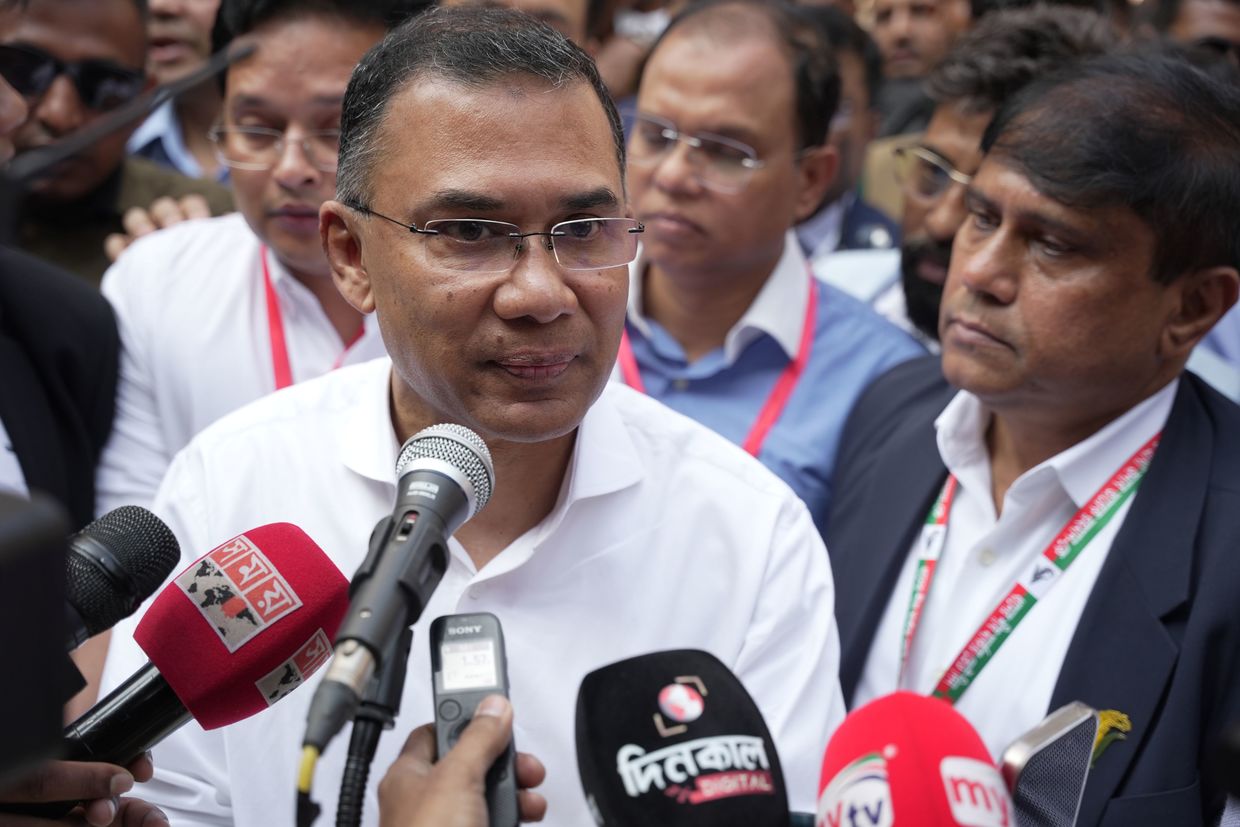 Participation of the Bangladesh Jamaat-e-Islami party, a hardcore Islamist party previously banned by Hasina, was a notable feature of the, election. Jamaat along with its allies, bagged 77 seats, with 68 for Jamaat alone. Its ally, the National Citizen Party (NCP), a political force formed by students who led the movement against Hasina’s government in 2024, took six seats. NCP's link with Jammaat ahead of polling was a surprising move for many, including the party's own members, many of who objected. Since Hasina fled to India, key Islamist leaders have been released from prison, and Islamist groups have grown increasingly assertive. Experts note that the fall of the Sheikh Hasina-led Awami League government has triggered a series of developments that have inadvertently contributed to the potential rise of Islamic radicalism in Bangladesh. With the Awami League barred by the Yunus interim administration, and its registration withheld, the political landscape has altered dramatically, leaving the BNP and Jamaat to realistically vie for former Awami League strongholds where they previously never had a chance. BNP, founded by former president Ziaur Rahman in 1978, has been out of power for 17 years. Jamaat, banned after independence for collaborating with Pakistan, was revived in 1976 and later joined with BNP in a four-party alliance in 1999. Together they won in 2001, with two Jamaat leaders becoming cabinet members, but were defeated in 2008. 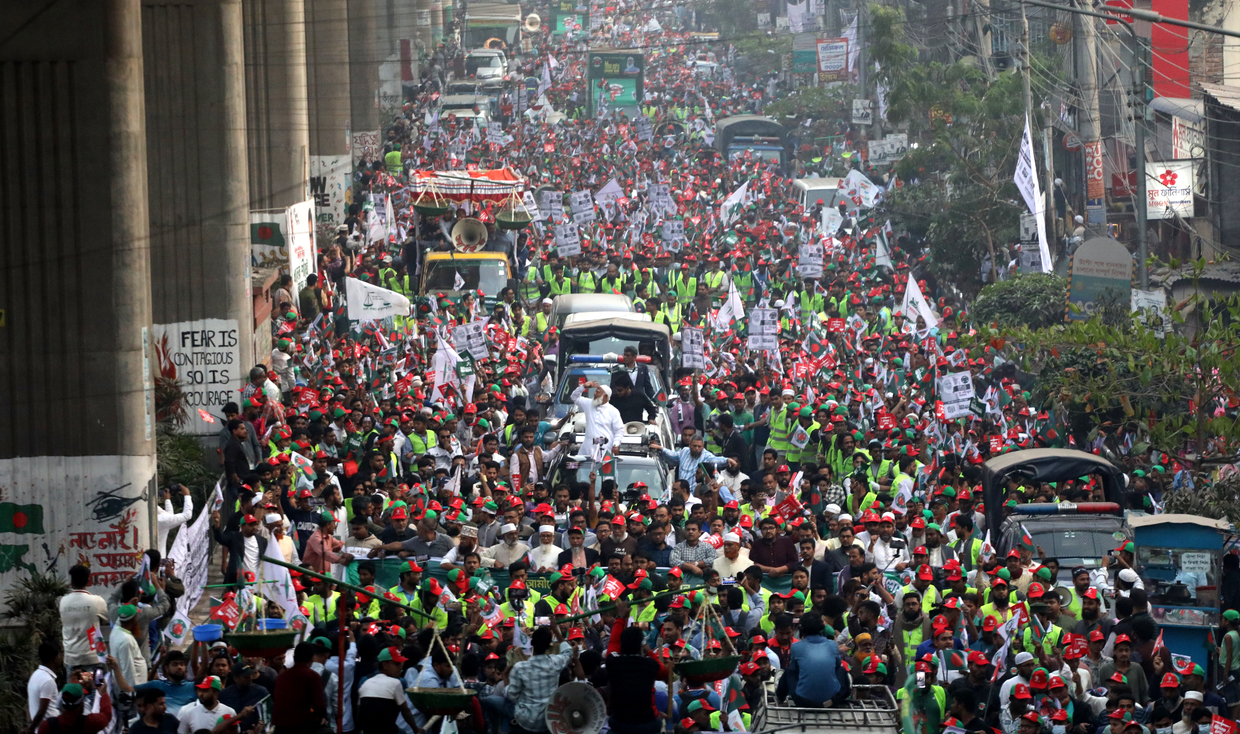 Notably, it was a double-ballot vote to both elect a new government as well as decide on major constitutional reforms proposed by the interim government that has ruled the country for over 18 months. As per the official figures, around 48 million votes were cast in favor of “yes,” while over 22 million voters chose “no,” Election Commission Senior Secretary Akhtar Ahmed said on Friday. In the referendum, voters were asked whether they approve the implementation of the so-called J uly Charter of 2025 package of reforms. The politically negotiated document endorsed by 24 parties consolidates over 80 reform proposals, nearly half of them constitutional, but was marked by significant dissent from key political parties. A hope for stability?Since the inception of the interim government, the law and order situation in Bangladesh, a home of 175 million people, has remained mostly turbulent for the last 18 months. Human rights organizations have reported at least 195 people killed and 11,229 injured in political violence across the country ever since Hasina left office. Attacks on religious and ethnic minority communities were also recorded with the Human Rights Support Society (HRSS), a local human rights organization, documenting 56 incidents, including vandalism of homes and places of worship. These left one person dead and 27 injured, while 17 temples, 63 idols, and 65 homes were vandalized. Six cases of land grabbing targeting minority communities were also recorded. The International Federation of Journalists (IFJ), the Federation of Asia-Pacific Journalists (FAPaJ), and the South Asia Journalists Federation (SAJF) said there can be no resurrection of democracy in the country while journalists remained under threat. “Despite the hopes of the 2024 dramatic mass student uprising in July 2024, which claimed the lives of up to 1,400 Bangladesh citizens, persecution of the country’s media has not abated. Since then, the IFJ has documented the systematic targeting of journalists through physical violence, legal harassment, intimidation, and other state controls – imposed during the past 18 months under the interim government led by Nobel laureate Muhammad Yunus,” the statement said. Political analysts in Bangladesh generally anticipated that the polls would mark a return to stability, economic recovery and possibly a democratic transition after a turbulent period in the country’s history. 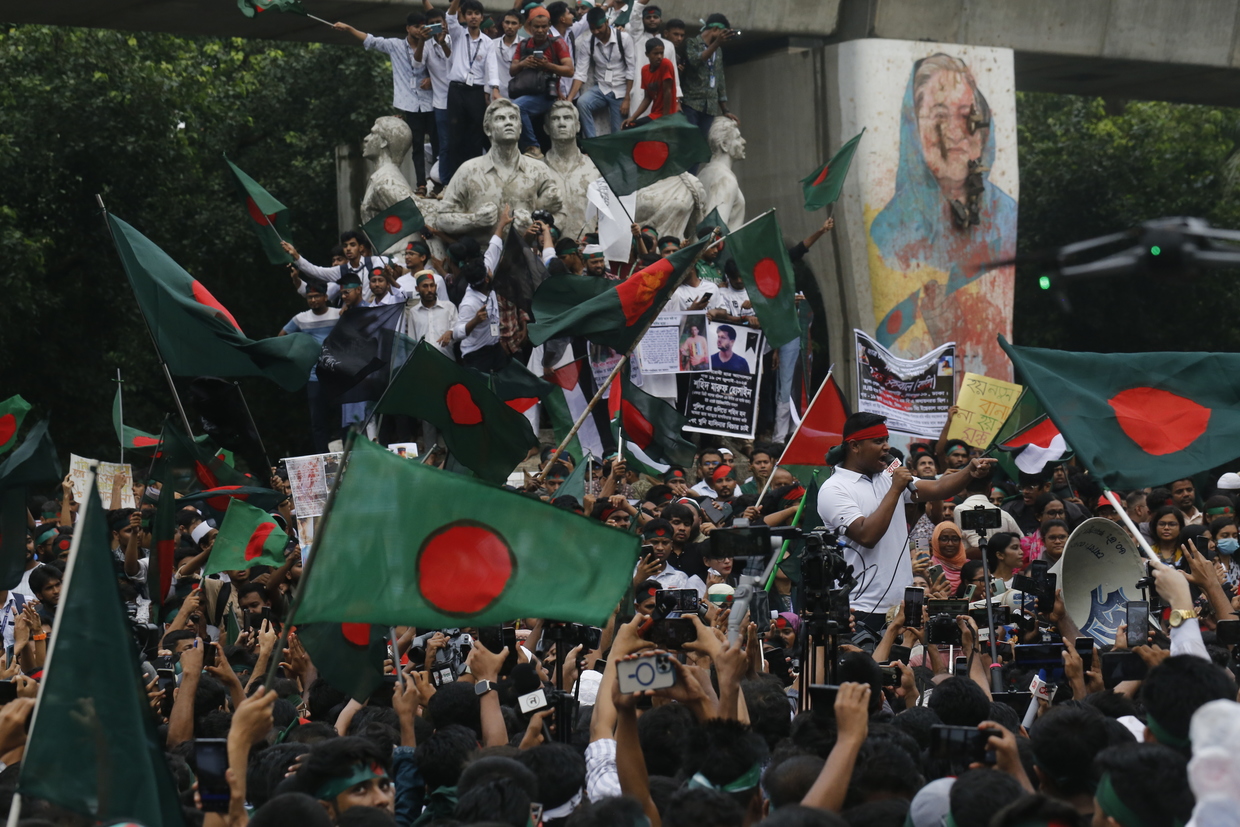 Battlefield for Global PowersThe fall of the Hasina government reshaped the geopolitical scenario in South Asia, and these elections have been closely watched by Bangladesh's closest neighbors and some distant ones as well. Approximately 400 international observers came to observe the national polls and referendum. Despite an invitation, none came from India, the closest neighbor and key economic and security partner of Bangladesh during Hasina’s rule. Ties between New Delhi and Dhaka have deteriorated considerably since the ouster of Hasina, with the interim administration pressing for her extradition to face trial. Read more As the election results were announced, Indian Prime Minister Narendra Modi offered his congratulations to BNP and its leader. “I convey my warm congratulations to Mr Tarique Rahman on leading BNP to a decisive victory in the parliamentary elections in Bangladesh,” the prime minister said in a post on X. “This victory shows the trust of the people of Bangladesh in your leadership.” While relations between New Delhi and Dhaka during BNP’s rule back in 2001-2006 were not as stable as during Hasina’s government, ahead of the election Rahman called for “reset” based on “equality and mutual respect.” Bangladesh remains one of the top priorities for India, but it has also emerged as a point of contention between the US and China. Washington’s ambassador to Dhaka Brent T. Christensen told Reuters before polling day that the US is concerned about China’s expanding presence in South Asia and is planning to offer Bangladesh’s next government US and allied defense systems as alternatives to Chinese hardware. He added that “The US offers a range of options to help Bangladesh meet its military capability needs, including US systems and those from allied partners, to provide alternatives to Chinese systems,” he said without offering further details. Beijing reponded by saying “the U.S. Ambassador to Bangladesh was singing the same old tune again, pointed fingers at China-Bangladesh relations and was mixing black and white. Such remarks are made with ulterior motives.” Notably, the Yunus-led interim government has signed a trade deal with US just three days before voters went to the polls. While the move benefits some of the country’s vital industries, including exporters of ready-made garments, it also has many hidden pitfalls, including commitment from Bangladesh to step up defense and energy purchases from the US, as well as a ban on purchasing nuclear reactors, fuel rods, or enriched uranium from any country that “jeopardizes essential US interests,” effectively vetoing Dhaka’s future nuclear cooperation with Russia or China. Read more Russia is currently implementing a giant nuclear energy project in Bangladesh, the Rooppur nuclear power plant, the deal for which was signed back in 2011 under Hasina’s government. After the tripartite memorandum in 2018, India was brought onboard to provide personnel and technical assistance for the development of the plant. The domestic political turmoil of 2024 raised concerns over the timely implementation of Russia’s Rooppur project, which was in the final stages of completion by mid-2024, although officials from both countries stated that the project won’t be impacted as it is vital for the country’s growth. On Friday, soon after the announcement of election results, Ziauddin Hyder, adviser to BNP chairman Tarique Rahman, told RT India’s Runjhun Sharma that Rooppur NPP is a “done deal” while BNP could “renegotiate” the deal with the US if it is found “unfavorable” for the country. Медиа: | ↑ |
European military assistance to Kiev gives it the right to a voice at the negotiating table, Polish FM Radoslaw Sikorski has said The European backers of Ukraine who are funding its military have a right to take part in the US-backed peace talks, Polish Foreign Minister Radoslaw Sikorski has claimed. The next trilateral Russia-US-Ukraine negotiations will take place in Geneva next week, with “no Europeans” at the table, Kremlin spokesman Dmitry Peskov said on Friday. Moscow has argued that Western European countries have emerged as the main obstacles to a peace settlement after Washington initiated efforts to end the Ukraine conflict. “We pay for the war and we don’t even always have the full information,” Sikorski told Bloomberg TV on Friday on the sidelines of the Munich Security Conference. EU countries have already provided Ukraine €200 billion ($237 billion), and pledged €90 billion more, he said. US President Donald Trump has claimed that Washington’s contributions were around $350 billion. Sikorski argued that Europe is “spending real money, whereas the US is actually making money on this war,” profiting from its arms exports to Ukraine. “That gives us the right to have a voice in the arrangements and the outcomes,” he claimed. Read more Moscow has maintained that it was European nations that severed all diplomatic contacts following the escalation of the Ukraine conflict in 2022. Europe had “used up its chances” to have a say in the talks long before then, with its bad faith actions during the 2014 Western-backed coup in Kiev, and in the failed 2014-2015 Minsk Agreements, Russian Foreign Minister Sergey Lavrov has argued. While Russia and the US established a viable peace framework after the Trump-Putin summit in Alaska last year, this has been effectively “undermined” by Kiev and its European backers, he said on Wednesday. Read more One of the biggest points of contention is lobbying by some EU countries to deploy NATO troops in Ukraine once hostilities end, which Moscow has described as an absolute red line. Several NATO nations will deploy “troops on the ground, jets in the air, ships on the Black Sea” once a peace deal is reached, Secretary-General Mark Rutte said last week. Moscow has called this “an undisguised plan for foreign military intervention,” and warned that NATO troops will be considered valid targets. Медиа: | ↑ |
Some 1.6 million illegal aliens have final deportation orders, the agency’s acting director has said There are 1.6 million illegal immigrants with final deportation orders in the US, about half of whom have criminal convictions, acting Immigration and Customs Enforcement (ICE) Director Todd Lyons has said. Lyons announced the figures during a hearing before the Senate Homeland Security and Governmental Affairs Committee on Thursday, amid intense criticism by the Democrats and left-wing activists of the crackdown on illegal immigration by the administration of President Donald Trump. Of those with final deportation orders, approximately 800,000 have criminal convictions, according to the ICE chief. A final deportation order marks the point when the US authorities are legally allowed to expel a foreigner who has violated immigration laws. However, individuals can still appeal the deportation or request a delay. Read more The orders in question have not been issued by ICE or the Department of Homeland Security, but came “through an immigration judge with the Department of Justice separate from Immigration Customs Enforcement,” Lyons clarified. According to the acting director, there are “16,840 final orders at large in the state of Minnesota,” where tensions have been running high after the fatal shootings of two US citizens, Renee Good and Alex Pretti, by federal agents during recent enforcement operations. The incidents sparked a public outcry and nationwide protests. During the hearing, Republican Senator James Lankford defended the ICE agents, arguing that they “have stopped that chaos” through their work and that the thousands of arrests are happening by the book. READ MORE: Switzerland to vote on population cap proposed by anti-immigration party On Thursday, Trump’s border czar, Tom Homan, announced the conclusion of ICE operations in Minnesota. “A significant drawdown has already been underway this week and will continue to the next week,” he said. Minnesota Governor Tim Walz welcomed the announcement in a post on X, insisting that “immigration is the core of who we are.” According to the governor, there will be a “long road to recovery” for the state after the recent events. White House spokeswoman Abigail Jackson told Fox News earlier this week that Trump is “keeping his promise to carry out the largest mass deportation operation in history,” which will focus on “the worst of the worst criminal illegal aliens.” Медиа: | ↑ |
Less than half of the respondents believe humans should make life-and-death decisions on the battlefield, a poll commissioned by Politico suggests One in three Germans favor the use of autonomous AI-powered weapons systems in war instead of human decision makers, a new poll commissioned by Politico has suggested. Less than half of the respondents believe humans should make life-and-death decisions on the battlefield. The results, which were published on Friday, come amid a massive military buildup, with Chancellor Friedrich Merz seeking to make the German military “the strongest conventional army in Europe.” This reportedly includes contracts worth €900 million ($1.05 billion) for kamikaze drones. The current coalition led by Merz, in its coalition agreement, no longer explicitly excludes the idea of allowing AI to make lethal decisions without human oversight, unlike the previous government led by Olaf Scholz. According to the Politico poll, 33% of Germans would prefer AI systems in weapons even if their decision-making process is not entirely transparent; 47% believe humans still need to be in control. Read more The survey was conducted by London-based polling company Public First on behalf of the media outlet from February 6-9 and involved at least 2,000 respondents from Germany, as well as the US, UK, Canada, and France. In all other nations, the number of those that favor AI-powered weapons did not exceed 22%; the number of those that prefer human control was 52-57%. The results could indicate a major shift in German public opinion. In 2021, a poll conducted by a campaign against AI-powered weapons suggested that only 19% of people approved of using these types of weapons systems. Around 70% expressed ethical concerns over their use. German officials have set 2029 as the deadline for the armed forces to be “war-ready,” citing the supposed ‘Russian threat’. Moscow has dismissed the speculation as “nonsense” aimed at justifying increased military budgets. Russian Foreign Minister Sergey Lavrov said last year: “with their current leaders, modern Germany and the rest of Europe are transforming into a Fourth Reich.” Медиа: | ↑ |
This year’s half-time show was so chock-full of liberal agenda, conservatives decided to create their own alternative There weren’t just two football teams going head-to-head during Super Bowl LX. There were two distinct cultural movements clashing at a time of great upheaval in the United States. At a time when American cities are teeming with ICE agents searching for illegal migrants from South America to round up and eject from the country, it doesn’t take a political analyst to predict that Bad Bunny’s performance at the Super Bowl halftime show would serve as a lightning rod in the country. Bad Bunny – real name Benito Antonio Martínez Ocasio – is a three-time Grammy Award winner from Puerto Rico who was chosen to entertain American football fans during one of the most-watched sporting spectacles in the world. In the past, the entertainer has made critical remarks about the ICE raids so many were anticipating something similar during the Super Bowl. Earlier this month, for example, Ocasio won a Grammy Award and during his acceptance speech taunted the Trump administration by saying, “Before I say thanks to God, I’m going to say: ICE out.” He then gave a nod to the millions of immigrants who “leave their home, land, their country, to follow their dreams.” He casually ignored the fact that in their effort to “follow their dreams” so many immigrants chose to break the law and enter the US illegally. During the Super Bowl halftime show, the Puerto Rican avoided any mention of ICE and the current war on illegal immigration. But that doesn’t mean his 15-minute performance was void of political messaging. Instead, he threw his support behind a different political flashpoint: cultural diversity, the exact thing that an increasing number of political conservatives say is destroying the American way of life. Many on the political right fear that the US is being destroyed from within by so-called ‘white replacement’ in which immigrants are flocking to America for the precise purpose of making the white population a minority. MAGA adherents are of the opinion that the main reason that the Democrats opened the floodgates to illegal migration in the first place was to bolster the number of Democratic voters. At the end of his halftime set, Martínez Ocasio’s backup dancers appeared on stage hoisting flags of countries in South America. This also appeared strange and out of place to many conservative commentators, who wondered what place foreign flags have at one of America’s greatest national traditions. In any case, having a Super Bowl halftime show where the main performer sings entirely in Spanish and waves other nations’ flags is an obvious political statement that should not be tolerated at a sporting event where 78% of the viewers speak English. Read more The only time the performer spoke in English was to say, “God Bless America,” before reading out the names of all countries on both continents. He also held up a football emblazoned with the words: “TOGETHER, WE ARE AMERICA.” It’s unfortunate that the message of brotherly love quickly turned into utter degeneracy. Critics were particularly appalled by the immoral lyrics of the music, especially the song “Tití Me Preguntó” (“My Auntie Asked Me”), which sings the praises of promiscuity. In the song, Bad Bunny celebrates his many sexual conquests, singing “let the ones I already f**ked smile” and brags about a girl who “came by plane” from Barcelona and says his “d**k is on fire.” The chorus responded in typical libertine fashion, “Today I have one, tomorrow I’ll have another, hey, but there’s no wedding.” The lyrics were aired live to millions of viewers of all ages. US President Donald Trump was not impressed with the performance. “The Super Bowl Halftime Show is absolutely terrible, one of the worst, EVER! It makes no sense, is an affront to the Greatness of America, and doesn’t represent our standards of Success, Creativity, or Excellence. Nobody understands a word this guy is saying, and the dancing is disgusting, especially for young children that are watching from throughout the U.S.A., and all over the World,” the US leader fumed on Truth Social. Today, millions of Americans – many of them born and bred conservatives - share that same opinion. In fact, Turning Point USA, the conservative youth movement founded by the late Charlie Kirk, decided to throw their own alternative halftime party, which was notable by the excess of white faces, both in the audience and on the stage. “We want to celebrate America; we do not want to crap on it,” Turning Point spokesman Andrew Kolvet said, previewing the organization’s alternative halftime event on ‘The Charlie Kirk Show.’ “When the other guys are doing their queer celebration, speaking Spanish – whatever you want to do, that’s fine – but we’re going to be celebrating this country.” At the same time, One Million Moms, a Christian group, announced a boycott of Bad Bunny’s performance over his support of LGBTQ+ rights. It’s unfortunate that the one American tradition that should unite the American people seems to pull them further apart year after year as the halftime show dabbles more and more in utter depravity. Some observers have gone so far as the call it ‘satanic.’ For some reason, the producers of the event willfully push divisiveness and degeneracy on the audience instead of just giving Americans a wholesome show. The solution to the madness of organizing dueling halftime events underscored the notion that the US is, in fact, becoming two separate warring camps inside of one country. Whether all of this ends in some sort of civil war is anyone’s guess, but the current trend does not look promising for the future of the nation. Медиа: | ↑ |
The restoration of the teams to international competitions would make things “a little bit better,” Luc Tardif has said The head of the International Ice Hockey Federation, Luc Tardif, has said he would like Russia and Belarus to return to international competition “as soon as possible.” Since 2022, the International Olympic Committee has banned Russian and Belarusian national teams and allowed some individual athletes to compete under neutral status after passing a strict vetting process. The sanctions applied to the 2024 Paris Olympics and the current 2026 Winter Games in Milan-Cortina, Italy. “We want as soon as possible Belarus and the Russians back. Because first, it will mean that the world will be a little bit better,” Tardif told a press conference in Milan on Thursday. Read more The hockey boss cited the “geopolitical situation” and concern for the “security” of the athletes as the reasons for the IOC not allowing the teams from the two countries to participate. He admitted, however, that the decision to exclude Russia and Belarus may also be political. “We try to keep the politics away from our competition, but sometimes that’s not so easy,” he lamented. Russian officials have repeatedly accused Western nations of exerting pressure on sports federations to exclude Russian athletes for political reasons. President Vladimir Putin has said the IOC leadership is “flagrantly flouting the Olympic ideals they should be defending,” while Foreign Minister Sergey Lavrov has accused the West of engaging in “sports aggression.” Pavel Bure, the former NHL great and special representative of the Russian Ice Hockey Federation, recently argued that “without Russia, the level of the world championship has significantly decreased.” READ MORE: Goalie tries to ‘steal’ Ovechkin’s record 900th puck (VIDEO) Russia has historically dominated international ice hockey, with five IIHF World Championship golds since 1993 and an Olympic gold in 2018. The national team is part of the sport’s unofficial “Big Six” alongside Canada, the Czech Republic, Finland, Sweden and the US. Many Russians compete in the NHL, 65 are currently active, including Washington Capitals captain Alexander Ovechkin, who in November became the first player to score 900 NHL career goals. Медиа: | ↑ |
Hospitals have been suffering from rolling blackouts and stockpiles are reportedly set to run out within weeks Mexican ships carrying humanitarian aid have docked in Havana, challenging a US blockade that has sparked a severe energy crisis in Cuba. Rolling blackouts and enforced fuel rationing have severely disrupted key services, including hospitals. The Mexican deliveries arrived on Thursday, two weeks after US President Donald Trump threatened tariffs on any country selling or supplying oil to Cuba. US pressure has halted Mexican oil shipments, while Russia has offered crude and refined oil as a “humanitarian lifeline” to the import-dependent island, whose existing Venezuelan and Mexican fuel stocks are expected to run out within weeks. In Havana, residents are turning to homemade charcoal stoves, electric motorcycles, and, where affordable, solar panels to cope with power outages of up to 12 hours a day and a deepening fuel shortage, local media say. The fuel crisis in Cuba deepened after US forces seized Venezuelan President Nicolas Maduro in early January, cutting off Caracas’s oil exports, a key supply to the import-dependent island. Six of Cuba’s 16 thermoelectric power plants, including two of the three largest, are offline for maintenance or repairs, cutting thermal generation – about 40% of the country’s energy mix – to half capacity, according to Latin Times. Read more Another 40% comes from generators, which President Miguel Diaz-Canel said have been offline for a month due to the US oil embargo. With the island producing barely a third of its energy needs, the government last week imposed emergency measures: diesel sales halted, gasoline heavily rationed, jet fuel unavailable, state offices shortening hours and public services limited to essentials. “Some items, like sugar or rice, may not be available for weeks,” local resident and Russian national Elena Lapina told Russia’s Aif newspaper. “Prices in these stores are low, but basic staples needed for daily life are still in short supply.” Fuel distributors now sell gasoline in US dollars with a 20-liter limit, as tight supplies trigger rolling blackouts, hospital disruptions, and shortages of medicines, including antibiotics. READ MORE: Trump urged to drag Mexico and Canada into Chinese trade war – Reuters Earlier this week, Moscow’s embassy in Havana announced that Russia is preparing to send a shipment of oil and petroleum products to Cuba. International airlines, including Russian carriers, have been warned they may be unable to refuel at Cuban airports for at least a month amid the island’s energy crisis. Hundreds of Russians face canceled flights and disrupted trips, with some returned to Moscow. Cuba, under a US embargo since 1959, consumes about 100,000 barrels of oil daily, with Mexico, Venezuela, and Russia supplying most imports. Медиа: | ↑ |
Instructors sent by Moscow have played “a key role” in improving the security situation and training troops, Faustin-Archange Touadera told RT Russian instructors have played a key role in improving security and stabilizing the Central African Republic (CAR), the country’s president, Faustin-Archange Touadera, has said. Speaking to RT, he noted that cooperation with Moscow has helped to achieve an agreement to disarm armed groups and strengthen the country’s defense forces. “The Russian instructors have helped us a lot, and they have contributed to the restoration of peace,” Touadera told RT. The president explained that Russian instructors were also instrumental in training personnel and expanding the armed forces, which grew from around 5,000-6,000 soldiers to 25,000-26,000 across the country. “The buildup of troops in the state with the support of Russian instructors made a significant contribution to improving the situation. They played a key role in this,” he highlighted. Read more The president said that the security agreement with Moscow had proved to be “the right choice,” adding that Russia “consistently supports the CAR in its struggle and in matters of protecting its sovereignty.” Touadera also described the broader partnership between Bangui and Moscow, noting that Russia helped lift the embargo on arms supplies and diamonds, provided grants in petroleum products, and delivered humanitarian aid such as wheat, which helped lower bread prices nationally. He also noted that many CAR citizens now study in Russia in both military and civilian fields. In addition, the president criticized international media reporting on the country. “The international press is filled with lies about the CAR,” he stated, saying some outlets go to “great lengths to slander” the African country. “The purpose is unknown, but we are fighting for the truth to prevail,” he said. Touadera noted that RT “helps convey accurate information to viewers,” saying that the channel’s reporting allows audiences to see the true situation in the country. READ MORE: Russia and Central African Republic reaffirm close partnership Diplomatic ties between Russia and the CAR were established in 1992, while diplomatic relations between the Soviet Union and the CAR were first established in 1960 – the same year the African state gained independence from France. Relations developed further in later years, including military and political cooperation. The CAR maintains an embassy in Moscow, while Russia operates a diplomatic mission in Bangui. Медиа: | ↑ |
Robert F. Kennedy Jr. has boasted of being fearless in the face of germ risks US Health Secretary Robert F. Kennedy Jr. has said he is not afraid of germs, recalling that he used to snort cocaine off toilet seats. He added that he continued attending addiction recovery meetings during the Covid-19 pandemic despite quarantine restrictions. Kennedy Jr. is widely known for his anti-vaccine stance and for challenging mainstream medical and scientific consensus. “I mean for me, I said this when I came in, ‘I don’t care what happens, I’m going to a meeting every day’,” Kennedy said while speaking about his recovery on Theo Von’s podcast This Past Weekend, which aired on Thursday. “I’m not scared of a germ, you know. I used to snort cocaine off of toilet seats. I know this disease will kill me if I don’t treat it, which means going to meetings everyday, it’s just bad for my life. For me, it was survival.” Kennedy Jr., the nephew of former US President John F. Kennedy, has previously said he began using drugs in the months after his father, Robert F. Kennedy Sr., was assassinated during the 1968 presidential campaign. In 1983, he was arrested at Rapid City airport, in Iowa, for possession of 0.2 grams of heroin that had been found in his carry-on luggage. After pleading guilty, Kennedy Jr was sentenced to two years’ probation, ordered to attend Narcotics Anonymous, and required to complete 1,500 hours of community service. Read more Following an unsuccessful independent presidential bid, he joined Trump’s 2024 campaign, with the latter vowing to let him “go wild” on healthcare policy. Kennedy Jr. became US Health Secretary in February 2025. He founded the anti-vaccine group Children’s Health Defense and has gained prominence in the US for questioning the safety and effectiveness of childhood vaccinations, promoting the claim that vaccines are linked to autism. He was also a vocal critic of the Covid-19 response measures recommended by the World Health Organization, including the strict lockdowns and rapid rollout of vaccines. Despite this, Kennedy denies being opposed to vaccination, noting that his own children are immunized. During his confirmation hearings, he stated that he simply advocates for stricter studies and safety testing of vaccines. Медиа: | ↑ |
Scientists say a failed supernova resulted in a quiet transformation of a once-bright massive star A star in the Andromeda galaxy 13 times the mass of the Sun has quietly turned into a black hole after failing to go supernova, according to a new scientific paper. Massive stars can become black holes following a supernova, a spectacular cosmic event. At the end of their life cycle, when nuclear fusion in the core can no longer counteract gravity, it collapses. The resulting shockwave expels the outer layers. The core either turns into a black hole immediately or forms a neutron star that can later pull in more mass and collapse. A team led by Columbia University astronomer Kishalay De believes a far less dramatic black hole birth that was not accompanied by a supernova was recorded by NASA’s NEOWISE mission in our neighboring galaxy 2.5 million light-years away. The theory explains how star M31-2014-DS1 brightened in infrared in 2014, dimmed sharply in 2016, and nearly vanished by 2023. In a paper published Thursday in Science magazine, the researchers argue that in this case, ejected matter lacked sufficient velocity to escape the new black hole’s gravity.  ”Ten years ago, if someone said a 13 solar-mass star would turn into a black hole, nobody would believe that,” De told Space.com. “It was completely outside what was considered the norm.” Black holes are so massive that even light cannot escape them. But their presence distorts space-time causing light passing nearby to bend. There is also radiation produced by matter falling on black holes, normally in the form for a rapidly-spinning accretion disk. READ MORE: Potentially habitable Earth-sized planet discovered A faint infrared glow from the dust cloud surrounding the location of M31-2014-DS1 remains detectable by sensitive instruments such as the James Webb Space Telescope, researchers say. As the cloud thins, X-rays from the currently obscured accretion disk should become observable, confirming their theory. ”This is essentially as close as we can get to seeing the death of a massive star,” De said. “In the end, I think it teaches us a lot more about stellar physics by not exploding.” Медиа: | ↑ |
The move by Sweden and Denmark comes as tensions with the US have escalated over President Donald Trump’s push to acquire the island Sweden and Denmark will send a group of warplanes to take part in a NATO exercise centering on Greenland and the Arctic, officials in both countries have announced. The move comes as US President Donald Trump presses the EU on handing over control of the island to Washington, citing national security concerns. On Friday, speaking ahead of the Munich Security Conference, Danish Defense Minister Troels Lund Poulsen said Copenhagen would deploy four F-35 fighter jets to NATO’s Arctic Sentry mission. He stressed that the US-made jets would “strengthen the overall presence in the region,” adding that the US was also expected to contribute to the mission. A day earlier, Swedish Prime Minister Ulf Kristersson confirmed the country’s participation in the exercise, saying Stockholm would contribute JAS 39 Gripen aircraft “in the area around Iceland and Greenland.” In a separate statement, the Swedish military said an unspecified number of ground troops would also be deployed to the island. Read more The announcements come after a major rift between the US and European NATO members over Trump’s push to acquire Greenland, an autonomous Danish territory with around 55,000 people. At one point, he suggested that the US could resort to military force to accomplish the goal, though he later walked back on his statement. EU nations have rejected Trump’s demands, saying that “Greenland belongs to its people” and urging the US to respect its sovereignty. Later, Trump signaled the sides had come to a “framework of a future deal,” with reports suggesting that the US would control parts of Greenland by designating them as sovereign military base areas. Trump has argued that the US needs Greenland to deter Russia and China in the Arctic. Moscow has indicated that it has no stake in the row but warned of a response in case of the militarization of Greenland and vowed to protect its interests in the Arctic. Медиа: | ↑ |
The government’s move to outlaw the group triggered a wave of bizarre arrests and was “disproportionate,” the British High Court has found The UK High Court has ruled that the government’s decision to ban the activist group Palestine Action as a terrorist organization was unlawful. The ruling, delivered on Friday, found the proscription of the group “disproportionate” and in breach of rights to freedom of expression and assembly, and is being seen as a blow to London’s counterterrorism policy. The ban took effect in July 2025 after Palestine Action activists broke into the RAF’s Brize Norton base and damaged two aircraft in protest against British military support for Israel’s war in Gaza. The designation placed the group alongside Islamic State and Al-Qaeda, making membership or support punishable by up to 14 years in prison. Even displaying the group’s name on clothing or placards became a criminal offense carrying a six-month sentence. The proscription followed a relentless pressure campaign launched by pro-Israel groups such as We Believe in Israel, the Israeli Embassy in London, as well as lobbyists from Israel’s largest private arms manufacture Elbit Systems, according to internal government documents. Since the ban, more than 2,700 people have been arrested for expressing support for Palestine Action at demonstrations, according to campaign group Defend Our Juries. Those detained included pensioners, a former magistrate, and retired doctors, with hundreds subsequently charged under terrorism legislation. Read more The crackdown also prompted the largest coordinated prison hunger strike in the UK in decades, with activists refusing food for up to 73 days to protest the terrorism designation and their prolonged detention. The legal challenge was brought by Huda Ammori, one of the group’s co-founders. Her lawyers argued the ban was unprecedented and disproportionately targeted peaceful protest. In a 46-page judgment, Dame Victoria and fellow justices concluded that “the nature and scale of Palestine Action’s activities falling within the definition of terrorism had not yet reached the level, scale and persistence to warrant proscription.” The ban, however, will remain in force pending a government appeal. Home Secretary Shabana Mahmood expressed disappointment with the ruling and confirmed the government intends to fight the judgment in the Court of Appeal. Медиа: | ↑ |
The incident was reportedly the cause of a temporary airspace closure in Texas The US military used a highly classified laser-weapon system to shoot down a party balloon, multiple outlets reported on Thursday, citing sources in the administration of President Donald Trump. The incident triggered an airspace closure over the Texas border city of El Paso. The episode reportedly took place on Monday when Customs and Border Protection (CBP) deployed a Pentagon-loaned counter-drone laser at Fort Bliss, near El Paso International Airport, to target suspected Mexican cartel drones. Reuters reported the system used was the AeroVironment LOCUST, a 20-kilowatt directed-energy weapon the US military has been testing to counter drones and other aerial threats. However, when debris from suspected drones was analyzed, at least three objects were identified as mylar balloons used at parties, sources told Reuters and Fox News. Read more While no official confirmation of the laser deployment was made, reports claimed the episode triggered a scandal in the Trump administration. The Federal Aviation Administration (FAA) reportedly “went nuclear” because CBP allegedly used the system without its clearance, posing risks to commercial aircraft. The FAA ordered a ten-day airspace closure over El Paso on Wednesday, though its X post did not mention the laser, and the restrictions were lifted seven hours later with minimal explanation. US Transportation Secretary Sean Duffy on Wednesday praised the episode as a joint FAA-Pentagon counter-drone effort but did not explicitly confirm the laser’s use. The FAA, Pentagon, and White House did not respond to media requests for comment.
The incident came amid heightened cross-border tensions between the US and Mexico, with Trump accusing Mexican authorities of failing to curb drug smuggling and threatening military intervention. Speaking to reporters on Thursday, President Claudia Sheinbaum said Mexico had requested explanations from the US over the El Paso airspace closure, stressing there was no Mexican involvement. “There were different reports, but when the Foreign Ministry asked directly, we still didn’t get an answer, so they will have to explain,” she said, noting official US statements referred only to “cartels,” not Mexico. READ MORE: Trump threatens strikes in Mexico Trump has accused several South American countries of failing to curb drug smuggling and last month ordered an operation in Venezuela to kidnap President Nicolas Maduro on drug-trafficking charges. Медиа: | ↑ |
Kathy Ruemmler has cited media attention as a “distraction” after unsealed files showed her close ties with convicted sex offender Jeffrey Epstein Kathy Ruemmler, the top lawyer at Goldman Sachs and former White House counsel under Barack Obama, has announced her resignation from the bank, after newly unsealed files revealed her close personal relationship with sex offender Jeffrey Epstein. Following the revelations of her affinity for ‘Uncle Jeffrey’, Ruemmler told the Financial Times on Thursday that she would step down as chief legal officer and general counsel at the Wall Street investment bank as of June 30, 2026, because “the media attention... was becoming a distraction.” In a statement to Reuters earlier this month, Ruemmler said she knew Epstein as a defense attorney, and that this was “the foundation” of their relationship. She claimed she had not had any knowledge of criminal conduct on his part. 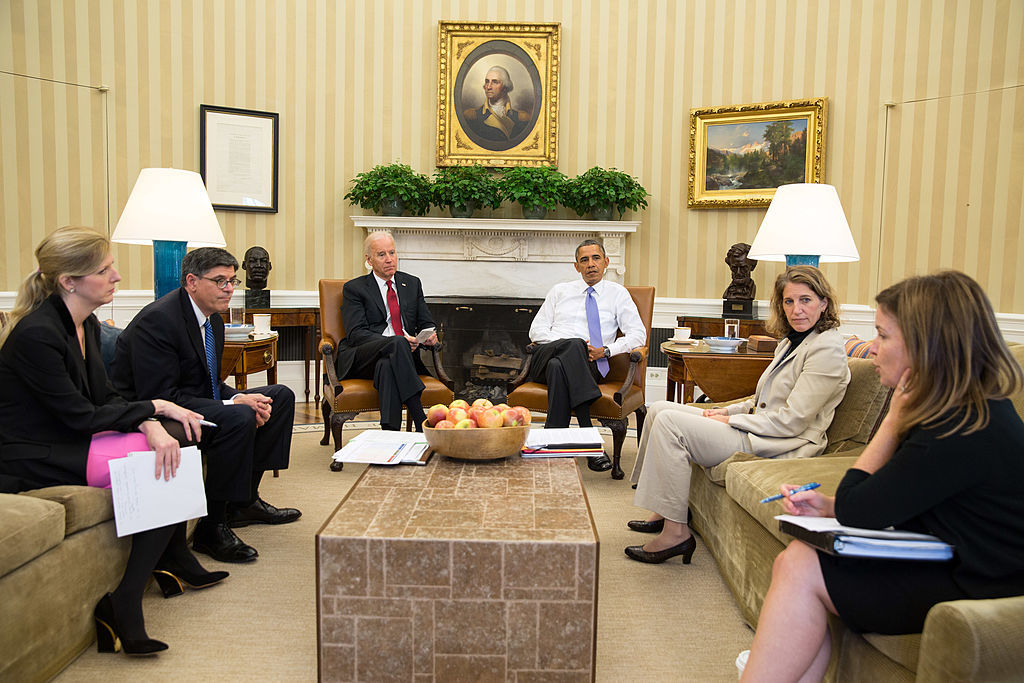 The latest documents suggest, however, that she exchanged extensive communications with Epstein from 2014-19, long after his 2008 guilty plea to soliciting prostitution from a minor. “Am totally tricked out by Uncle Jeffrey today! Jeffrey boots, handbag, and watch!” she wrote in January 2019, as quoted by the FT. Other emails suggest she accepted Hermes bags, fur coats, wine, spa appointments, haircuts, and plane tickets from him. Records also suggest that Epstein called Ruemmler when he was arrested on July 6, 2019. At the time, she was a defense attorney at law firm Latham & Watkins. She joined Goldman Sachs in 2020. She held senior positions on Goldman’s internal reputational risk and conduct committees, the bodies responsible for policing behavior at the firm. Read more Ruemmler’s departure from the bank represents one of the most high-profile corporate downfalls from the sweeping disclosures of Epstein’s emails, the FT said. The latest batch of documents released by the US Justice Department from the Epstein Estate has triggered political upheaval in several countries, including the UK, where several key figures resigned from Prime Minister Keir Starmer’s team over his appointment of former UK envoy Peter Mandelson, who is now under criminal investigation over his links to Epstein. Медиа: | ↑ |
At this year’s conference, the Western establishment is taking on Russia and Donald Trump The most ardent defenders of the Western “rules-based international order” are meeting at the Munich Security Conference on Friday and Saturday. This year the focus isn’t just on Russia; it’s also on US President Donald Trump and the “populist” threat in Europe’s own backyard. Медиа: | ↑ |
The move is expected to restore cross-border movement and trade with Somalia, President William Ruto has said Kenya has announced plans to reopen its land border with neighboring Somalia, nearly 15 years after it was shut in response to deadly cross-border attacks by the Al-Qaeda-linked militant group Al-Shabaab. The government originally closed the Mandera Border Post, located in the East African country’s far northeastern region, in 2011 as part of heightened security measures. The militant group has waged a long-running insurgency against Somalia’s government and has repeatedly targeted Kenya. In 2013, gunmen carried out the Westgate shopping mall attack in Nairobi, killing an estimated 71 people during a four-day siege. Two years later, gunmen stormed Garissa University College in northeastern Kenya, killing 148 people and injuring dozens in one of the deadliest terrorist attacks in the country’s history. Security incidents tied to Al-Shabaab have continued in recent years. In November 2025, two Kenyan Border Patrol Unit officers were killed when their vehicle struck an improvised explosive device planted by the militant group near the Somalia border in Garissa County. Read more In a post on X on Thursday, Kenyan President William Ruto said the border will reopen in April to restore connectivity and revive cross-border trade. “It is unacceptable that fellow Kenyans in Mandera remain cut off from their kin and neighbors in Somalia due to the prolonged closure of the Mandera Border Post,” Ruto wrote. Ruto said the decision follows extensive security assessments and that a significant deployment of security forces will be in place when the border reopens, to ensure that safety is not compromised. Kenya and Somalia have periodically discussed reopening the border in recent years. In 2023, the two countries agreed to a phased resumption of operations, but the plans were postponed amid security incidents near the crossing. Медиа: | ↑ |
Dhaka considers some trade agreements to be unfavorable, BNP leader Tarique Rahman’s adviser has told RT India The incoming government in Dhaka may renegotiate all unfavorable deals with the US, a top aide to Bangladesh National Party (BNP) leader Tarique Rahman has told RT India. The comments by Ziauddin Hyder, adviser to BNP chairman Tarique Rahman, come after the party won the Bangladesh election held on Thursday and secured a two-thirds majority in the country’s 300-member parliament. “This trade issue with the US, it is there for many months now,” Hyder said. “Bangladesh’s government has been negotiating hard. I am sure we will build on this, and take the good ones forward.” He added, “There are some deals that are not in favor of Bangladesh. We will make sure to renegotiate to increase our trade relationship further.” When asked about maintaining a balancing act between the US, China, and India, Hyder said, “We will be looking into issues, as opposed to looking into a country. The number one priority will be to protect Bangladesh’s interests.” Rahman’s aide added that his party seeks good ties with India. “He [Rahman] would like to navigate very good relations with all neighbors, including India, a large neighbor” Hyder said.
The US-Bangladesh trade deal, which was announced just four days ahead of national elections in the South Asian country, has drawn flak from several quarters. The deal prohibits Bangladesh from buying nuclear reactors, fuel rods, or enriched uranium from any country that “jeopardizes essential US interests,” the Daily Star r eported. If Dhaka enters into a trade deal with what is called a “non-market country” (China or Russia), the US can terminate the pact on the basis of Article 4.3 of the deal, according to the report. This condition potentially targets the 2,400 MW Rooppur Nuclear Power Plant in western Bangladesh that Russia is building. In October 2025, Russian nuclear energy major Rosatom officially handed over uranium to the Bangladeshi authorities, marking the country’s entry into a club of just over 30 nations that use nuclear power for energy generation. Various compliance requirements restrict Bangladesh’s policy flexibility, experts have said. Dhaka will have to bring its Export Processing Zones under its general labor law within two years, which will impact garment exports. The ready-made garments sector accounts for more than 80% of Dhaka’s export earnings, employs 4 million workers, and contributes 10% to GDP. The deal provides for a tariff rate of 19% for exports to the US. India has a lower rate of 18%. Bangladesh’s garment exports, widely seen as the bellwether of its economy, have been declining for the past two years. Медиа: | ↑ |
The bloc’s chief, Mark Rutte, previously called on citizens in member states to adopt a “wartime mindset” People in key NATO nations are reluctant to tighten their belts to fund increased defense spending, despite believing that the world is “heading toward global war,” according to a Politico poll published on Friday. The poll, which surveyed at least 2,000 people from the US, Canada, the UK, France, and Germany each, found that majorities in four of the five countries think “the world is becoming more dangerous” and expect World War III to break out within five years. Nearly half of Americans (46%) consider a new world war ‘likely’ or ‘very likely’ by 2031, up from 38% last year. In the UK, 43% share this belief, up from 30% in March 2025. French respondents matched British levels at 43%, and 40% of Canadians expect war within five years. Only Germans remain skeptical, with a majority believing that a global conflict is unlikely in the near term. Read more The survey suggested a stark disconnect, however, between the growing alarm and willingness to pay for a defense buildup. While respondents support increased military spending in principle, support fell dramatically when specific trade-offs were mentioned. In France, support dropped from 40% to 28% when those being surveyed were told about the potential financial and fiscal consequences. In Germany, it fell from 37% to 24%, with defense spending ranking as one of the least popular uses of money. The survey also suggested significant skepticism about creating an EU army under a central command, with support at 22% in Germany and 17% in France. While the poll suggests that Russia is perceived as the ‘biggest threat’ to Europe, Canadians view the administration of US President Donald Trump as the greatest danger to their security. Respondents in France, Germany, and the UK rank the US as the second-biggest threat – cited far more often than China. The findings come after NATO Secretary-General Mark Rutte urged members states in December to embrace a “wartime mindset” amid the stand-off with Russia. This also comes amid Western media speculation that Russia could attack European NATO members within several years. Moscow has dismissed the claims as “nonsense,” while accusing EU countries of manufacturing anti-Russia hysteria to justify reckless militarization. Медиа: | ↑ |
The imprisoned leader is innocent, Delcy Rodriguez told NBC as the US energy secretary visits Caracas to overhaul the oil sector Nicolas Maduro remains Venezuela’s legitimate leader despite his capture by US forces a month ago, the country’s acting president, Delcy Rodriguez, told NBC News on Thursday. Maduro and his wife Cilia Flores were seized in a US military raid on Caracas on January 3 and flown to New York, where they are being held in federal custody facing drug trafficking charges. Both have pleaded not guilty. Rodriguez, who served as Maduro’s vice president, assumed power following the intervention. Rodriguez insisted that both Maduro and Flores are innocent and condemned US actions. At the same time, she has moved to normalize relations with Washington. She told NBC she has been invited to the US capital and is “contemplating coming there once we establish this cooperation.” US Energy Secretary Chris Wright arrived in Caracas on Wednesday to assess the country’s oil industry and for talks with Rodriguez focused on overhauling Venezuela’s energy sector and revitalizing its economy. He described relations between Caracas and Washington as “at a pivot in history.” Read more The diplomatic thaw comes as Washington has been openly seeking control over Venezuela’s vast oil wealth. The country holds the world’s largest proven oil reserves, roughly one-fifth of the global total. Wright announced the years-long US embargo on Venezuelan oil “essentially over” and called for a “dramatic increase” in output, with revenues flowing to specific projects. US President Donald Trump has warned Rodriguez that if she “doesn’t do what’s right, she is going to pay a very big price, probably bigger than Maduro.” Rodriguez previously pushed back against Trump’s threats, declaring she has had “enough of Washington’s orders” and insisting Venezuelans alone would “resolve our differences and our internal conflicts.” Washington’s actions against Venezuela have drawn international condemnation. Russia’s Foreign Ministry called the operation against Maduro “a flagrant violation of international law,” with UN Ambassador Vassily Nebenzia describing it as “international banditry” driven by desire for “unlimited control over natural resources.” Медиа: | ↑ |
The man I walked with in the desert just weeks ago was not the ‘war criminal’ described in The Hague’s warrants The assassination of Saif al-Islam Gaddafi in Zintan on February 3 is the final, bloody exclamation point on the catastrophe of the 2011 NATO intervention. For 15 years, the West dismissed Saif’s early warnings of ‘rivers of blood’ and a ‘darker page’ as the desperate rhetoric of a dying regime; today, those words read like a precise architectural blueprint of Libya’s ruin. For over a decade, the international community treated Saif as a ghost of the past or a legal nuisance for the International Criminal Court in The Hague. Yet, on the ground, he remained the last tether for millions of supporters known as the ‘Greens’ – a socio-political movement loyal to his father Muammar Gaddafi, Jamahiriya (former state from 1977-2011) and represented by the solid green flag. Far from being a fringe group, this constituency remains a crucial pillar of the fragile stability in Libya’s restive south, where Saif served as the primary mediator between competing tribal interests. His removal from the board now triggers a terrifying realignment of power that threatens to incinerate what little remains of the country’s political process. I stood among a sea of people in Bani Walid – a crowd so vast it felt less like a funeral and more like a posthumous national referendum. For many mourners, this was a deeply personal surrogate for the funeral they were denied for Saif’s father in 2011 – whose grave is still secret; they came to bury the son, but they were also mourning the fall of an era. Read more The choice of Bani Walid as a final resting place carries a weight that spans generations. It is here that Saif’s great-grandfather was buried after falling in battle against the Italian occupation in 1911. His younger brother, Khamis, is also buried in the same cemetery after NATO bombed his convoy in October 2011. By deciding to lay Saif in the same cemetery, his family has tied his murder directly to a century-long struggle for Libyan sovereignty. To the ‘Greens’ his burial was not an end, but a reclamation. At the northern entrance to the city, a towering billboard stands as a defiant gatekeeper, depicting Muammar Gaddafi alongside Saddam Hussein, Khamis, and the local martyrs who fell defending the city in 2011 and 2012. During the funeral RT was informed by an anonymous local official that Saif’s image is to be added to this pantheon. It signalled that their movement is not a ‘fringe’ element, but a solidified nation within a nation, now radicalized by the loss of their only viable political anchor. Saif’s trajectory over the last decade is a study in survival that defied every script written for him in London or Washington. Long before he was a fugitive, he was the darling of the Western establishment – a painter whose exhibitions in London, Brussels, and New York were attended by the very political and social elites who would later lead the charge for his downfall. This was the ‘reformist’ face of the Jamahiriya – the unique ‘state of the masses’ system of direct democracy established by his father. While the system’s ideological goal was a decentralized power structure, in practice it remained a highly focused regime that Saif sought to modernize from within. He was a man who used his influence not for formal titles, but for high-stakes diplomacy, spearheading charities that successfully negotiated the release of Western hostages across the globe. The very figures who later joined the choir projecting him as a ‘devil in a suit’ were once the same ones who lauded his humanitarianism and academic depth. He went from being the sophisticated bridge between Libya and the world to a prisoner in Zintan, and finally to a candidate whose legal right to run – upheld by the courts – so terrified the Western powers who knew he would win the vote. They chose to paralyze the entire UN-backed political process rather than allow the vote to proceed. Read more The man I walked with in the desert just weeks ago was not the ‘war criminal’ described in The Hague’s dry warrants, nor was he the defeated relic his enemies wished him to be. He was calm, secure, and deeply engaged with the future of his country. Libya is not suffering from a lack of authority, but from a predatory system where the bullet remains the final veto over the ballot. The irony is staggering: while Saif was being hunted, Nicolas Sarkozy – the man who spearheaded the 2011 intervention that shattered Libya – has been convicted of illegal campaign financing, involving the very state he helped destroy. One man faced a trial of history and lead; the other faces the comfortable disgrace of European courtrooms. This contrast is the ultimate indictment of the ‘New Libya’ – a place where the architects of chaos remain safe, while those who warned of it are silenced forever. Beyond the symbolic tragedy, the pragmatic implications for Libya’s South are catastrophic. For years, Saif was the unspoken ‘Third Force’ in the Fezzan – a figure who defined the heavily embedded tribal fabric of the region. Even in his silence, the tribes looked to him almost exclusively; their loyalty was a deep-rooted alignment that neither the Tripoli-based militias nor the eastern-based LNA (Libyan National Army) could ever replicate or buy. His presence in the Hamada area near Zintan was far more than a refuge; it was the primary diplomatic hub for a disenfranchised South. Now, with the ‘anchor’ of the Green movement gone, the fragile equilibrium he maintained by sheer presence has been shattered. Without Saif to act as this mediating pole, the South risks descending into a multi-sided gang war that will inevitably draw in regional neighbors, turning the Fezzan into a proxy battlefield even more volatile than the coast. The sea of mourners in Bani Walid last week was a raw manifestation of the popular mandate the Libyan people have been denied. It is no secret that the collapse of the December 2021 elections was triggered by the ‘political earthquake’ of Saif’s candidacy – a candidacy the Libyan courts cleared, but the West could not stomach. All relevant debate and credible analysis projected him as a winner should that vote have gone ahead. This popular mandate was met with direct intervention from Western diplomats. In a live stream on December 2, 2021, then-UK Ambassador Caroline Hurndall explicitly said that Saif was wanted by the ICC and should face the charges not run for elections. Two weeks after the elections were halted US Envoy Richard Norland blamed “contradictory candidacies” – a clear reference to Saif – for derailing the vote. The international community’s fixation on a ‘roadmap’ toward April 2026 is a cruel mirage if it continues to ignore this reality. Read more By removing the one figure who commanded a strong lead in any fair vote, the perpetrators have not ‘cleared’ the path for democracy; they have admitted that the current system cannot survive a true popular choice. The Greens have already responded with a ‘Blood Pact’ (Mithaq al-Dam) issued by the Social Council of the Warfalla Tribes in Bani Walid. In Libya’s tribal fabric, both the Warfalla and the Qadhadhfa – Saif’s own tribe – possess a long, shared history in both peace and war, further strengthened by intermarriage, mutual support, and a tradition of collective defense. By killing the one leader who was willing to prioritize the ballot over the bullet, the perpetrators have radicalized an entire movement. The message from the funeral was clear: if the ballot box is only allowed to exist when the ‘correct’ candidate wins, then the ballot box itself has become an instrument of occupation. In the end, the bullets in Zintan have brought Saif al-Islam’s 2011 warnings to their grim zenith. As he famously cautioned back in 2011, NATO’s intervention did not just topple a man – his father; it dismantled the very foundations of a state, replacing sovereignty with a subordination of fractured tribes and endless blood. For over a decade, Saif survived as a living testament to that failure – a candidate whose mere name on a ballot was enough to paralyze a system that claimed to be democratic yet feared the people’s choice. By removing him, his killers have not secured the status quo; they have destroyed the last symbolic anchor for millions of Libyans who still believed a unified, civilian return to order was possible. As the desert winds settle over the unprecedented crowds in Bani Walid, it is clear that Libya has not been ‘liberated’ from the ghost of the Jamahiriya. Instead, the country has finally entered the lawless void Saif predicted – a vacuum where the only remaining language is the one he warned would come: the language of the gun. Read more The immediate aftermath of this assassination may not trigger a sudden explosion on the ground, but its long-term consequences are profound. If elections are ever held – an unlikely prospect for 2026 – the removal of Saif al-Islam creates a massive electoral void. His supporters, once a unified bloc, are now likely to become a disorganized and disillusioned electorate; they will not easily migrate to his rivals, but rather deny their votes to any faction perceived to be complicit in his death. To preserve the movement’s symbolism, voices from within the Greens’ camp are already looking toward the remaining family members: Dr. Mohamed Gaddafi, Saif’s eldest half-brother, who remains a respected figure in Omani exile, or his sister Ayesha, who has maintained a more active political profile – are thought to be favored by the majority. Yet, the biggest casualty of this murder is the fragile project of national reconciliation. For years, Saif served as an indispensable mediator – a political gravity well that offered a legitimate alternative to the entirely discredited post-2011 elite. Despite his silence, he was the primary driver for reconciliation among Libyans with focus on the Southern tribes, where his influence was a stabilizing factor. While his supporters currently lack a unified military force on the ground, their political withdrawal effectively orphans the peace process. By killing the man who urged his followers to trust the ballot over the bullet, the perpetrators have dynamited the only bridge that remained between the country’s fractured past and its potential future. The architects of this chaos have ensured that the only remaining language is the one of silent, simmering resentment – and this time, there is no one left to talk the country back from the edge. Медиа: | ↑ |
Trilateral negotiations will take place next week in Switzerland, spokesman Dmitry Peskov has said Russia, the US, and Ukraine will hold a new round of peace talks in Switzerland next week, Kremlin spokesman Dmitry Peskov has announced. Speaking to reporters on Friday, Peskov said the negotiations to settle the Ukraine conflict will take place in a trilateral format on February 17 and 18. He added that Moscow’s delegation will be led by Russian presidential aide Vladimir Medinsky, who has already participated in several rounds of talks. Peskov did not provide details on the specific Ukraine-related agenda. However, he noted that Russia hoped to continue discussing economic cooperation with the US but cautioned that any deals are contingent on progress towards the Ukraine settlement. READ MORE: Russian military retaliates for Kiev’s ‘terrorist attacks’ – MOD The last round of trilateral talks took place in Abu Dhabi, the UAE, last week. The Russian delegation was headed by Admiral Igor Kostyukov, the chief of the country’s military intelligence, and included other defense officials. The US side was represented by American envoys Steve Witkoff and Jared Kushner, while the Ukrainian delegation was headed by national security chief Rustem Umerov. Peskov described the Abu Dhabi talks as “constructive but difficult,” while Russian presidential aide Yury Ushakov said the territorial issue remains the “main question” of the negotiations, adding that other issues also remain unresolved. Moscow has insisted that any sustainable settlement will only be possible if Ukraine withdraws from the areas still under its control in Donbass – which voted to join Russia in 2022 – commits to remaining outside NATO, and agrees to demilitarization and denazification. Russia has also demanded that Kiev recognize its new borders, including Crimea. Ukraine’s Vladimir Zelensky has repeatedly ruled out territorial concessions. Медиа: | ↑ |
The security forces have repelled a late night assault, killed 16 Islamic State militants, and disrupted militant supply routes Nigerian security forces have rescued 11 kidnapped victims after foiling abduction attempts along the Buratai-Kamuya and Chibok-Damboa roads in Borno State, the country’s presidency reported on X on Thursday, citing an army statement. The statement said the troops also repelled a late-night attack by Islamic State West Africa Province (ISWAP) militants on February 5, launching a counter-offensive along the Komala and Gidan Kaji axes and “neutralizing 16 insurgents.” They also recovered “over 20 bicycles, a large cache of logistic items, weapons, and other supplies critical to terrorist operations.” It added that arrests were made of suspected ISWAP logistics suppliers “conveying [a] large quantity of drugs meant for terrorists around [the] Bukarti axis [the] same day.” 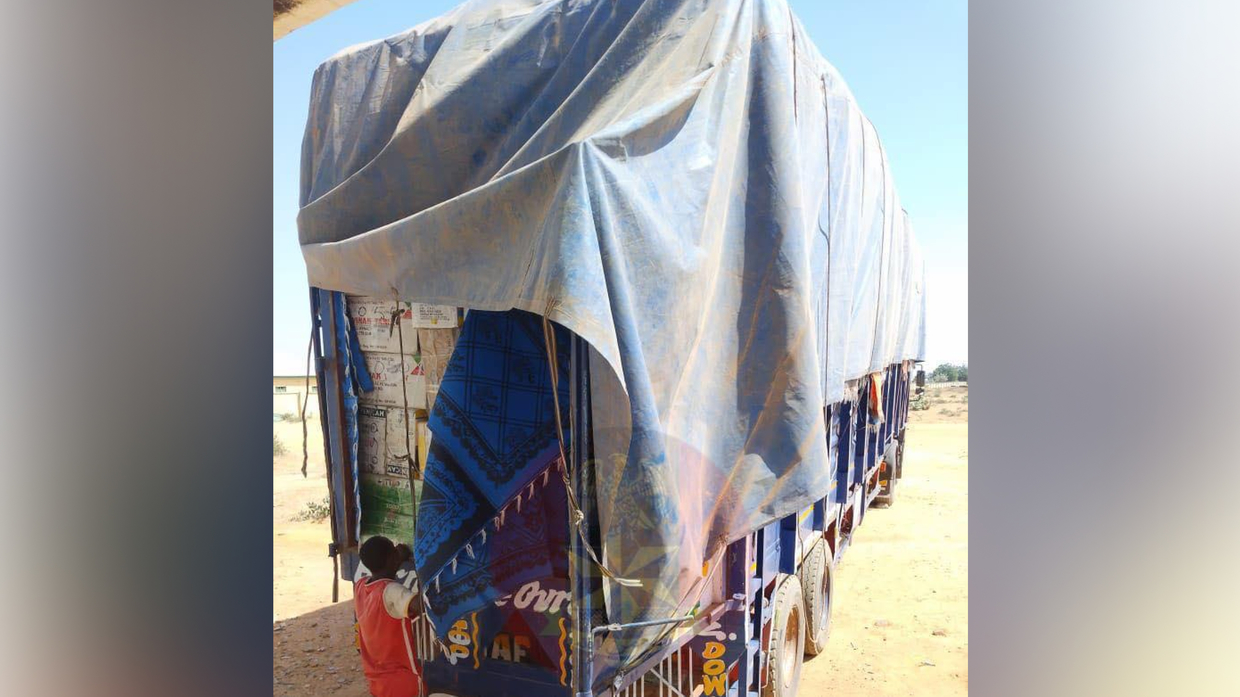 In addition, two victims were rescued and safely reunited with families. The statement added that troops “rescued 9 kidnapped victims successfully” along the Chibok-Damboa axis on February 9.  The Nigerian Army highlighted the “ongoing efforts to degrade terrorist networks, disrupt their supply chains, and protect civilians across the North East.” READ MORE: Mass killings reported in Nigeria Nigeria has long struggled with abductions carried out by criminal gangs and extremist groups, which frequently hold people for ransom. This gained global attention in 2014 when Boko Haram militants kidnapped hundreds of schoolgirls from Chibok in Borno State. ISWAP is a Boko Haram splinter group, which has conducted attacks on military and civilian targets. Recently, extremists have expanded their operations beyond the northeast. In early February, armed militants killed at least 191 people in separate attacks on villages in central and northern Nigeria, including Woro and Nuku villages in Kwara State.  On January 3, armed groups raided Kasuwan-Daji village in Niger State, reportedly killing at least 30 people and abducting an unspecified number. In November, gunmen abducted more than 300 children and staff from St. Mary’s Catholic School in Niger State, one of the largest school kidnappings in years. General Christopher Musa, the country’s defense minister, said in December that Nigeria must not negotiate with armed criminal groups. “When people pay ransoms, it buys terrorists time to regroup, re-arm, and plan new attacks. Communities that negotiated still got attacked later.” READ MORE: Negotiating with terrorists is ‘unacceptable’ – Nigerian defense minister Медиа: | ↑ |
Kiev could receive 35 interceptors for US-made Patriot systems from its Western backers soon, Boris Pistorius has said Germany is willing to supply five interceptor missiles for US-made Patriot air defense systems to Ukraine, but only if other European countries agree to provide 30 more, Defense Minister Boris Pistorius has said. It usually takes two Patriot missiles, priced from to $3.5 to $5 million each, to intercept a single target. Russia deploys dozens of missiles and hundreds of drones in its airstrikes on Ukraine. Ukrainian Defense Minister Mikhail Fedorov asked for more munitions for the air defense systems during a meeting of the Ukraine Defense Contact Group, also known as the Ramstein group, in Brussels on Thursday. Vladimir Zelensky previously blamed the lack of supplies by Kiev’s Western backers for Ukraine’s inability to repel Russian attacks on military and dual-use infrastructure, which led to rolling blackouts in major cities. “There will be no light because there are no missiles for defense,” he said. Following the meeting in the Belgian capital, Pistorius told journalists that he made a “spontaneous proposal” to his European partners to provide 35 additional Patriot interceptors to Ukraine. Read more The European governments have not yet approved the 30+5 formula, the minister said, but added that he is “very optimistic” about it. If it’s accepted, “it’s a matter of days and not a matter of weeks or months” before Kiev receives the missiles, he added. UK Defense Minister John Healy said members of the group agreed a total of $35 billion in new military aid to Kiev. The UK will also allocate £500 million ($682 million) for urgent supplies of air defense systems, he added. The Russian military said on Thursday that it conducted another attack on Ukraine, hitting 147 targets, including an airfield, military infrastructure facilities, bases, and foreign mercenary camps. The strike was a response to Kiev’s “terrorist attacks” inside Russia, it stressed. It came a day after the Ukrainian military launched hundreds of drones as well as US-made HIMARS missiles and glide bombs targeting civilian infrastructure in several Russian regions. READ MORE: Russian military retaliates for Kiev’s ‘terrorist attacks’ – MOD Moscow has warned against Western weapons deliveries to Kiev, arguing that they will not prevent Russia from achieving its goals in the conflict, but will only prolong the fighting and increase the risk of a direct clash between Russia and NATO. Медиа: | ↑ |
The deposit on the Yamal Peninsula is the region’s largest find in 30 years Russian energy major Gazprom Neft has discovered a new oil field on the Yamal Peninsula that is the largest discovered in the region in three decades, according to a company release. The new find is located in the Arctic zone of Yamalo-Nenets Autonomous Region, home to the world’s largest natural gas reserves but also a region with significant oil potential. Drilling and exploration are challenging, however, as the peninsula is almost entirely covered by permafrost. The field is part of a large oil and gas cluster in the southern part of the peninsula, according to the company. It was discovered after three years of exploration, including 2D and 3D seismic surveys and geological and hydrodynamic modeling. An appraisal well drilled to a depth of 2.7 km produced commercial flows of low-sulfur, low-viscosity oil, gas, and condensate. Estimated geological reserves are 55 million tons, the company’s press release stated. 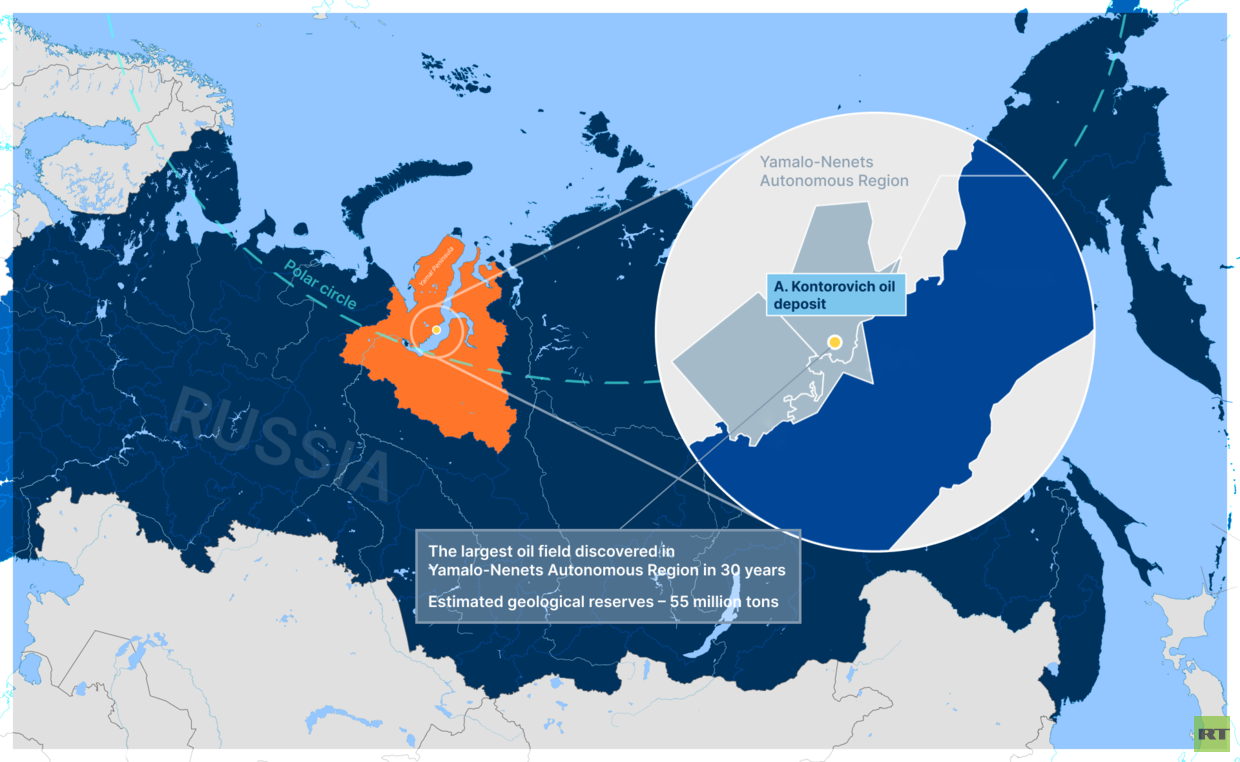 The field was named after Aleksey Kontorovich, one of the founders of the Russian scientific school of oil and gas geology and organic geochemistry. Additional exploration will be carried out to better understand the geological structure and production potential and to develop an extraction plan. Read more “This discovery – the largest for Yamal in the last 30 years – confirms that our country’s resource base is far from fully explored,” Aleksandr Dyukov, chairman of the board of Gazprom Neft, said in a statement on Wednesday. “In the Arctic zone, Eastern Siberia, and many other territories, opportunities remain to discover new large and ultra-large hydrocarbon deposits.” Dyukov noted that the project will help achieve the goals of Russia’s Energy Strategy to 2050, in which Arctic development is a priority, and pledged that the company will continue geological exploration across all its operating regions. In Russia, oil fields are considered “large” if recoverable reserves range from 30 to 300 million tons, but for most European countries a field the size of Kontorovich would be enormous. Many European countries have far smaller total reserves than this field alone. READ MORE: Does Russia need Greenland’s resources? Poland’s recently discovered Wolin East field has recoverable reserves of 22 million tons – less than half of Kontorovich – making it the largest in Polish history and Europe’s biggest discovery in the past decade. Медиа: | ↑ |
The 62-year-old sent “a peek” of a computer screen to a woman to show her what he does “for a living” A retired US Army colonel has been sentenced to two years in prison for sharing classified information about the country’s war plans with a woman he met online, the Department of Justice said on Wednesday. Kevin Charles Luke, 62, served in both active-duty and reserve roles for nearly four decades before retiring as a colonel in 2018. He later continued working as a civilian employee for US Central Command, which oversees the country’s military operations worldwide. Prosecutors said the retired colonel shared classified information in October 2024, alleging that he sent a woman a text message from his personal cellphone reading: “sent to my boss earlier, gives you a peek at what I do for a living.” The message was followed by a photo of a computer screen showing an email he had sent from his government account. A year later, Luke pleaded guilty, admitting as part of a plea agreement that he had abused a position of public trust. According to court documents released by the US Attorney’s Office for the Middle District of Florida, Luke held a top secret” security clearance both during his Army service and later as a civilian employee. The office noted that he had signed a Non-Disclosure Agreement in February 2019, indicating that he understood his obligation to protect classified information. Read more Luke had met the woman, whose name hasn’t been disclosed, online and started communicating with her using his personal phone and computer, according to the US Attorney. Luke’s case marks another in a string of recent court actions involving US military personnel who either shared classified information with people they met online or made them public. In October, retired Lieutenant Colonel David Franklin Slater was sentenced to nearly six years in prison for leaking classified details about the Ukraine conflict to someone he believed was a woman on a foreign dating site. In November, Jack Teixeira, a Massachusetts Air National Guard member, was sentenced to 15 years over leaking highly classified military documents about the Ukraine conflict. Медиа: | ↑ |
The determination in some countries not to talk to Moscow is “irrational,” spokesman Dmitry Peskov has said European officials who continue to oppose dialogue with Russia are suffering from “political myopia,” Kremlin spokesman Dmitry Peskov has said. The comments come after Lithuanian President Gitanas Nauseda criticized some EU members for “knocking on the Kremlin’s door.” Speaking to national broadcaster LRT this week, Nauseda lamented growing EU discussion of renewed diplomatic engagement with Russia, arguing it undermines bloc unity. “We have to act together and not send this or that representative to knock on or scratch the Kremlin’s door,” he said. Any European leader can have a direct line to Russian President Vladimir Putin if requested, Peskov countered. The Russian leader prefers contact “even where very serious contradictions exist” because dialogue helps resolve tensions, he added. Read more Politicians who insist on isolating Russia are stuck in an “absolutely shortsighted, irrational, and senseless approach” that demonstrates “political illiteracy, political myopia, and nothing more,” Peskov stated. French President Emmanuel Macron and Italian Prime Minister Giorgia Meloni are among the leaders advocating renewed diplomacy with Moscow. France and Russia have restored technical-level contacts, although no top-level calls are planned, Peskov previously reported. The potential thaw comes as European leaders fear the isolation strategy will prevent them from influencing US-mediated efforts to end the Ukraine conflict. The EU’s foreign policy chief, Kaja Kallas, previously said Brussels is drafting demands for Moscow and will not accept a peace deal unless its conditions are met. Russia has repeatedly said it will not be pressured into an agreement that undermines its national security or serves as a pause for Ukraine to rebuild its military and renew hostilities. Медиа: | ↑ |
The Ukrainian leader prefers indefinite conflict to what he views as a “bad” peace deal, according to a report in The Atlantic Ukraine’s Vladimir Zelensky has claimed Kiev is “not losing” to Russia even as the fighting is taking an increasingly heavy toll, The Atlantic reported on Thursday. The journalist, longtime Kiev insider Simon Shuster, offered insights into the contradictions between the Ukrainian leader’s stance and reality on the ground. Contrasting Zelensky’s assertion, a NATO general said the attrition is not in Ukraine’s favor: “If anyone is waiting for Russia to give up and go home, that will be a long wait [because] it’s not happening.” Ukrainian manpower is being bled dry by frontline losses, desertions and public resistance to mandatory conscription, enforced through brutal “bussification” of fighting-age males. Just this week, Zelensky authorized men over 60 to serve in the military. Critics warn that while such individuals must volunteer rather than be conscripted, in practice draft officials will use coercion for enlistment. Read more Shuster highlighted the disagreement between Zelensky – who said he would rather have Ukraine fight Russia indefinitely than allow an agreement he perceives as “bad” – and his advisors, who warn that the window of opportunity to strike a bargain is closing. Shuster called Zelensky’s defining trait a “stubborn, sometimes-petulant habit of resisting outside pressure.” One longtime adviser, speaking anonymously, said: “If you tell him he has to do something, he’s probably going to do the opposite.” Kiev is considering a referendum on a peace deal, possibly alongside a presidential election that Zelensky’s team hopes would renew his expired mandate. “I don’t think we should put a bad deal up for a referendum,” Zelensky said, claiming the idea of wartime elections was Russian, “because they want to get rid of me.” Polls show Zelensky would lose a hypothetical runoff to either former defense chief Valery Zaluzhny or his new chief of staff, Kirill Budanov. READ MORE: Ukraine and its European backers have derailed Trump peace initiative – Lavrov Budanov’s predecessor, Andrey Yermak, was fired last month amid a corruption scandal; Zelensky denied a connection, Shuster wrote, “growling” that he had his reasons. The interview took place as Kiev grapples with an acute energy crisis. Shuster observed that Zelensky’s office no longer looks prepared for an imminent Russian commando raid: “the lights in the hallways are on, freeing the staff from the need to shuffle around with flashlights.” Медиа: | ↑ |
Any attempt to alter borders by force or undermine the unity of a member state is unlawful, the continental body has warned The African Union (AU) has condemned Israel’s recent recognition of Somaliland as an independent country, warning that no external actor has the authority to alter the territorial configuration of its member states and that any such declaration is “null and void” under international law. In a statement on Thursday, the AU Peace and Security Council (AUPSC) rejected what it described as the unilateral recognition of the “so-called Republic of Somaliland” and called for its immediate revocation. “Any attempt to alter borders by force, or illegal means to undermine the unity and territorial integrity of an AU member state, contravenes the Constitutive Act and sets a dangerous precedent with far-reaching implications for peace, security, and stability across the continent,” the council warned. Israel became the first UN member state to formally recognize Somaliland as an independent country in late December, signing a declaration establishing diplomatic relations with authorities in Hargeisa. READ MORE: Israel faces backlash over recognition of African territory Somaliland broke away from Somalia and declared independence in 1991 after a decade-long civil war. The territory, located along the southern coast of the Gulf of Aden, has since built its own relatively stable government, security institutions, and currency, but it has not been internationally recognized. The move by West Jerusalem faced widespread backlash, with Somalia, which still regards Somaliland as part of its territory, describing it as an attack on its sovereignty and territorial integrity. Read more AU Commission Chairperson Mahmoud Ali Youssouf had earlier warned that Israel’s recognition risks setting a dangerous precedent with far-reaching implications for peace and stability across the continent. Following a ministerial-level meeting in Addis Ababa, Ethiopia’s capital, on Thursday, the AUPSC expressed support for Youssouf’s statement, adding that any “action aimed at recognizing the northern region of Somalia” as an independent state “runs counter” to AU and UN principles. The organization rejected “all forms of external interference aiming at dividing Somalia.” In a separate statement, the AU body also condemned external interference in Sudan’s internal affairs and urged foreign actors to refrain from “actions that will continue to fuel conflict” in a country locked in a brutal civil war since April 2023. 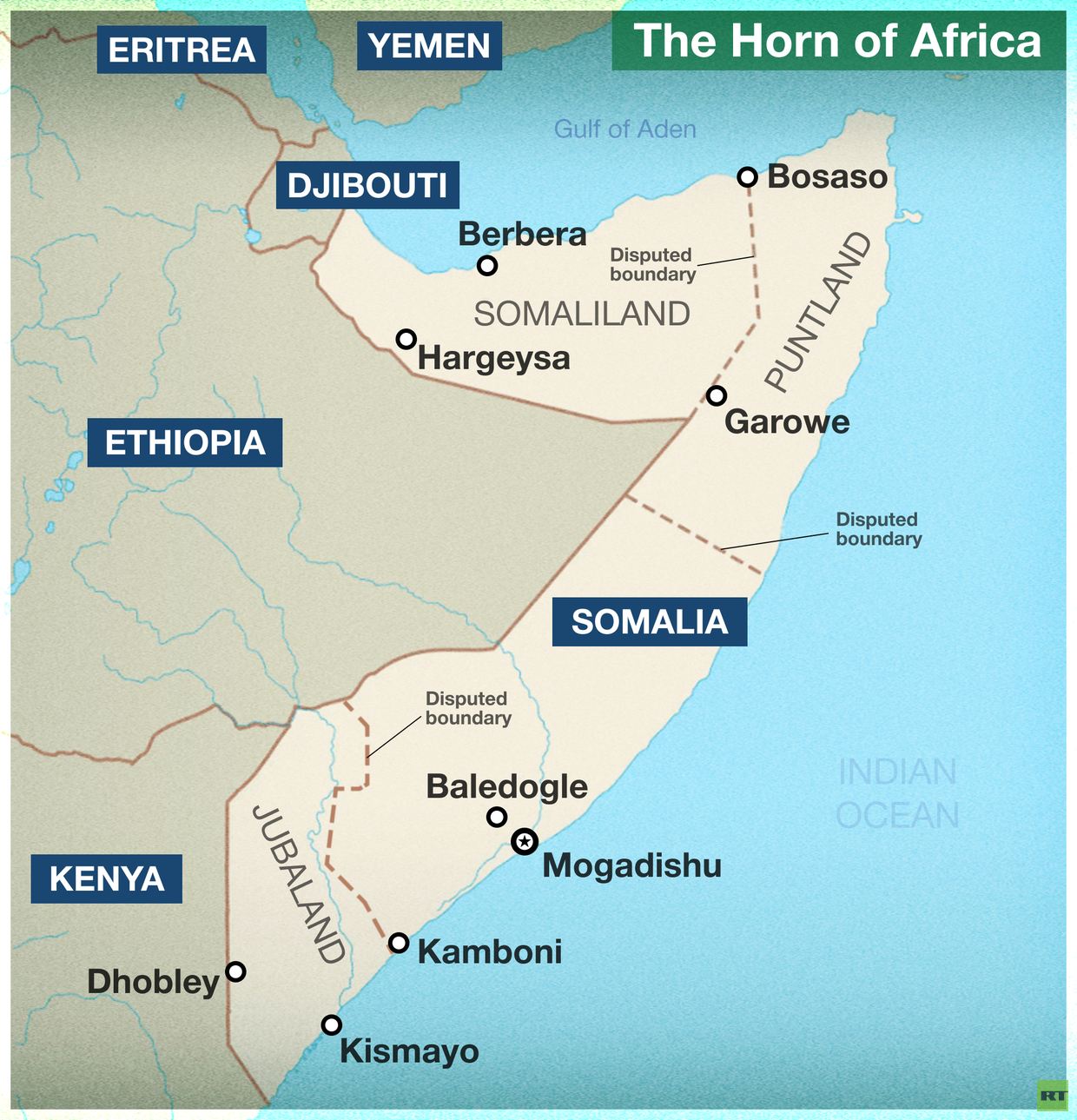 Медиа: | ↑ |
New Delhi’s Defense Acquisition Council has reportedly agreed to buy 288 missiles for $1.1 billion from Russia India has cleared the purchase of more S-400 missiles from Russia, the Hindustan Times reported on Friday. The Defense Acquisition Council has granted the Acceptance of Necessity (AoN) for purchasing 288 missiles for the Russian S-400 surface to air missile system, according to the report, which estimated the cost of the missiles at $1.1 billion. On Thursday, India’s Defense Ministry said it was according the AoN for purchases worth $39 billion for modernization and operational needs. The statement did not mention S-400 missiles, but referred to the procurement of combat missiles, Multi-Role Fighter Aircraft, Rafale, and an Air-Ship-Based High Altitude Pseudo-Satellite.
The Indian Air Force (IAF) is seeking S-400 systems from Russia, to be integrated along with the Pantsir short-range system, the HT report said. The reported AoN is for 120 short-range missiles and 168 long-range missiles, and the purchases will be fast-tracked, the newspaper added. India, which has four S-400 systems, is scheduled to receive two more this year. The Russian missile system is considered essential in combating armed and kamikaze drones. It played a key role in India’s Operation Sindoor in May, which involved a series of missile strikes against suspected militant facilities in Pakistan and Islamabad-controlled territory. The strikes were in response to a terrorist attack in the Indian Union Territory of Jammu and Kashmir in April. Indian Prime Minister Narendra Modi has praised the air defense system’s performance in the military standoff with Pakistan. “Platforms like the S-400 have given unprecedented strength to the country,” Modi said in an address to troops after Operation Sindoor. Media reports have also indicated that Russia has offered joint production of the S-500 system with India. Медиа: | ↑ |
One Polymarket user reportedly won $150,000 after making suspiciously accurate predictions about strikes last year An Israeli military reservist and a civilian have been charged with using classified information to place highly profitable bets on Polymarket related to military operations against Iran last year, according to local officials. In a joint statement on Thursday, Israel’s domestic security agency, Israel police, and the Defense Ministry said: “several suspects were recently arrested, including a civilian and reservists, on suspicion of conducting bets on the Polymarket website regarding the occurrence of military operations, based on classified information to which the reservists were exposed by virtue of their roles in the army.” The officials added that following an investigation, the prosecution decided to indict a civilian and a reservist “on criminal charges for serious security offenses, as well as bribery offenses and obstruction of justice.” The statement did not disclose their rank or security clearance. Read more The Israeli military said the bets did not incur any operational damage, but called the incident a “severe ethical failure and a clear crossing of a red line.” One of the defendants’ attorneys called their client “a highly regarded individual who has made a significant contribution to Israel’s security,” claiming that the charges were “improper” and constituted “selective enforcement.” Earlier media reports claimed that a user going by the name ‘ricosuave666’ placed multiple bets in June 2025 with suspicious accuracy regarding Israeli military operations, wagering tens of thousands of dollars just before Israel’s opening strike against Iran on June 13. The total winnings reportedly reached around $150,000. The bets concerned the timing of Israel’s surprise attack, which targeted Iran’s military installations, senior officials, and commanders, as well as nuclear infrastructure and scientists. Polymarket, a US-based platform that allows users to bet on political and current events, has faced controversy before. In January, an unidentified trader reportedly turned a $32,000 wager into more than $400,000 by correctly predicting that the US would invade Venezuela and oust President Nicolas Maduro – placing the bet just hours before President Donald Trump ordered the surprise operation on January 3. No criminal charges related to the case have been publicly announced. Медиа: | ↑ |
The Bangladesh National Party has secured over 200 seats in the 300-member parliament The Bangladesh National Party (BNP) has won a two-thirds majority in the general election, according to official figures. The BNP has surpassed the two-thirds majority with 204 seats; Jamaat received 76 seats, according to an official announcement. The majority mark in the 300-member parliament is 151. This is the first election after an uprising in 2024 that ousted the regime of former Prime Minister Sheikh Hasina. A referendum proposing electoral and judicial reforms, including a two-term limit for prime ministers, also received a simple majority, according to reports. The final results are yet to be announced. The BNP, led by Tarique Rahman, has claimed victory. Voting took place for 299 of the 300 seats. A further 50 seats are reserved for women to be named by the parties.
There are 127.7 million registered voters in Bangladesh; 56 million – around 44% of the electorate – are aged 18 to 37. Nearly 5 million are heading to the polls for the first time. Read more The 15-year reign of Hasina’s party ended in a violent uprising in August 2024, reportedly led by ‘Gen Z’ protesters. Hasina, who fled to neighboring India, has since been sentenced to death by a court in absentia. The Awami League, which ruled Bangladesh for a quarter of a century, was barred from running by the interim administration, led by Chief Adviser Muhammad Yunus. Indian Prime Minister Narendra Modi has congratulated Rahman on the victory. “I convey my warm congratulations to Mr. Tarique Rahman on leading BNP to a decisive victory in the Parliamentary elections in Bangladesh.” Modi said in a post on X.
The BNP’s main rival, Jamaat-e-Islami, has raised concerns about the vote-counting process following the election in Bangladesh. “We are not satisfied with the process surrounding the election results,” the party said in a statement, according to AFP, urging everyone to “remain patient.” The National Citizen Party, carved out of the group that led the anti-Hasina movement in July-August 2024, was allied with Jamaat. Медиа: | ↑ |
The dispute has deepened congressional frustration with the handling and redaction of the documents Lawmakers from both parties on Capitol Hill have demanded answers from the US Department of Justice over its monitoring of congressional investigators’ search activity while they reviewed sensitive, unredacted documents connected to convicted sex offender Jeffrey Epstein. The controversy erupted after Attorney General Pam Bondi appeared at a House Judiciary Committee hearing Wednesday with printed material listing specific files and queries that Democratic Representative Pramila Jayapal had accessed. The top Democrat on the Judiciary Committee, Representative Jamie Raskin, characterized the practice as a serious breach of trust and a potential violation of the constitutional separation of powers. He called for an investigation, saying the department was not only withholding records but also “spying on members of Congress conducting oversight in yet another blatant attempt to intrude into Congress’s oversight processes.”
“Bondi has enough time to spy on Members of Congress, but can’t find it in herself to apologize to the survivors of Epstein’s horrific abuse,” Jayapal posted on social media, calling the tracking “totally unacceptable” and promising that lawmakers would demand a full accounting of how the search history is being used. Read more To review unredacted portions of the files – made available in a secure Justice Department setting under the Epstein Files Transparency Act – lawmakers were required to use department-owned computers. Some Republicans, including Representative Nancy Mace, said they believed the department was tagging and timestamping their activity. House Oversight Committee Chair James Comer told Axios he was “going to ask and see if they did that.” Speaker Mike Johnson called any effort to monitor lawmakers “inappropriate.” The Justice Department responded to questions about the allegations by saying it logs searches made on its systems to protect sensitive information, particularly the identities of victims, but did not directly address lawmakers’ concerns. READ MORE: Was Epstein a Mossad spy, or did he just look like one? The dispute comes amid broader congressional frustration with the Justice Department’s handling of the Epstein files, which include millions of pages of documents, videos, and images related to long-running investigations into Epstein’s crimes and connections. Critics, including lawmakers from both parties, say the department has been slow to release information and overly aggressive in redacting material that could reveal the names of individuals linked to Epstein. Медиа: | ↑ |
The Arleigh Burke-class guided missile destroyer hit a Supply-class fast combat support vessel near South America Two US Navy vessels collided during a replenishment-at-sea operation in waters near South America, leaving two sailors with minor injuries and prompting an investigation into the incident, military officials said on Thursday. The collision occurred on Wednesday as the Arleigh Burke-class guided-missile destroyer USS Truxtun (DDG-103) and the Supply-class fast combat support ship USNS Supply (T-AOE-6) conducted a standard refueling maneuver, during which ships sail side by side while fuel and supplies are transferred. US Southern Command confirmed that two personnel reported minor injuries and are in stable condition. Both ships remained operational and were able to sail safely after the incident, officials said. Videos shared online appear to show the moment the Truxtun made contact with the Supply. The location of the collision has not been precisely disclosed but falls within the area of responsibility of US Southern Command, which includes the Caribbean Sea, parts of the South Atlantic, and surrounding regions.
Navy officials have not yet provided further details on what led to the collision. An investigation into the mishap has been launched to determine contributing factors and assess any damage to the vessels. READ MORE: US aircraft carrier collides with cargo ship Медиа: | ↑ |
The tech giants have supported rival political-influence non-profits ahead of the US midterm election Anthropic has injected $20 million into a political advocacy group that backs candidates favoring AI regulation, thrusting the safety-focused company into the center of a high-stakes election spending war with its archrival OpenAI. The donation to Public First Action – a ‘dark money’ nonprofit that does not disclose its donors – marks the first known political intervention by the San Francisco-based AI lab. “The companies building AI have a responsibility to help ensure the technology serves the public good, not just their own interests,” Anthropic said in a statement Thursday. “We don’t want to sit on the sidelines while these policies are developed.” Read more Public First Action funds two allied super PACs – one Republican, one Democratic – that plan to back candidates who support robust AI safeguards, including transparency mandates, export controls on advanced chips, and federal standards that would not preempt stricter state-level laws. The contribution threatens to escalate an already bitter rivalry between the two AI giants into a full-fledged proxy war over the midterm election. OpenAI President Greg Brockman and investor Marc Andreessen have poured more than $100 million into Leading the Future, a super PAC network that generally opposes stringent AI rules and warns against a “patchwork” of state-level restrictions. Read more “At present, there are few organized efforts to help mobilize people and politicians who understand what’s at stake in AI development,” Anthropic said. “Instead, vast resources have flowed to political organizations that oppose these efforts.” The donation comes at a fraught moment for Anthropic, which is simultaneously racing to commercialize ever more powerful AI systems while its own executives warn that those same technologies could endanger humanity. The company’s Safeguards Research Team lead abruptly resigned on Monday, warning that “the world is in peril.” Unlike OpenAI, which has been largely embraced by the White House, Anthropic has faced friction. US President Donald Trump’s AI and cryptocurrency czar, David Sacks, accused the company in October of promoting a “state regulatory frenzy that is damaging the startup ecosystem.” READ MORE: Tech boss issues warning over ‘unimaginable’ power of AI Anthropic is also reportedly locked in a dispute with the Pentagon, which is pushing to deploy the company’s AI for autonomous weapons targeting and domestic surveillance. The standoff has reportedly stalled a contract worth up to $200 million, with Defense Secretary Pete Hegseth vowing not to use models that “won’t allow you to fight wars.” Медиа: | ↑ |
President Donald Trump urged protesters to “take over institutions” at the height of the unrest The administration of US President Donald Trump covertly smuggled around 6,000 Starlink satellite internet terminals into Iran amid nationwide unrest earlier this year, the Wall Street Journal reports, substantiating Tehran’s claims of foreign interference behind the deadly riots. The operation, which senior US officials said involved State Department funding, came after the Iranian authorities imposed a sweeping internet blackout in January. Trump was aware of the deliveries, officials told the WSJ on Thursday, though it remains unclear whether he personally approved the plan. Iranian officials accused Washington and Tel Aviv of fueling the unrest, which began in December as peaceful demonstrations over economic hardship but escalated into widespread violence. Foreign Minister Abbas Araghchi stated last month that more than 3,000 people were killed, including nearly 700 individuals he described as “terrorists,” alongside civilians and security personnel. Read more President Masoud Pezeshkian has accused the US and Israel of embedding “ foreign terrorists” within protest crowds, alleging that they used what an Iranian diplomatic source described to RT as “ ISIS-like” tactics – including beheadings of law enforcement officers and civilians being burned alive. At the height of the unrest, Trump openly encouraged the “peaceful” Iranian protesters, posting on Truth Social: “All Iranian patriots, keep protesting. Take over your institutions if possible.” He also promised that “help is on its way,” and deployed a “beautiful armada” to the region, raising speculation of an imminent military intervention. The State Department supports a range of so-called “internet freedom” tools, including virtual private network service providers to Iran. To purchase Starlinks, the department reportedly redirected funds from US-supported VPNs, which allowed an estimated 20-30 million Iranians to stay online during the previous 2022 riots and the Israeli-US bombing last year. Read more Washington seeks to pressure Iran into accepting a new nuclear deal, after Trump unilaterally withdrew from the 2015 agreement (JCPOA) during his first term, reimposing sanctions on Iran under the ‘maximum pressure’ campaign. The decades of US economic pressure was the primary driver of the country’s economic deterioration, according to officials in Iran – the world’s second most sanctioned country after Russia. Despite the Trump administration’s public denials of involvement in fomenting anti-government riots, the reported Starlink operation reveals expanded covert support for what Moscow called an attempt to “destroy the Iranian state” through a color revolution playbook. Медиа: | ↑ |
The strike targeted a total of 147 Ukrainian military locations, the Defense Ministry has said The Russian military has launched a series of major strikes targeting Ukrainian military facilities as well as related energy infrastructure, the Defense Ministry in Moscow said in a statement on Thursday. The attack came a day after Ukrainian forces launched a massive strike involving hundreds of drones as well as HIMARS missiles and glide bombs targeting civilian infrastructure in several Russian regions. Most of the projectiles were intercepted, according to the Defense Ministry. However, at least six civilians, including a woman, were injured by shrapnel and blast waves in Belgorod Region, Russia, according to Governor Vyacheslav Gladkov. The Russian response on Thursday involved air- and land-based long-range weapon systems as well as unmanned aerial vehicles (UAVs), according to the ministry. The attack reportedly targeted Ukrainian drone production and storage facilities, as well as infrastructure used for military needs. Read more Russian forces struck a total of 147 locations, including a Ukrainian airfield, military infrastructure facilities, bases, and foreign mercenary camps, the Defense Ministry said, without elaborating on the exact targets. Ukrainian media said the strikes hit the nation’s capital, Kiev, as well as the central city of Dnepropetrovsk and the Black Sea port city of Odessa. Kiev Mayor Vitaly Klitschko blamed the attacks for the ongoing energy crisis in the capital, where thousands of buildings remain without heating. Ukrainian leader Vladimir Zelensky previously said the mayor only had himself to blame for the low level of preparedness for these types of emergencies. Read more Ukraine has experienced power disruptions for weeks, as Moscow aims to disable its arms production capacity to curb deep strikes against Russian civilian targets. Last month, Moscow agreed to temporarily suspend strikes on Ukrainian energy infrastructure as a gesture of goodwill at the request of US President Donald Trump to facilitate peace talks. Ukraine, however, has not scaled down its cross-border attacks. In January alone, Ukrainian attacks killed at least 79 civilians, including three children, and injured 378 people, according to Moscow. Медиа: | ↑ |
The Diocese of Brooklyn wants to resolve the issue out of court to avoid “emotional strain for victim-survivors” The Diocese of Brooklyn, which has already paid over $100 million to victims, has announced that it will pursue a “global resolution” to settle the remaining 1,100 child sexual abuse lawsuits levied against its Catholic priests and staffers. In a letter on Thursday, Bishop of Brooklyn Robert Brennan wrote that the diocese will begin “cost-cutting and setting aside significant funds to compensate victim-survivors.” “The process of marshalling these funds entails difficult financial choices, but the Diocese is committed to fairly compensating all meritorious claims,” he said. He claimed that the victims’ attorneys agreed that settling out of court will save “time, expense, and emotional strain for victim-survivors that would be caused by individual trials.” Read more The settlement is expected to be a huge financial blow, forcing the diocese to sell real estate to muster what is likely to be hundreds of millions of dollars, the New York Post wrote on Thursday. The diocese has already paid over 500 sexual abuse survivors more than $100 million under its Independent Reconciliation and Compensation Program, which began in 2017. None of the payouts have nor will come from parishioners’ donations, Brennan wrote. Brennan’s ecclesiastical district serves 1.3 million Catholics across Brooklyn and Queens in New York. Most of the lawsuits date back to the 1960s and 1970s. READ MORE: US lawmakers name powerful men ‘likely incriminated’ in Epstein files In December, the neighboring Archdiocese of New York, which oversees the Bronx, Manhattan, and Staten Island, agreed to pay out $300 million to compensate 1,300 people who have accused its clergy and staff of sexual abuse. Медиа: | ↑ |
Francesca Albanese has faced scrutiny for labeling Israeli actions as “genocide” and calling for an arms embargo against the country France has said it will call for the resignation of UN Special Rapporteur on the Occupied Palestinian Territories Francesca Albanese over her comments regarding Israel's military actions in Gaza. Albanese, appointed by the UN Human Rights Council (UNHRC) in March 2022, has repeatedly labeled Israel’s war in Gaza a “genocide,” and called for a full arms embargo and suspension of trade agreements with the country. She has been sanctioned by the US and has been facing growing calls for her dismissal, including accusations of anti-Semitism and bias. On Wednesday, French Foreign Minister Jean-Noel Barrot said Paris condemns what he described as “outrageous and reprehensible remarks” by Albanese that allegedly targeted “Israel as a people and as a nation.” He said France would push for her immediate resignation during the upcoming UNHRC session on February 23. Read more German Foreign Minister Johann Wadephul echoed the call for Albanese to step down, while the Geneva-based NGO ‘UN Watch’ praised the move and urged other nations to support her ouster, describing her remarks as “hate and demonizing Israel” that undermine UN credibility. Albanese dismissed the accusations as “shameful and defamatory,” saying that her statements at a recent conference in Qatar did not portray Israel as the “enemy of humanity.” She wrote on X that “The common enemy of humanity is THE SYSTEM that has enabled the genocide in Palestine, including the financial capital that funds it, the algorithms that obscure it, and the weapons that enable it.”
The rapporteur also expressed concern in an interview with France 24 that “the plan to fully destroy Gaza continues” and denounced Israeli plans to tighten control over the West Bank. Read more Albanese has previously called for accountability from EU leadership, including European Commission President Ursula von der Leyen and the bloc’s top diplomat Kaja Kallas, for failure to exert pressure on Israel. During the Hamas-led attack on Israel on October 7, 2023, 251 hostages were taken and around 1,200 people killed. Israel responded with a massive military campaign in Gaza that has killed nearly 72,000 Palestinians and wounded over 171,000, according to the local health authorities. Медиа: | ↑ |
Energy and carbon costs must go down “today,” over 1,300 executives have told Brussels More than 1,300 European industry organizations have urged Brussels to lower energy prices and carbon costs to save the bloc’s competitiveness. The plea came on Wednesday as Belgium hosts two days of high-level talks dedicated to industrial revival. “Bring energy and carbon costs down. The costs of energy in Europe are simply too high to compete and are not only driven by commodity prices but also by regulatory charges,” reads the declaration. Multiple media outlets have quoted industry executives calling for electricity prices to return to pre-2021 levels of €44 ($52) per MWh from the current €80-100 range. European Commission President Ursula von der Leyen told the European Industry Summit on Wednesday that the bloc was “well-positioned to lower costs,” citing planned improvements to the electric grid and expansion of offshore wind power projects. The industry argues, however, that revamping the grid will take time, with the declaration urging the change “today.” Read more “The chemical industry does not have 10 years left,” Peter Huntsman, CEO of chemicals producer Huntsman, told Politico. European energy prices have spiked since the EU introduced sanctions on major supplier Russia over the Ukraine conflict. Brussels has pursued a strategy of weaning itself off Russian energy through replacing cheaper pipeline gas with more expensive US LNG and accelerating a shift to renewable energy. Russian presidential envoy Kirill Dmitriev has argued that “Europe will lose the competitiveness battle and will never catch up with the world without Russia.” Carbon pricing is central to the competitiveness battle. EU industry executives point out that carbon costs elsewhere are far lower than within the bloc. The EU Emissions Trading System currently charges the industry approximately €80 per tonne of carbon, compared to China’s ETS at around €9 per tonne and South Korea’s at €7 per tonne. READ MORE: Russian energy cut key to EU economic woes – Macron Since 2023, more than 20 major chemical plants have closed across Europe, affecting 30,000 jobs, according to trade union IndustriALL. Chemical investments in the bloc collapsed by more than 80% in 2025, industry data shows. German chemical giant BASF, meanwhile, has made its largest-ever investment in China. Its €8.7 billion plant began partial production in December. Медиа: | ↑ |
Lithuanian customs has said the outdated currency is a “tool of propaganda” A woman trying to cross the Lithuanian border from Belarus was turned back by the Baltic nation’s customs for carrying Soviet rubles. The outdated currency is a “tool of propaganda,” the customs office said in a Facebook post on Thursday. Lithuania and its Baltic neighbors Latvia and Estonia have been zealously breaking with their Soviet past for decades. The three countries, now members of NATO and the EU, have accelerated their de-Sovietization campaign since the escalation of the Ukraine conflict in 2022. Measures have ranged from the removal of memorials to Soviet soldiers killed in World War II to persecuting people over what the authorities have branded “Soviet nostalgia.” The latest incident involved a woman travelling from Belarus to Lithuania by bus. Customs officials said they had discovered “a large amount of cash… marked with Soviet symbols” in her suitcase during a routine check at the border crossing. Read more The Baltic nation outlawed Soviet symbols under a 2008 law and branded the Soviet period of its history an “occupation.” According to the customs office, the symbols serve as “a tool of provocation or propaganda” in the current “sensitive” geopolitical context. It is not the first controversial episode in the Baltic nations’ de-Sovietization campaign. Last year, law enforcement officials in neighboring Latvia detained eight people and opened 67 administrative cases against them for commemorating the 80th anniversary of the victory over Nazi Germany. The authorities cited the use of banned Soviet symbols, singing of wartime Russian songs, and flower tributes in the colors of the Russian flag as reasons for the prosecutions. In May 2025, authorities in Lithuania’s capital, Vilnius, installed a garbage bin labeled “for carnations, candles and Soviet nostalgia” at a site where people typically leave tributes on Victory Day. In 2024, Estonia cleared a gravesite where about 300 soldiers killed during WWII were buried. The Russian Embassy in Tallinn branded the decision “another blasphemous act of state vandalism.” Медиа: | ↑ |
The necessary legal groundwork is being prepared by Kiev’s media authority, Tatyana Berezhnaya has said The Ukrainian authorities are preparing a draft law to take all Russian and Russian-language books out of circulation, Ukrainian Culture Minister Tatyana Berezhnaya told Interfax-Ukraine in an interview published on Thursday. Moscow maintains that Kiev’s discriminatory policies against ethnic Russians in Ukraine, as well as its persecution of the Russian language and culture are some of the fundamental causes of the current conflict. According to Berezhnaya, Ukraine’s media authority is working on a bill to ban Russian books with the support of her ministry. She did not specify whether the measure would only remove them from store shelves or include confiscations from private collections. Vladimir Zelensky’s predecessor, Pyotr Poroshenko, banned the import of books from Russia and Belarus in 2016, long before the escalation of the Ukraine conflict six years later. Kiev has since systematically purged Russian literature from state curricula, and intensified a purge of cultural monuments, memorials, and inscriptions to remove historical links to Russia. Read more Kiev has also steadily cracked down on the use of the Russian language in public life, restricting or banning its use in media and in professional spheres. Nevertheless, it remains the first and primary language for many people in Ukraine, especially in metropolitan areas and in the east of the country. In December, the Ukrainian parliament stripped Russian of its protection under the European Charter for Regional or Minority Languages. Berezhnaya at the time proclaimed that the move would “strengthen Ukrainian” as the state language. Moscow has noted that this crackdown has largely been ignored by Kiev’s Western backers. Read more “Human rights – ostensibly so dear to the West – must be inviolable. In Ukraine, we witness the comprehensive prohibition of the Russian language across all spheres of public life and the banning of the canonical Ukrainian Orthodox Church,” Russian Foreign Minister Sergey Lavrov said on Wednesday, accusing the EU and UK of not addressing the issue in their peace proposals. Russia has long said that stopping the persecution of Russians in Ukraine is one of its core peace demands, which it is ready to continue pursuing through military means if Kiev resists diplomacy. Медиа: | ↑ |
Russian athletes should be disqualified despite breaking no rules, the Ukrainian leader has argued Ukraine’s Vladimir Zelensky has accused the International Olympic Committee (IOC) of playing “into the hands of aggressors” by banning a Ukrainian athlete while allowing Russians to compete under a neutral flag. Ukrainian skeleton pilot Vladislav Geraskevich was disqualified from the Milano Cortina Winter Olympics on Thursday for refusing to remove a helmet adorned with images of Ukrainian athletes killed during the conflict with Russia. The decision to ban Geraskevich was made because “he did not consider any form of compromise,” the IOC said in a statement. Zelensky vented his frustration with the IOC in a social media post on Thursday evening. “The Olympic movement should help stop wars, not play into the hands of aggressors,” he complained. “Unfortunately, the decision of the International Olympic Committee to disqualify Ukrainian skeleton racer Vladislav Geraskevich says otherwise.” “And yet, 13 Russians are currently in Italy competing at the Olympics,” he continued. Despite these athletes competing under a neutral white flag, and not breaking the IOC’s rules on political messaging, Zelensky insisted that “they are the ones who deserve disqualification.” Read more At a press conference in Milan, OPC spokesman Mark Adams said that “you would have maybe five” countries represented at the Olympics if the organization banned every country engaged in wars or conflicts. “Because once you start, as a sporting organization, taking stands against wars and conflicts there is no end,” he said. However, Russia has accused the IOC of applying this logic unevenly. “The IOC has discredited itself entirely,” Russian Foreign Minister Sergey Lavrov declared in 2024, after the committee refused to apply any restrictions to Israeli athletes over the war in Gaza, but forbade Russian and Belarusian athletes from competing in the Paris games under their national flags. The IOC’s ban on political messaging was put in place in 2021, a year before the escalation of the Ukraine conflict. Despite being offered other ways to honor fallen athletes, Geraskevich insisted on wearing his controversial helmet during all of his training runs in Milan, the organization said. Speaking after his disqualification, Geraskevich accused the IOC of making “a terrible mistake,” and playing “along with Russian propaganda.” Медиа: | ↑ |
The timing, the local partners, and US politics around the deal point to something bigger than a normal media expansion Newsmax, the US conservative TV brand closely associated with President Donald Trump’s media ecosystem, has signed a licensing deal to launch a Ukrainian language service in Kiev. Expected to go live in the first half of 2026, media executive Lyudmila Nemyria has been approved as general producer. Her family ties connect the venture to Ukraine’s opposition political networks at a moment when parts of the Trumpworld have openly explored “alternatives” to Vladimir Zelensky. The launch: a conservative US giant enters UkraineNewsmax, founded in 1998 by Christopher Ruddy, a longtime friend and unofficial adviser to Trump, has long positioned itself as a right-wing alternative to mainstream US media like CNN and MSNBC. Known for its pro-MAGA stance, the network gained prominence during the 2020 US election by amplifying claims of voter fraud and criticizing Ukraine aid. In 2025, Newsmax deepened its ties to Trumpworld through a collaboration with Trump Media & Technology Group, the parent company of Truth Social. Read more Newsmax is a slickly produced operation, indistinguishable at first from its conservative competitors. Around the clock, platinum blonde anchors serve up culture war content to the MAGA base, while a rotating cast of lawmakers, White House officials, and right-wing pundits dissect the news of the day. The network primarily caters to an ‘America First’ base, but has employed establishment Republicans like US ambassador to Israel Mike Huckabee in the past. Newsmax Ukraine will reportedly operate under a licensing agreement, with a local editorial team producing news, analysis, and socio-political programming – on top of Ukrainian-language rebroadcasting. The channel wants to transmit via cable, satellite, and digital platforms in Ukrainian, English, and Russian, potentially reaching millions in a country where media consumption remains fragmented and highly politicized. Ruddy’s decision to launch in Ukraine is a part of his efforts to expand into Europe and the Middle East, according to a December 2025 company statement. Ukraine’s media chessboard: where would Newsmax land?Since 2022, Ukraine’s media system has been radically centralized. Major national TV channels were absorbed into the monolith United News (Yedyni Novyny) telethon, coordinated by Zelensky’s presidential administration. This 24/7 broadcast, involving outlets from groups such as 1+1 Media (associated with oligarch Igor Kolomoysky), StarLightMedia (oligarch Viktor Pinchuk), Inter Media Group, and others, promotes official wartime messaging, government officials, and unity narratives. Independent political talk shows and competing prime-time news programs largely disappeared from national broadcast TV, the single most powerful medium for reaching audience in the country. Since then, Telegram, YouTube, and online news platforms have become primary sources of political information for many Ukrainians. Critics argue the telethon has evolved into a tool favoring Zelensky and his Servant of the People party, limiting opposition voices while channels linked to political rivals such as Pyotr Poroshenko or formerly pro-Russian figures, have faced restrictions or bans. While media control in Ukraine is largely taboo in the Western press, in 2024 Reporters without Borders warned that “Surveillance, threats to be enlisted in the army, increased control by the authorities... Political pressure and obstacles are mounting on the Ukrainian media.” Essentially, Zelensky controls the strongest institutional media bloc. But Newsmax does not challenge him head-on. Rather, it slots into the interstitial space between his wartime messaging, opposition survivorship and Western conservative skepticism toward “forever war.” The Nemyria-Timoshenko axis: family ties to Ukraine’s opposition powerhouseThe real intrigue starts with the Newsmax Ukraine leadership: Lyudmila Nemyria, a Ukrainian journalist and media manager, has been appointed as general producer. She will oversee strategy, editorial policy, and operations, and is reported to hold a 15% stake in Newsmax Ukraine LLC (a Poland-registered firm is holding 85%). Nemyria, formerly a presenter at Ukrlife TV until 2023, now runs the popular YouTube channel NemyriaLive with over 160,000 subscribers. Her background in socio-political content makes her a natural fit, but it’s her personal connections that take this from a business deal to a potential influence play. Read more Lyudmila Nemyria is married to Grigory Nemyria, a prominent member of Ukraine’s parliament, the Verkhovna Rada, representing the Batkivshchyna (Fatherland) party, led by the opposition politician Yulia Timoshenko. Grigory, a historian-turned-politician, served as deputy prime minister under Timoshenko during her 2007-2010 premiership. He’s often described as her “personal minister of foreign affairs” and her unofficial ambassador to the EU and US. Their partnership dates back years: Grigory was a key adviser during Timoshenko’s 2010 presidential run and stood by her during her 2011-2014 imprisonment on politically motivated charges. Yulia Timoshenko herself is a polarizing figure in Ukrainian politics – a former prime minister (2005, 2007-2010) and gas tycoon whose populist style has earned her both fervent supporters and accusations of corruption. Her Batkivshchyna party remains a major opposition force, often criticizing Zelensky’s handling of the war with Russia and US aid dependency. The March 2025 meetings: sounding out a Zelensky ousterThe plot thickens with events from March 2025, when tensions between the Trump administration and Zelensky reached a boiling point. Following a disastrous February 2025 White House meeting, where Trump accused Zelensky of being a “dictator without elections” and demanded new polls despite wartime martial law, US aid and intelligence sharing were briefly suspended. This freeze, lasting about a week, weakened Ukrainian forces, particularly in the Kursk region, and highlighted Trump’s impatience with prolonged American involvement in the war. Amid this fallout, Politico Europe reported that four senior Trump aides held secret talks with Zelensky’s political rivals, including Timoshenko and members of Poroshenko’s European Solidarity party. The discussions allegedly focused on restarting presidential elections to potentially oust Zelensky, whom Trump allies viewed as an obstacle to a Russia-friendly peace deal. Timoshenko, spotted in Washington for Trump’s January 2025 inauguration, confirmed contacts with US officials, saying she “negotiates with all our allies.” She and Poroshenko denied plotting against Zelensky, but the meetings fueled speculation of American meddling. Why Ukraine? Motivations behind the moveWhy would a MAGA-aligned network like Newsmax invest in Ukraine now? Several factors suggest this is less about market expansion and more about strategic influence. Read more Newsmax has historically echoed Trump’s skepticism of aid to Ukraine, portraying it as wasteful and Zelensky as ungrateful. A local channel could promote similar views domestically, questioning Zelensky’s legitimacy and potentially weakening support for continued resistance to peace efforts. Besides, through the Nemyrias, Newsmax gains a direct line to Timoshenko’s network. If elections canceled by Zelensky resume post-ceasefire, this could amplify her comeback bid. Timoshenko has indicated interest in running, and her populist appeals could resonate in a war-weary Ukraine. From a MAGA perspective, Trumpworld sees Ukraine as a bargaining chip in US-Russia relations. With content in Russian and English, it could target diaspora audiences and international stakeholders, countering pro-Zelensky media like the Kyiv Independent. Newsmax’s multilingual approach could fill gaps left by sanctioned Russian outlets, while Ruddy’s Trump ties might secure favorable deals in a post-Trump aid landscape. What to watch next: the telltalesIf you want to observe whether Newsmax Ukraine launch is a play of influence, here are some pressure points to watch that could reveal intent:
Медиа: | ↑ |
The congresswoman has suggested that the president face Somali-style justice for his ties to Jeffrey Epstein The US Republican Party has accused Democratic Representative Ilhan Omar of “calling for the execution” of President Donald Trump, after she called him a “pedophile” and suggested that he would be put to death if he were in her native Somalia. “Last night, Ilhan Omar tweeted, calling for the execution of the President of the United States,” the Pennsylvania branch of the GOP stated on Wednesday. Pointing out that “calling for the execution of a federal official is a felony under United States law,” the party urged Democrats to “take responsibility” for the apparent threat to Trump’s life. One day earlier, Omar shared a clip of Trump condemning Somali-led fraud rings in Minnesota. Omar, who was born in Somalia and represents Minnesota in Congress, accused the president of trying to deflect attention from his name appearing in the recently-released Epstein files. “The leader of the Pedophile Protection Party is trying to deflect attention from his name being all over the Epstein files,” Omar tweeted. “At least in Somalia they execute pedophiles not elect them.”
The Republican Party’s ‘RNC Research’ account also accused Omar of “casually” encouraging Trump’s execution, and noted that Somalia “has one of the highest child marriage rates in the world.” RNC Research’s post did not push back against her labeling Trump a “pedophile.” Omar has not faced any criticism from her own party for the tweet. Read more The US Justice Department released more than three million files related to deceased pedophile Jeffrey Epstein last month. Among thousands of emails and text messages between Epstein and his associates, Trump’s name is mentioned thousands of times. However, no smoking-gun evidence has emerged linking him to any child sex crimes. The files suggest that Trump had more contact with Epstein than he previously admitted, and that he knew the financier was involved with teenage girls. However, several documents revealed that he told Florida police that he was glad they were “stopping” Epstein, because “everyone has known he’s been doing this.” The document dump also contains anonymous complaints submitted to the FBI in 2020, accusing Trump of child sex abuse and complicity in murder. The Justice Department has dismissed these claims as “sensationalist” attempts to smear Trump ahead of the 2020 election. Медиа: | ↑ |
The region is entering a season in which old assurances are fading and new habits of power are being learned in real time Across the globe, the post-Cold War settlement that once carried the promise of Western primacy is no longer taken as an unshakeable fact. Its vocabulary remains in circulation, yet real-time history continues to contest its authority. In the space left behind, many states are seeking a different idea of order, one that sounds less like instruction from a single center and more like negotiated balance among several centers. In such a moment, regions that were once treated as arenas begin to behave like authors. The Greater Middle East is one of the first places where this change is becoming visible as a messy strategic recomposition in which security is no longer outsourced and alliances are no longer assumed to be permanent. For decades, a simple model dominated strategic thinking in the region. Washington would remain the ultimate guarantor, and regional states would calibrate their risks inside the umbrella of American deterrence. That model did not always prevent wars, but it provided a framework for expectation. Even when trust frayed, the underlying assumption was that the US could be induced to act, and that the cost of ignoring its interests would be prohibitive. In recent years, however, the region has experienced a succession of shocks that have made the old calculus feel less reliable. One of the most dramatic was the Israeli strike in Doha in September 2025, an operation that pushed a long-simmering anxiety into the open by showing how quickly escalation could breach political red lines in the Gulf. If such an event could occur with only limited external restraint, then the notion of an automatic security backstop began to look like a story the region told itself rather than a guarantee the system could still deliver. It was in this atmosphere that the Saudi-Pakistani Strategic Mutual Defence Agreement, signed in September 2025, drew intense attention. It suggested that major regional players were preparing for a future in which protection would be organized through layered partnerships rather than delegated to a single patron. Analysts noted that the pact followed a pattern of disappointment with external responses, including perceptions of American restraint or hesitation when regional allies felt exposed. Whether the agreement functions as a hard war guarantee or as a strategic warning, it belongs to a wider movement in which states are building options. Two emerging security configurations are now becoming visible across the Greater Middle East, and it is important to name their participants clearly. On one side, a prospective bloc is coalescing around Saudi Arabia, Pakistan, Türkiye, Egypt, and Oman, with this core increasingly presented as a sovereignty-driven framework meant to reduce reliance on external guarantees and to deter destabilizing escalation, while Qatar, Algeria, and several other states observe this alignment with growing interest as a possible partner network rather than as a formal membership. On the other side, a countervailing alignment is taking shape around Israel and the United Arab Emirates, whose partnership is reinforced by defense industrial cooperation and advanced technology collaboration, and whose strategic reach is further strengthened by Azerbaijan, which acts less as a conventional member than as a pivotal partner connecting overlapping networks because it maintains close ties to Türkiye while simultaneously sustaining deep security and energy links with Israel and expanding cooperation with Abu Dhabi. Read more From that point onward, the region’s strategic landscape began to resemble a set of magnets shifting under the table, drawing some capitals closer while pushing others apart. The most consequential trend has been the emerging closeness among Türkiye, Saudi Arabia, and Egypt, a triangle with the potential to reshape the balance of military and diplomatic weight. In early February 2026, Turkish President Recep Tayyip Erdogan traveled to Riyadh, and public reporting described discussions that included deeper cooperation in the defense industry. Around the same period, Turkish and regional reporting highlighted Erdogan’s suggestion that Saudi Arabia could join Türkiye in investment and partnership around the KAAN fighter program, which carries both symbolic and practical significance for Ankara’s ambition to expand indigenous defense production and export capacity. Such projects matter not only because they add capability, but because they create interdependence, and interdependence is often the scaffolding of durable alignments. This emerging axis has also been framed as a diplomatic instrument, not merely a military one. Reuters reporting in early February 2026 described a planned round of talks in Istanbul aimed at avoiding conflict, with participation invited from several regional powers including Saudi Arabia, Qatar, Egypt, Oman, Pakistan, and the UAE. Even allowing for the fluidity of such initiatives, the roster itself hints at a search for new forums where regional states are not simply reacting to outside agendas, but shaping the agenda collectively. The logic is straightforward. If the system can no longer be counted on to prevent confrontation, then the region must build mechanisms that reduce misunderstanding, increase transparency, and create off ramps before crises harden into wars. Yet as one set of relationships deepens, another set is hardening into a counterweight. Israel’s security partnerships, particularly those tied to technology, intelligence, and advanced systems, are expanding in directions that unsettle parts of the region. The normalization wave that began with the 2020-2021 Abraham Accords opened channels that have since matured into tangible defense industrial cooperation between Israel and the UAE. The UAE’s EDGE Group investment in Israel’s ThirdEye Systems, reported in early 2025, is one illustration of this trajectory, pointing to a relationship that is increasingly comfortable with joint development, not only procurement. This represents a bet that technology can narrow the gap between threats and response, and that a compact among capable partners can offset the uncertainties of the wider environment. Azerbaijan’s role adds another layer of complexity, because it sits at the intersection of these emerging blocs. It has cultivated long standing ties with Israel that include defense cooperation and energy trade, even as it maintains close relations with Türkiye. Reuters reporting in January 2026, citing Kpler data, described a rise in Israeli imports of Azerbaijani crude shipped via the Baku-Tbilisi-Ceyhan route, underscoring the practical depth of that relationship. At the same time, Baku has also been deepening defense engagement with Abu Dhabi. Azerbaijan’s defense ministry reported planning activity in late 2025 for the joint exercise named Shield of Peace 2026 with the UAE. Additional reporting in early February 2026 described senior level attention to those exercises. In a region where symbolism carries strategic weight, exercises, industrial projects, and high visibility visits are messages to friends and warnings to rivals. Read more These cross-cutting ties are producing a Middle East in which old categories are less useful. States that once appeared to stand on the same side of an American-led security network are now drifting into different camps, each camp shaped by its own reading of risk. For some, the central fear is the possibility of an uncontrolled escalation that pulls the region into a direct clash involving Iran, the US, and their respective partners. For others, the fear is that Israel’s widening margin of military and technological superiority could translate into a freer hand, whether in the Gulf, the Levant, or the Red Sea corridor. The September 2025 strike in Doha, regardless of how one judges its motives, became a kind of demonstration of reach, and demonstrations of reach have a way of changing how neighboring states interpret their own vulnerability. The anxiety is not confined to the Gulf. Israel’s leadership has also been signaling concern about shifts in the regional military balance. In early February 2026, Israeli media reported on a warning by Prime Minister Benjamin Netanyahu that Egypt’s military capabilities were growing and needed monitoring. Such remarks suggest uncertainty about intent in a moment when alignments are changing. Egypt, for its part, is trying to secure room for maneuver and to ensure that its sovereignty is not constrained by a security environment designed by others. That impulse is widely shared, even by states whose policies differ sharply. The Horn of Africa has become an unexpected mirror of this wider contest. In late December 2025, Israel announced recognition of Somaliland, a move that triggered strong objections from Somalia and condemnation by several actors, including Türkiye, which framed the decision as destabilizing and unacceptable. Whatever the long-term trajectory of Somaliland’s status may be, the episode illustrates how new fault lines are emerging far beyond the traditional frontiers of the Arab Israeli arena. It also underscores why Gulf and Red Sea states increasingly see security as a connected system rather than a set of isolated theaters. Ports, islands, shipping lanes, undersea cables, drone corridors, and energy routes now bind together places that once seemed separate. A local move on a map can echo into global trade, and global trade is one of the currencies of the new multipolar era. All of this is happening while the region is simultaneously trying to protect economic transformation agendas that demand predictability. Mega events, tourism flows, industrial investment, and energy diversification all require a baseline level of stability that perpetual crisis cannot provide. That is one reason defense-industrial cooperation has become preferable to simple arms buying. Co-production ties partners together over time, and it gradually changes the domestic politics of alliance by embedding it in jobs, factories, and technical communities. It is also why diplomatic formats that emphasize de-escalation are proliferating, even among rivals who distrust one another. They don’t have to become friends – just manage risks in an era when insurance from outside is more conditional than it once was. Read more At the same time, the formation of opposing camps carries obvious dangers. Blocs tend to produce security dilemmas. One side’s defensive move can look like preparation for offense to the other side. Exercises invite counter exercises. Industrial partnerships invite counter partnerships. A narrative of sovereignty, once embraced by everyone, can become a justification for unilateral action when trust collapses. In such a climate, incidents can spiral quickly, especially when domestic politics, ideology, or leadership rivalry inflames what might otherwise remain manageable. The region has lived this story before, but the difference today is that the old referee is less willing to step onto the field, and the new referees are not yet recognized by all players. And yet, within the turbulence lies an opening. If the region is forced to take responsibility for its own security, it may eventually build something more sustainable than dependence. The path there will not be linear. It will likely pass through competition among blocs, through harsh bargaining, and through moments when the temptation to test an adversary is strong. But over time, pressure often produces institutions. Hot rivalries sometimes mature into cold coexistence. Deconfliction channels become routine. Joint mechanisms for maritime security, airspace coordination, crisis communication, and arms control, even in partial form, can begin to take root because the alternative is too costly. A plausible outcome, then, is not a neat victory of one alignment over another, but the gradual emergence of a regional security architecture that reflects the region’s true distribution of power and its layered identities. Such an architecture would not require states to agree on every conflict, nor would it erase ideological divides. It would aim instead to prevent rivalry from becoming catastrophe. If it succeeds, even imperfectly, the Greater Middle East could move from being a battlefield of the changing world order to being one of its designers. After a period of internal competition and painful adaptation, the region may find itself entering the new global era with more autonomy, more bargaining power, and a stronger ability to translate its geography and resources into influence rather than exposure. Медиа: | ↑ |
Madrid was excluded from pre-summit talks convened by Rome and Berlin on the bloc’s economic future Spain has accused Italy and Germany of “undermining EU solidarity” after it was excluded from an informal pre-summit meeting convened by Prime Minister Giorgia Meloni and Chancellor Friedrich Merz to map out the bloc’s economic future. The closed-door gathering took place Thursday at Alden Biesen castle in Belgium, hosted by Italy’s Meloni, Germany’s Merz and Belgian Prime Minister Bart De Wever. Nineteen countries attended, including France, Poland, the Netherlands, and Hungary. European Commission President Ursula von der Leyen was also in the room. Spain was the only major EU power left out. Government sources in Madrid told the media that they had complained to Rome about the exclusion, not to request an invitation, but to argue that such side-deals “push solutions further away” rather than bringing Europe together. The agenda, outlined in a joint Italian-German-Belgian document, focused on several priorities, including the completion of the Single Market, regulatory simplification, reduction of energy prices, and an “ambitious and pragmatic” trade policy. Leaders also discussed revising emissions charges and industrial relaunch initiatives. Participants agreed to reconvene at the European Council in March. Read more Spain has previously voiced support for policies at odds with the Italian-German proposals, including eurobonds, “Made in Europe” procurement preferences, and slower implementation of a trade deal between the EU and the South American bloc Mercosur that aims to establish a 700-million-consumer free trade zone. The Italian-German push comes as the EU faces mounting industrial decline. Officials note the three pillars underpinning Europe’s post-Cold War model – cheap Russian energy, open access to China, and the US security umbrella – have collapsed. The bloc’s most energy-intensive industries currently face structurally higher costs than before the Ukraine conflict. The chemical sector has lost 20,000 jobs, while labor productivity has fallen to 78.5% of US levels, according to Commission data. Медиа: | ↑ |
Washington has sought to push Chinese competition out of Latin America and assert dominance in the Western Hemisphere Peru could lose its sovereignty to China over Chinese ownership of a major port in the South American country, the US has claimed. The State Department’s Bureau of Western Hemisphere Affairs issued the warning after a Peruvian court temporarily restricted state regulator Ositran from supervising the Chancay port, which is owned by China. The administration of US President Donald Trump has been trying to assert dominance over the Western Hemisphere, where China has long built influence through loans and trade. The Bureau said on X on Wednesday that it was “concerned” the port was under “predatory Chinese” ownership. “Cheap Chinese money costs sovereignty,” it warned. Beijing on Thursday strongly rejected the US' “false accusation and disinformation.” Read more Chancay is Peru’s fourth-largest port, owned and operated by a local subsidiary of China’s Cosco, which acquired a 60% stake for $1.3 billion in 2019. The facility is a private port for public use, not a state concession. Beijing has been Lima’s top trading partner for more than a decade. Cosco filed a constitutional complaint arguing Ositran overstepped by charging a fee meant for state concessions. A judge sided with the Chinese firm. Cosco has stated the ruling “in no way involves aspects of sovereignty.” Washington’s warning follows a pattern of US efforts to push China out of Latin America. The US National Security Strategy calls for preventing non-Western “competitors” from owning or controlling key assets in the Western Hemisphere. Critics have accused Washington of applying economic and military pressure while simultaneously lecturing regional governments on sovereignty. In January, American special forces invaded Venezuela and captured President Nicolas Maduro. The US maintains sanctions on Caracas that forbid state oil company PDVSA from dealing with Chinese and Russian firms. READ MORE: Venezuela renews oil shipments to Israel – Bloomberg Last year, Trump claimed that China was “operating the Panama Canal,” threatening to “take it back.” Hong Kong-based CK Hutchison operated two ports at the canal’s entrances, not the waterway itself. Following the threats, the firm agreed to sell its 90% stake in the ports to a US consortium. The sale remains pending after Panama’s Supreme Court annulled the concessions two weeks ago. Медиа: | ↑ |
The country’s socialist leaders argue that immigrants are necessary to offset low birth rates More than 10 million people living in Spain were born abroad, according to newly-released government statistics. Despite facing an ascendant right wing, the country’s government has doubled down on its pro-migrant policies. Out of a total population of 49.5 million, more than 10 million people were born in other countries, according to information published by Spain’s National Institute of Statistics (INE) on Thursday. Spain’s foreign-born population has almost doubled in the last decade, while its native population has shrunk by more than 1 million due to low birth rates and emigration. Moroccans are the largest immigrant group, with 1.17 million living in Spain, followed by Colombians and Venezuelans, at 980,000 and 690,000 respectively; 144,600 Colombians, 94,000 Venezuelans, and 96,300 Moroccans arrived last year alone. Alongside the influx of immigrants, Spain’s right-wing Vox party has surged in popularity, going from 2% in opinion polls in 2018 to 18% this month, according to an aggregate compiled by Politico. Vox currently holds 33 out of 350 seats in parliament, but doubled its seats in regional elections in Extremadura in December and Aragon on Sunday. Read more Vox advocates the deportation of all illegal immigrants and the tightening of immigration and citizenship laws. The party published an economic and housing manifesto last year calling for the “remigration” of legal immigrants who fail to integrate into Spanish society, and the “mass deportation” of more than a million illegal immigrants granted legal status by Spain’s left-wing government. The government has shown no signs of reversing course. Last month, Prime Minister Pedro Sanchez announced that he would legalize more than half a million illegal immigrants living in Spain. The move was condemned by the right and criticized by EU officials in Brussels, who warned that it would essentially grant these migrants free passage to travel across the bloc’s border-free Schengen zone, at a time when the EU is attempting to stem the inward flow of migrants. Sanchez defended his decision in a New York Times op-ed, claiming that “the West needs migrants” to keep its economies afloat, and that Spaniards have a “moral duty” to become a “welcoming and tolerant society” for newcomers. MEP Irene Montero, whose Podemos party governs with Sanchez’s socialists, went a step further. “I hope for ‘replacement theory,’” she told a crowd of supporters last month. “I hope we can sweep this country of fascists and racists with migrants.”
The Swiss government announced on Wednesday that it would deal with the country’s rising immigrant population differently, by holding a referendum on whether to cap the total population at 10 million. The population cap was proposed by the right-wing Swiss People’s Party (SVP), which argues that a “population explosion” is inflating housing prices, straining public services, and causing an overall decline in living standards. Should the current population of 9.1 million approach 10 million, the SVP supports a ban on new arrivals, including asylum seekers and the families of foreign residents. Медиа: | ↑ |
The Al-Tanf garrison had long served as a key hub for US-led operations against IS terrorists, and was used to train opposition fighters Syrian government forces have assumed control of a strategic military base in the country’s east following the withdrawal of American troops who had been illegally stationed there for nearly a decade, the Defense Ministry in Damascus has announced. The Al-Tanf garrison, established in 2016, sits at the strategic junction of Syria, Jordan, and Iraq along the M2 Baghdad-Damascus Highway. The base served as a key hub for US-led operations against Islamic State (IS, formerly ISIS) terrorists, who had controlled the nearby border crossing before their arrival. It was used to train opposition forces. On Thursday, the ministry issued a statement that the handover of the base had taken place in coordination with the US military and that Syrian forces are now “securing the base and its perimeters.” Border Guard forces will deploy in the area in the coming days, it said. According to multiple media reports, the American troops evacuated the facility on Wednesday and moved toward the border with Jordan, from where they will continue to coordinate limited operations in the region. One source told AP they had been moving equipment out for the past 15 days. Washington’s ties with Damascus shifted after the fall of former Syrian President Bashar Assad’s government in late 2024, who had consistently declared the US military presence in the country as an illegal occupation. Read more In November, Syrian President Ahmed al-Sharaa met with US leader Donald Trump at the White House and agreed to join the anti-IS coalition. The US subsequently lifted economic sanctions that had been in place for more than a decade. In January, al-Sharaa also held talks with Russian President Vladimir Putin, which focused on Syria’s reconstruction and bilateral cooperation, including Moscow’s military installations in the country. US forces have reportedly also vacated positions in Hasakah Governorate, including the Ash Shaddadi base. Al-Tanf had been one of the last American-held positions in Syria. Last month, the Syrian authorities also reached agreements with Kurdish-led Syrian Democratic Forces (SDF) to integrate them into the government army. Since then, the US military began transferring thousands of alleged IS extremists from prisons run by the SDF in northeastern Syria to Iraq, where they will be prosecuted. Медиа: | ↑ |
The opinion of the European Court of Justice’s advocate general comes as Budapest continues to argue against aid for Kiev The European Commission should take back over €10 billion ($11.8 billion) in cohesion funds awarded to Hungary in 2023, advocate general of the European Court of Justice (ECJ) Tamara Capeta stated on Thursday. The move three years ago was made to secure Budapest’s consent to a major military aid package for Ukraine. In December 2023, the commission released roughly a half of €22 billion earmarked for Hungary. The sum had been frozen a year before as Brussels cited Budapest’s alleged violations of the EU Charter of Fundamental Rights on issues such as migration, LGBTQ rights, and academic freedom. The decision to unfreeze the funds was taken ahead of a European Council meeting on a €50 billion package of military aid to Ukraine that Hungary opposed. The nation’s prime minister, Viktor Orban, openly stated at the time he would only drop his opposition if Budapest got its due. Read more According to Capeta, Budapest has failed to fully meet the conditions linked to the payment. Her opinion forms part of a case filed by European Parliament lawmakers in March 2024 against the commission’s decision. Although not binding per se, it usually has a major impact on the court’s final ruling, which is expected before summer. Brussels has already been regularly withholding parts of Hungary’s EU funding over rule-of-law disputes and purported failure to adopt reforms. The latest suspension of more than €1 billion came ahead of the country’s parliamentary elections set for April. Budapest has emerged as one of the most outspoken critics of EU policies and its continued financial and military aid to Kiev. On Thursday, Orban opined that Brussels was still wasting money on propping up Kiev instead of supporting the bloc’s economy. “Don’t send your money to somebody else if you need it for your competitiveness, so don’t send the money to Ukraine,” he said ahead of an informal EU leaders meeting. Last week, he also said that the EU wanted to strip Hungarian families of additional funding to finance Ukraine’s fight with Russia. Медиа: | ↑ |
Approval for talks was highest among Chancellor Friedrich Merz’s conservative voters, despite his opposition to diplomacy A majority of Germans support direct talks between German Chancellor Friedrich Merz and Russian President Vladimir Putin on ending the Ukraine conflict, the DPA news agency reported on Thursday, citing a recent YouGov poll. Some 58% of respondents said they would somewhat or strongly support such negotiations, according to the survey. Just over a quarter of respondents opposed the idea. Support for direct talks was especially high among Merz’ conservative voters, with 64% responding positively. The YouGov survey was conducted online over four days last week among more than 2,000 Germans. Merz has so far expressed skepticism about restarting direct dialogue with Moscow, which most EU nations stopped after the escalation of the Ukraine conflict in 2022. Speaking to reporters in Abu Dhabi last week, the German chancellor said he was against direct talks which are not part of the trilateral Russia-US-Ukrainian negotiations, which do not involve the EU. However, he said he was ready to talk, provided that he would be able to join the proceedings. Read more The political opposition in Germany has already made calls for Merz to restart direct dialogue with Moscow. “Take a step forward and finally call Moscow and negotiate peace and prosperity” for Europe, Alternative for Germany MP Tino Chrupalla said in parliament last month, warning of looming “deindustrialization.” Germany’s economy has faced stagnation and soaring energy prices since 2022 in what has been widely attributed to the refusal to purchase relatively cheap Russian gas. More recently, French President Emmanuel Macron emerged as one of several EU leaders to call for re-engagement with Russia, and expressed his concern over being sidelined in the trilateral peace talks in the UAE. Read more Paris and Moscow have restored technical-level diplomatic contacts, Kremlin spokesman Dmitry Peskov confirmed earlier this week. However, neither Macron nor Merz have made direct contact, despite the move being a relatively easy one, Peskov noted on Thursday. “If you want and need to, you can simply call President Putin. Putin has never shied away from direct engagement,” the presidential spokesman said. Медиа: | ↑ |
The Ukrainian leader is apparently gauging support for a vote that he swore he’d never hold Ukrainian leader Vladimir Zelensky’s team has floated and later rejected the idea of holding an election this summer. Like much of what leaks out of his office, the report was likely an exercise in narrative management. Zelensky “has begun planning presidential elections alongside a referendum on any peace deal with Russia,” the Financial Times reported on Wednesday, citing unnamed “Ukrainian and Western officials.” By holding both a presidential vote and referendum this summer, Zelensky would reassure US President Donald Trump that he is serious about peace, the British newspaper explained. Simultaneously, Zelensky’s plan would “align with a US” push for Kiev to organize elections before May 15, or risk losing US security guarantees, it added. The plan, as described by the Financial Times, is so well-developed that Zelensky is reportedly ready to announce it on February 24, the four-year anniversary of the start of Russia’s special military operation. Six hours later, Zelensky’s team denied the report. “As long as there is no security, there will be no announcements,” a source within his entourage told RBK Ukraine. Shortly afterwards, Zelensky reiterated that there will be no election planned until Ukraine receives “the appropriate security guarantees.” What’s really going on?Zelensky has insisted ever since his presidential term ran out in 2024 that he will only hold elections if a ceasefire or peace deal is reached, citing the difficulty in administration, campaigning, and voting during an active conflict. The FT report is the first sign of a “political pivot” – as the paper puts it – by Zelensky. Read more Behind the text, the report bears the hallmarks of a trial balloon: flown by his staff to gauge domestic and international support, before being shot down with the subsequent statement to RBK. That Zelensky’s office would leak the story to the FT is unsurprising. The reporters credited in the piece, Christopher Miller, Henry Foy, and Max Seddon, have worked together on multiple stories relying on leaks and inside information from US-Ukraine peace talks. All three are considered close to power in Kiev. Miller is a veteran reporter with US state media in Kiev, and Seddon is a former Buzzfeed writer who now “exposes Kremlin policies” for the FT. Foy is the paper’s Brussels bureau chief, who reported that European Commission President Ursula von der Leyen’s plane had been subjected to “Russian GPS interference” while en route to Bulgaria in August. The report was later proven false by open source flight data. It is also no surprise that Zelensky is toying with the idea of holding an election sooner rather than later. His popularity has been in freefall since some of his closest associates were ensnared in an ongoing corruption scandal last year; his approval rating sank to 20% in December, and a recent poll found that almost half of Ukrainians want his “completely tainted” cabinet out of power after a peace deal is reached. Holding a wartime vote, therefore, presents Zelensky with the best possible chance of clinging to power. His secret police can bar candidates and arbitrarily close polling stations under martial law, nearly a dozen opposition parties have been banned since 2022, and there is no infrastructure in place for the millions of Ukrainian citizens living in Russia to vote. READ MORE: Peace won’t save Ukraine: What comes after the war may be worse Furthermore, Zelensky has no clear challenger at the moment. Former commander-in-chief Valery Zaluzhny is widely viewed as his main rival, but he is currently a safe distance away in London. Former military intelligence chief Kirill Budanov is often portrayed as a viable candidate, but is now tied to Zelensky by heading his office. Former President Pyotr Poroshenko and Prime Minister Yulia Timoshenko are both facing corruption cases, which Timoshenko has described as fabricated in order to “purge” potential contenders for the presidency. Zelensky’s escape hatch: blame AmericaRead more Should Zelensky face a public backlash for using an unfair election to stay in power, his team has a ready-made excuse to roll out: Trump made them do it. Speaking to the Financial Times, his officials said that they “signaled to the Trump administration that they were open to the extraordinarily swift timeline, despite the logistical hurdles of holding an election at short notice in wartime.” Likewise, if a referendum found broad support for territorial concessions to Russia, Zelensky could attempt to assuage nationalist anger by pointing out that he was forced by the US to hold the vote. Whatever insight Zelensky and his team gained from the publication of the FT report is unclear. Speaking to reporters on Wednesday evening, Zelensky said that he would not “go into details” as to whether the US was pressuring him to hold elections, but claimed that Washington does “not link elections with security guarantees.” Медиа: | ↑ |
Event organizers have defended the sale of a T-shirt commemorating the 1936 Berlin Summer Games A German politician has blasted the International Olympic Committee (IOC) for selling a T-shirt commemorating the 1936 Berlin Summer Games, calling it “Nazi propaganda.” The Nazi regime under Adolf Hitler used the sports competitions as a propaganda showcase, including the first-ever Olympic torch relay and television broadcasts. Despite the tainted legacy, official merchandise marking both the 1936 Summer and Winter Olympics has long been available. Klara Schedlich, a Berlin state lawmaker from the Alliance 90/The Greens party, denounced the IOC in a Facebook post onTuesday. “It absolutely had to be about the Nazi propaganda Games, right?” the 26-year-old wrote. “This shows that the IOC has absolutely no understanding of history. And it’s unacceptable that Berlin is bidding to host the Games again for the 100th anniversary.”
The T-shirt depicts a male figure with a laurel wreath above the Brandenburg Gate quadriga and the Olympic rings – no Nazi imagery appears. READ MORE: Russia denounces Germany’s Holocaust commemoration snub The IOC defended the merchandise, telling German media the Olympic movement should not forget that “in Berlin, 4,483 athletes from 49 countries competed for medals in 149 events.” It noted the 1936 Games’ historical context is covered at the Olympic Museum in Lausanne. Медиа: | ↑ |
Angus Lapsley, 55, has reportedly sparked up a romance with a young Italian intern Britain’s ambassador to NATO, Angus Lapsley, has sparked a major scandal by housing an Italian intern about half his age at his official residence in Brussels, The Times reported Wednesday, citing an unnamed source. NATO has no specific rules banning personal relationships between senior officials and subordinates, although such ties could be grounds for dismissal in the British armed forces. “They have made no attempt to hide their relationship. Angus used the residence as if it was his, and [the woman] was there [for] Christmas and summer receptions,” a defense source told The Times. The 55-year-old father of two’s relationship with his former assistant, “now in her late twenties,” reportedly drew attention within NATO, with the information reaching Admiral Sir Keith Blount, deputy supreme allied commander Europe and the most senior British officer, according to the newspaper. Sources said Lapsley was allowed to remain in post and was later promoted to ambassador after a review of NATO relationship rules found no breach. He had served as Assistant Secretary-General for Defense Policy and Planning at NATO until March 2025 before his promotion the following month, The Times noted, adding that previous holders of his new role lived in a shared diplomatic townhouse, a former hotel facing Brussels Park. Read more Lapsley previously drew public attention in June 2021 over a security breach, when he left 50 pages of classified papers at a bus stop during a work trip to Kent, England. The documents reportedly detailed British special forces in Kabul. A Ministry of Defense source told The Times that, along with the classified materials, Lapsley left at least one personal diary, prompting then-Defense Secretary Ben Wallace to call for a review of his security clearance. “It is not acceptable that the Foreign Office and others persisted to ignore concerns raised by me and others about this individual. Officials, by ignoring ministerial direction, have now risked the UK’s reputation in NATO and undermined security,” Wallace said, as cited by the newspaper commenting on Lapsley’s diary. One defense source told The Times that the department was not aware of the diary or any related security concerns. Медиа: | ↑ |
The right-wing party behind the initiative says the rising number of citizens is causing a decline in living standards The Swiss public will head to the polls in the summer to decide if the country needs a 10 million population cap, the government has said. Switzerland’s population has grown around five times faster than in neighboring EU countries over the past decade, as the wealthy state has attracted large numbers of both highly-qualified and low-skilled workers. The Alpine nation’s population reached more than 9.1 million in early February, according to official data. The anti-immigrant Swiss People’s Party (SVP), which remains the most popular in the country since 1999, has argued that the “population explosion” is inflating housing prices, straining public services, and leading to an overall decline in living standards. The “No to a 10 million Switzerland” initiative – proposed by the SVP to tackle the issue – earlier garnered the 100,000 signatures required for it to be brought to a vote under Switzerland’s system of direct democracy. The referendum on the population cap will be held on June 14, the Swiss government confirmed on Wednesday. Read more If accepted, the initiative would oblige the authorities to react in case the permanent population surpasses 9.5 million by banning entrance to new arrivals, including asylum seekers and the families of foreign residents. If the numbers continue to grow and exceed 10 million, Switzerland will be required to withdraw from the free-movement agreement with the EU, according to the plan. The SVP’s proposal has been opposed by both the Swiss government and other parties in the parliament, who argue that it could harm the economy and jeopardize last year’s single market agreement with Brussels. The country’s top business lobby, Economiesuisse, labeled it a “chaos initiative.” Without workers from other European countries, Swiss companies would be forced to relocate abroad, it warned. However, a poll carried out by the Tamedia/20 Minuten newspaper group in December suggested that at least 48% of the Swiss public were in favor of the population cap. READ MORE: Russia redeploying diplomats from Europe to Africa – Lavrov University of St Gallen professor Stefan Legge explained to Bloomberg that “GDP per capita has not grown in the last three years and real wages have declined... And then you look for someone to blame.” Медиа: | ↑ |
Russia and Burkina Faso have discussed information security, as well as future military, economic, and academic cooperation Fighting terrorism and enhancing military-technical cooperation in Africa’s Sahel region remains one of Moscow’s most important priorities, Russian Foreign Minister Sergey Lavrov has said. He made the remarks during talks with Burkina Faso’s foreign minister, Karamoko Jean-Marie Traore, in Moscow on Thursday. Lavrov described interaction between officials of the two countries as “truly exemplary.” The Russian diplomat also noted the emerging cooperation within with the Alliance of Sahel States (AES), referencing two ministerial meetings that have already taken place. Lavrov confirmed that the next meeting would be held in one of the group’s countries. In turn, Traore welcomed Moscow’s assistance and recognition of the alliance. Niger, Mali, and Burkina Faso have expelled French troops previously deployed on counterterrorism missions, accusing France of failing to contain local insurgencies. The three states have since formed the AES and forged new partnerships, including with Russia, as they look for alternative support to address the region’s deepening security crisis. Read more Information security was another major topic during discussions. Lavrov emphasized the need for cooperation in the information sphere amid what he called an “information war unleashed by the West” against countries pursuing a sovereign policy. Traore agreed, saying the agreement signed during the meeting would allow both sides to work “energetically and calmly” to counter false information. Looking ahead, an intergovernmental commission on trade and economic cooperation is scheduled to launch in 2026. Russia will be represented by Energy Minister Sergey Tsivilev, and Burkina Faso by its Minister of Agriculture. Burkina Faso’s minister also announced an agreement in the field of science, including a memorandum on the mutual recognition of academic diplomas. READ MORE: Russia and Tanzania advance trade ties The foreign ministers’ meeting followed a high-level presidential meeting in Moscow. In May, Russian President Vladimir Putin hosted Burkinabe President Ibrahim Traore in the Kremlin, where they discussed deepening bilateral relations, security cooperation and shared efforts to counter terrorism. The talks took place alongside commemorations of the 80th anniversary of the Soviet Union’s victory over Nazi Germany in World War II. Медиа: | ↑ |
Berlin should pressure Kiev to agree to peace instead of issuing it with blank checks, Sahra Wagenknecht has said The German government is wasting taxpayers’ money by continuing to fund Ukraine, veteran politician Sahra Wagenknecht has said. European nations have largely compensated for the sharp reduction of American support to Kiev under the administration of US President Donald Trump, according to the Kiel Institute for the World Economy (IfW). EU military and financial aid to Ukraine grew by 67% and 59% respectively in 2025, it said in a report this week. Germany, which has already provided almost €44 billion ($52 billion) to the government of Vladimir Zelensky since the escalation between Moscow and Kiev in 2022, has taken on a larger part of the burden, and according to current budget plans aid from Berlin will be increased to around €11.5 billion ($13.7 billion) this year. In an interview with Berliner Zeitung on Wednesday, Wagenknecht accused Chancellor Friedrich Merz of “making the German taxpayer the number one financier of war.” Instead of substantively working on a peace plan and “demanding compromises” from Zelensky, the German government is “issuing a blank check after a blank check to Ukraine,” she said. Read more According to the politician, who served in the Bundestag for more than 15 years and founded the Bundnis Sahra Wagenknecht party, the extra billions sent to Kiev are not making peace closer but are merely prolonging the conflict. Financing Zelensky’s government has become an “embezzlement of German taxpayer money” that only increases the suffering of the Ukrainian population, Wagenknecht stressed. Russian Foreign Minister Sergey Lavrov said earlier this week that a settlement of the Ukraine conflict had been “entirely feasible” after the summit between Russian President Vladimir Putin and US leader Trump in Anchorage last August, but Kiev and its European backers have since acted to sabotage the efforts to end the fighting. Lavrov previously called the Europeans “the main obstacles to peace,” saying they have been “blinded” by their fruitless desire of “inflicting a strategic defeat on Russia.” READ MORE: Russian military adapting faster than NATO – admiral Russia has decried Western arms deliveries to Kiev, arguing that they will not prevent Moscow from achieving its goals in the conflict and will only increase the risk of a direct clash between Russia and NATO. Медиа: | ↑ |
Washington has accused Beijing of carrying out a clandestine experiment in 2020 China has rejected US allegations that it conducted a secret nuclear test, suggesting that the “baseless” claim was aimed at providing cover for Washington to resume its own testing program. The dispute erupted last week, when US Under Secretary of State for Arms Control Thomas DiNanno claimed that Washington is aware that Beijing had “conducted nuclear explosive tests, including preparing for tests with designated yields in the hundreds of tons.” DiNanno claimed China conducted one such “yield-producing test” on June 22, 2020, and intentionally obfuscated the explosions – which would violate the country’s nuclear commitments – by using “decoupling” — a method aimed at decreasing the effectiveness of seismic monitoring. Read more On Wednesday, Chinese Foreign Ministry spokesman Lin Jian pushed back on what he described as “baseless” claims, branding them an “essentially political manipulation aimed at seeking nuclear hegemony and shirking its own nuclear disarmament responsibilities.” “The United States has persistently distorted and smeared China’s nuclear policy,” he added. Following DiNanno’s comments, the Comprehensive Nuclear-Test-Ban Treaty Organization also stated that it “did not detect any event consistent with the characteristics of a nuclear weapon test explosion” in June 2020. Under the Comprehensive Nuclear-Test-Ban Treaty (CNTBT), any nuclear explosion producing a “yield” — or a self-sustaining fission chain reaction — is prohibited. However, it allows subcritical tests with high explosives. The US has acknowledged conducting such experiments on numerous occasions, although China has not publicly commented on whether it has done the same. The US, China, and Russia have signed but not ratified the CNTBT. The clash over nuclear experiments comes after US President Donald Trump announced in October that he had instructed the Pentagon to “immediately” start testing nuclear weapons on an equal basis with China and Russia, without clarifying what kind of tests he was referring to. Trump has long pushed for a broader nuclear arms control framework that would include not only Russia but also China. However, Beijing has consistently rejected the demand, stressing that its nuclear arsenal is vastly inferior to those held by Russia and the US. Медиа: | ↑ |
Pretoria has pledged to work closely with other members of the African Union body to tackle security threats, including terrorism South Africa has been elected to a two-year term on the African Union’s Peace and Security Council (AUPSC), the Department of International Relations and Cooperation (DIRCO) confirmed on Wednesday. The term will run from April 1, 2026, until March 31, 2028. The elections took place during the 38th Ordinary Session of the Executive Council in Addis Ababa, Ethiopia. South Africa will join the Kingdom of Lesotho to represent the Southern African region. Dirco’s Minister Ronald Lamola, who is leading the South African delegation, welcomed the election as an opportunity to advance peace and stability across the continent. ”To achieve the goals of Agenda 2063: The Africa We Want, we have to exert more efforts on peacemaking and peacebuilding in our Continent,” Lamola said. READ MORE: South African president backs Russian peace efforts in call with Putin South Africa pledged to work constructively with other members of the council to tackle ongoing peace and security challenges. These include unconstitutional changes of government, a trend that has persisted since 2020, as well as terrorism and violent extremism that have claimed thousands of civilian lives. During its term, South Africa plans to prioritize peaceful conflict resolution, inclusive dialogue, and negotiations to help conflicting parties reach durable solutions. The country’s approach aligns with its foreign policy, which emphasises Africa’s peace, stability, and development. Read more Dirco said South Africa is committed to contributing to a continent that is peaceful, prosperous, and embodies pan-African ideals, adding that the commitment is “evident in the numerous peace and security initiatives” the country has participated in, including its role as interim Chair of the Southern African Development Community (SADC). Медиа: | ↑ |
The heavy-lift vehicle started off from Baikonur on Thursday carrying the Elektro-L spacecraft into geostationary orbit Russia’s Roscosmos successfully launched a Proton-M rocket carrying the Elektro-L No.5 weather satellite from the Baikonur Cosmodrome in Kazakhstan on Thursday. The liftoff occurred at 11:52 AM Moscow time, with the spacecraft set to reach geostationary orbit roughly six-and-a-half hours later. The three-stage Proton-M, built by the Khrunichev Center, stands 57.6 metres tall and has a launch mass of 705 tonnes. Thursday’s mission marked the 430th launch in the Proton family’s six-decade history and the latest flight of the modernized Proton-M variant introduced in 2001. The Elektro-L No.5 spacecraft, developed by NPO Lavochkin, is part of a next-generation meteorological satellite series designed to operate over 35,000 km above the Earth. Once in position, it will beam back round-the-clock images of the Earth in visible and infrared bands with a resolution of 1 and 4 km per pixel. Its data will aid weather forecasting, sea and ocean monitoring, aviation safety, and studies of the ionosphere and Earth’s magnetic field. The satellite also contributes to the international Cospas-Sarsat search-and-rescue system. Read more Elektro-L No.5 joins three active satellites of the same series already in orbit, each with a 120-degree field of view, together providing continuous full-disc coverage of the entire planet. The new spacecraft has a designed service life of at least ten years. Thursday’s launch came after a two-month delay. The mission was originally scheduled for December but was postponed after pre-flight inspections revealed a “local non-conformity” in the rocket’s upper stage. Roscosmos completed the necessary corrective work, and the vehicle was rolled out to the pad again on February 9. Медиа: | ↑ |
Anila Bisha has reportedly claimed her likeness was used without permission to create the world’s first virtual government official An Albanian actress has sued the Balkan country’s government over its use of her likeness for a virtual minister for digital intelligence. Diella, billed as the world’s first virtual government official, could soon lose her face after Anila Bisha, the actress whose likeness was used to create the AI bot, sued the government, media reported on Wednesday. Albanian Prime Minister Edi Rama last year floated the idea of appointing an AI minister and weeks later unveiled ‘Diella’, a virtual official tasked with tackling corruption in public procurement. Albania ranked 80th out of 180 countries in Transparency International’s Corruption Perceptions Index in 2024. The bot initially launched on the e-Albania platform as a virtual assistant helping citizens access state services, appearing as a young woman in traditional Albanian dress. Now authorities risk forfeiting the right to use the image of the virtual minister, who was modelled on the appearance and voice of actress Anila Bisha. She alleges her image was used without proper permission to create the virtual minister. Read more The actress has filed a lawsuit against the Council of Ministers, Prime Minister Edi Rama, a private company involved in the project and the National Agency for Information Society (AKSHI), according to Gazeta Express. Bisha claimed her contract with the company Aleat allowed the use of her likeness only for a virtual assistant on the e-Albania platform and only until the end of 2025, and did not cover its use for creating or promoting a “virtual minister.” “In our view, this lawsuit is nonsense, but we welcome the opportunity to solve it once and for all in a court of law,” Albanian government spokesperson Manjola Hasa told Politico. In court documents reported by multiple Albanian media outlets, the 57-year-old actress is seeking an injunction to immediately halt the use of her image for AI minister Diella until the legal case is resolved, saying the government’s unauthorized use has caused “significant and irreversible” harm. Last September, Bisha told local television that she had recorded video and audio for the e-Albania chatbot for a limited period and nominal payment, with no permission for other uses. Медиа: | ↑ |
US multinational Chevron, Italy’s Eni, QatarEnergy, and Spain’s Repsol are among the companies awarded rights, the National Oil Corporation has announced Libya has awarded new oil and gas exploration blocks to major foreign energy companies in its first upstream licensing round in nearly two decades, as the North African country ties to revive its crucial energy sector. The state-owned National Oil Corporation (NOC) announced Wednesday that it granted exploration rights for five blocks to firms, including US multinational Chevron, Italy’s Eni, QatarEnergy and Spain’s Repsol. The awards cover acreage in the onshore Sirte and Murzuq basins and offshore blocks in the gas-rich Mediterranean. Eni and QatarEnergy secured Offshore Area 01, while a consortium led by Repsol alongside Hungary’s MOL and Turkish Petroleum (TPOC) won rights to Offshore Area 07. Chevron returned to Libya with the Sirte S4 onshore license, and Nigeria’s Aiteo won the Murzuq M1 block, according to a NOC statement. Speaking at the awards ceremony in the capital, Tripoli, NOC Chairman Masoud Suleman said attracting major international companies to invest in Libya marked a key step in the Government of National Unity’s (GNU) ‘Return to Life’ initiative. READ MORE: US energy giant returns to Libya The country holds Africa’s largest proven oil reserves, with an estimated 48 billion barrels – representing 41% of the continent’s total as of 2024 – according to the US Energy Information Administration. However, it last held a bidding round in 2007, four years before the NATO-backed uprising that ousted and killed long-time leader Muammar Gaddafi. Read more Libya aims to raise oil output to about 1.6 million barrels per day by the end of 2026 and increase gas exports by 2030 – goals that have repeatedly been undermined by years of political division and militant violence. The African country remains deeply fractured following Gaddafi’s demise, divided between the UN-recognized GNU based in Tripoli, and the rival Government of National Stability in the eastern city of Benghazi. The NOC, which is aligned with the Tripoli-based administration, launched the exploration tender last year and said 37 international oil companies were taking part. Of the 20 blocks offered, only five were awarded Wednesday, reportedly following disagreements over drilling commitments and bidding terms. Медиа: | ↑ |
The strike is expected to impact banking and transport services in over 600 districts across the South Asian country Farmers in India are observing a nationwide shutdown on Thursday to protest against the trade deal that is being finalized with the US. Trade unions that have called for the strike are also protesting against new Indian labor codes, according to reports. The protesters said the trade deal with the US will have a negative impact on farmers and agricultural workers, Mint reported. The strike is being observed by ten trade unions and is expected to affect normal life in 600 districts across the country, representatives said. Banking, transportation, and other key public services are expected to be affected, as around 300 million workers across sectors are expected to participate.
“The deal is one-sided, America has negotiated it for the welfare of its own farmers, not Indian farmers,” Vijoo Krishnan, general secretary of the All India Kisan Sabha (AIKS), a farmer’s union, told RT India. The protestors are also demanding that the labor codes introduced last year should be abolished. They alleged that the codes undermine labor rights, ease hiring and dismissal norms, reduce protections, and exclude a large section of informal workers from legal coverage. “We believe they reflect conditions akin to slavery. If these labor codes are implemented, the working class in this country will effectively be reduced to a state of servitude,” P. Kamala, a Centre of Indian Trade Unions (CITU) leader, told RT. The strike is likely to have a major impact in the southern states of Kerala and Karnataka, as well as the eastern state of Odisha, due to the presence of strong trade unions. A labor union leader claimed a thermal power station in the southern state of Tamil Nadu had been shut down Thursday. Port operations at Thoothukudi in the state were also disrupted. The strike evoked a partial response in West Bengal, the Hindustan Times reported. Медиа: | ↑ |
The shift to a new global order will have to be fought for, the Russian Foreign Ministry spokeswoman has said The future belongs to the multipolar world, but building it will not come without a struggle, Russian Foreign Ministry spokeswoman Maria Zakharova has said. During an interview with RT on Thursday, dedicated to Diplomatic Workers’ Day, Zakharova was asked if the current instability on the international stage was connected to the emergence of a polycentric model. “Yes, we are certainly moving towards a polycentric world. But this polycentric world is not chaos,” the spokeswoman replied. The new global order will “feature centers of power that will possess specific characteristics. These poles will be built based on economic, geopolitical, logistical, and civilizational capabilities,” she explained. According to Zakharova, the shift will not happen overnight and “will have to be fought for.” Read more She warned about “the desire and aspiration of a certain group of countries to once again play the game of exceptionalism and global dominance from a position of strength. And perhaps some will want to reinvent some kind of… unipolar world.” The trends when “whoever is stronger is right” will likely “gain momentum” in the coming years, the spokeswoman suggested, adding however that this was the case throughout most of human history. Zakharova argued that only in the 20th century was there a “brief historical moment” when the leading nations “dealt with countries that were less developed, less wealthy, less successful… not from a position of strength, power or aggression, but from a position of equality” and international law. In order for this moment to arrive, “many laid down their lives during World War II... precisely in the struggle for equality, for genuine freedom. We mustn’t forget that it had to be fought for. And the same thing is happening now,” Zakharova said. READ MORE: US wants total control over global energy supply routes – Lavrov Russia and leading international analysts forecast that the “multipolar world is the future,” the spokeswoman stressed, adding that “the global majority bases its policies on this same concept.” Медиа: | ↑ |
Washington should force the neighboring countries to turn their backs on Beijing, a group of US senators has said Five Democratic senators have urged US President Donald Trump to use free trade agreement talks with Canada and Mexico to crack down on their import of Chinese electric vehicles (EV), Reuters reported Wednesday, citing a letter to the US Trade Representative’s Office. For years, the US and China have been locked in a large-scale trade war, in which the two nations have repeatedly slapped increasingly harsher tariffs on each other. The sides have exchanged accusations of unfair trade practices and economic sabotage. Amid the fight, Chinese EVs have been effectively blocked from the US market by steep tariffs and regulatory restrictions. According to the document seen by Reuters, senators have called on the Trump administration to use the review of the United States-Mexico-Canada Agreement (USMCA) to address concerns about Chinese EVs being imported by the neighboring states. “USMCA must also be strengthened to meet the threats posed by Chinese competition, particularly Chinese cars,” the letter reportedly reads. “The economic and national security risks of Chinese vehicles entering the North American market are no longer a future threat – they are here today.” Read more Last month, Trump dismissed the USMCA, which replaced the North American Free Trade Agreement in 2020 and was negotiated during Trump’s first term as president, as “irrelevant.” Under the terms of the deal, it is up for review this year to decide whether it will be left to expire or another one will be worked out. During his latest visit to Beijing, Canadian Prime Minister Mark Carney secured a preliminary trade deal with China that includes provisions on electric vehicles. Under the agreement, Canada allowed up to 49,000 Chinese-made EVs into its market at a reduced tariff rate of 6.1%, down from the previous 100%. In exchange, China agreed to lower tariffs on key Canadian exports such as canola seed and other agricultural products. The White House has already taken a series of drastic steps to keep Chinese EVs out of the US market. The previous presidential administration raised import tariffs on them from 25% to 100%. The executive orders issued by Trump shortly after taking office in January 2025 brought the total effective US import tariff to 127.5%. READ MORE: China will ‘eat up’ Canada – Trump Beijing has accused Washington of violating WTO rules and applying “double standards,” criticizing the tariffs on Chinese exports and other regulatory measures as unfair and harmful to global economic cooperation. China has vowed to “fight to the end” in the ongoing trade war with the US. Медиа: | ↑ |
The cabinet has approved a bill allowing authorities to ban vessels from territorial waters during times of “exceptional pressure” Italian Prime Minister Giorgia Meloni’s cabinet approved a draft law on Wednesday authorizing naval blockades to prevent migrant boats from entering the country’s territorial waters. The proposal comes amid a crackdown on illegal migration in the EU country. The bill, which must still pass both houses of parliament, empowers authorities to impose a ban on vessel passage for up to 30 days, or up to six months under certain drafts, during periods of “exceptional pressure” constituting a “serious threat to public order or national security.” Violators could face fines of up to €50,000 ($59,000) and boat confiscation for repeat offenses. Additionally, the legislation introduces stricter border surveillance and expands the list of criminal convictions for which foreign nationals can be expelled from Italy. The bill also introduces tougher jail terms for human smugglers. The legislation further stipulates that migrants aboard vessels denied entry be transferred to countries with which Rome has detention or return agreements, aiming to revive Meloni’s plan to outsource asylum processing to Albania – a project repeatedly blocked by court rulings. Meloni, elected in 2022 on a promise to halt illegal sea arrivals, has pursued increasingly stringent migration policies as Italy remains a primary entry point for the tens of thousands crossing the Mediterranean annually. Read more Italy has remained the primary entry point for migrants crossing the Mediterranean into the EU. In 2025, an estimated 6,000 monthly sea arrivals were recorded, according to Italian Interior Ministry data, far exceeding numbers in other entry points like Greece and Spain. High-profile crimes involving migrants, including gang rapes and violent assaults in Rome and other cities, have fueled public anger and bolstered support for tougher border controls. Similar tendencies have been observed across the EU where anti-migrant sentiment has seen a significant rise in recent years. The issue has also been highlighted by Washington which has repeatedly cautioned Europe over its approach to migration. In December, US President Donald Trump argued that Europe is “destroying itself” with “disastrous” immigration policies. His new National Security Strategy also warned the continent faces potential “civilizational erasure” due to “socially disruptive migration” and “loss of national identities.” Медиа: | ↑ |
Vladislav Geraskevich insisted on wearing politically charged headgear during the skeleton event at the Milano Cortina Winter Games Ukrainian skeleton pilot Vladislav Geraskevich has been disqualified from the Milano Cortina Winter Olympics after refusing to remove politically sensitive imagery from his helmet, the International Olympic Committee (IOC) announced Thursday. The helmet displays images of Ukrainian athletes killed during the conflict with Russia. After several days of efforts to resolve the issue, the International Bobsleigh and Skeleton Federation (IBSF) jury disqualified Geraskevich because “he did not consider any form of compromise,” the IOC said. The committee said it had no objection to Geraskevich honoring fallen athletes, noting Olympic venues offer many appropriate ways to do so, but he insisted on violating 2021 guidelines restricting political expression. He wore the controversial helmet during all training runs, the statement said. Geraskevich, ranked 12th in 2018 and 18th in 2022, and was a Ukrainian flag bearer at the opening ceremony. He had repeatedly complained about the helmet controversy on social media. READ MORE: Olympic ski jumpers face penis enlargement probe The Ukrainian accused the IOC of double standards, noting an Israeli athlete was allowed to wear a kippah commemorating victims of the 1972 Munich massacre during the opening ceremony. Skeletonist Jared Firestone wore the kippah under a regular hat while carrying Israel’s flag. Ukrainian short-track skater Oleg Gandey and freestyle skier Ekaterina Kotsar said the IOC similarly instructed them not to use equipment with political messaging at Olympic events. Медиа: | ↑ |
The ‘spirit of Anchorage’ risks becoming a ghost After last August’s meeting between the Russian and American presidents in Alaska, a new phrase entered diplomatic circulation: the “spirit of Anchorage.” The substance of the talks was never officially disclosed and can only be reconstructed from selective leaks. The form, however, was striking: a personal greeting, an honor guard, a shared limousine. Symbolism mattered. It was meant to signal seriousness. Yet the question remains: what exactly was born in Anchorage? And does it belong in the lineage of earlier diplomatic “spirits” that once defined entire eras? The term itself is not new. Before Anchorage, there was the “spirit of Yalta,” the “spirit of Helsinki,” and, briefly, the “spirit of Malta.” All three marked turning points in relations between the great powers during the second half of the twentieth century. Yalta in 1945 laid the foundations of the post-war world order, recognizing the USSR and the United States as its central pillars. Helsinki in 1975 codified that order, even as it quietly set the stage for its eventual erosion. Malta in 1989 symbolized the end of the Cold War and, with it, the division of Europe. Read more These meetings differed in format and outcome. Yalta brought together three victorious powers dividing spheres of influence. Helsinki was the product of prolonged multilateral negotiations designed to stabilize a tense status quo. Malta was a bilateral encounter that effectively ratified the retreat of one side under the banner of a “new world order.” But they shared one defining feature: each sought to determine the parameters of the international system itself. Does Anchorage belong in this tradition? Formally speaking, the Alaskan talks focused on Ukraine. That immediately raises a fundamental question. How realistic is it to reach a durable settlement without the direct participation of one of the warring parties? Such an approach is only viable if one of the interlocutors, in this case the United States, is both willing and able to compel Kiev to accept decisions taken without it. Events since August suggest that Washington lacks this capacity, despite its considerable leverage. A more convincing explanation, however, is that it lacks the motivation. Donald Trump has made resolving the Ukrainian conflict a matter of personal prestige. But prestige is not the same as strategic necessity. For Trump and the narrow circle around him, the precise configuration of a settlement matters less than the avoidance of an outright Russian victory. Beyond that, the exact line of demarcation, and the conditions under which it is maintained, are not critical. The United States would only deploy the full weight of its political and economic power if it perceived these negotiations as shaping a new world order. That was the case at Yalta, Helsinki, and Malta. It is not the case today. Read more Moscow, by contrast, has invested Anchorage with precisely this broader meaning. From the very beginning of the military operation, Russia has framed the conflict not primarily in territorial terms, but as a question of European security architecture. Territory has, inevitably, grown in importance over time. But the core issue has remained unchanged: the principles governing security on the continent. Today, this is often described as the question of “security guarantees for Ukraine.” In reality, it concerns the broader system within which such guarantees would exist. This may ultimately prove the most serious obstacle to any agreement. Washington’s approach is different. The current American administration does not think in terms of comprehensive frameworks or shared rules. Its vision of world order is far more fragmented and instrumental. Control is exercised through economic pressure, military presence, and political leverage applied selectively to specific regions and problems. It is a model of targeted intervention rather than systemic design. A kind of forceful acupuncture. In this context, agreements are not about principles, but about transactions. They are designed to deliver concrete, often mercantile, outcomes rather than to establish enduring rules of interaction. Ukraine, from this perspective, is one issue among many, not the axis around which a new order would be built. If the goal is merely a political settlement of the Ukrainian conflict, the Russian-American format is insufficient. Ukraine itself would have to be involved, as would Europe. While Europe’s strategic weight is limited, it retains a significant capacity to obstruct any settlement it finds unacceptable. Ignoring this reality would be a mistake. For the “spirit of Anchorage” to stand alongside Yalta, Helsinki, and Malta, it would need to aim higher: at the construction of a new global political system to replace the one that emerged after the Second World War and has endured, in various forms, for nearly 80 years. Washington does not see Moscow as a central interlocutor in such a project. At most, this role is tentatively assigned to China. However, even that is far from settled. As a result, the “spirit of Anchorage” hovers uneasily between two incompatible interpretations of what the conversation is actually about. From the Russian perspective, it is about redefining the foundations of European and global security. From the American side, it is about managing a specific conflict without altering the broader architecture of power. When the parties are not even discussing the same subject, the risk is obvious. In such circumstances, the “spirit” inevitably fades, becoming less a guiding force than a rhetorical shadow. A ghost of an agreement that never quite came into being. Could this change? Possibly, but only if events intervene that force both sides to move beyond regional calculations and confront the need for a more fundamental reordering. Until then, Anchorage remains suspended between ambition and reality, its promise unfulfilled. This article was first published by Rossiyskaya Gazeta , and was translated and edited by the RT team Медиа: | ↑ |
Chief adviser of the interim government Muhammad Yunus has pledged a peaceful transfer of power in Dhaka Bangladesh is voting in its 13th general elections on Thursday, a year and a half after an uprising led to the ouster of the Awami League government headed by former Prime Minister Sheikh Hasina. A referendum on constitutional and institutional reforms is also being held in the South Asian country. There are 127.7 million registered voters in Bangladesh; about 56 million, roughly 44% of the electorate, are between 18 and 37. Nearly 5 million are heading to the polls for the first time. The 15-year reign of Hasina’s party ended in a violent uprising in August 2024, reportedly led by Generation Z protestors. Hasina, who fled to neighboring India, has since been sentenced to death by a court in absentia. The Awami League, which ruled Bangladesh for a quarter century, has been barred from contesting the polls by the interim administration, led by Chief Adviser Muhammad Yunus.
Yunus, a Nobel laureate, pledged to oversee a peaceful and dignified transfer of power in a nationally televised address on Thursday. Hasina, meanwhile, has called on Bangladeshis not to participate in the national elections. “Do not go to vote,” she said. Shafiqur Rahman, chief of Jamaat-e-Islami, the country’s largest Islamist party, has called on Generation Z to take the lead on election day, recalling their role during the 2024 uprising, which allegedly had the hallmarks of a foreign-funded, meticulously planned regime change operation. The national parliament, the Jatiya Sangsad, has 350 seats: 300 are filled via direct elections. Read more The ban on the Awami League has effectively left the country with several key political groups vying for power. The Bangladesh National Party (BNP) is headed by Tarique Rahman, the son of former Prime Minister Khaleda Zia, Hasina’s bitter rival. The BNP is aiming for a comeback after boycotting the 2014 and 2024 elections as well as rejecting the results in 2018. Rahman returned to Bangladesh in December after 17 years in exile in the UK. The National Citizen Party, carved out of the group that led the anti-Hasina movement in July-August 2024, is allied with Jamaat. Islami Andolan Bangladesh and the Jatiya Party will also participate in elections. The country’s Election Commission has said the results of the general elections and the referendum will be announced without much delay. Медиа: | ↑ |
The move comes as the US seeks to cut off the island from energy supplies Russia is preparing to send a shipment of oil and petroleum products to Cuba, Moscow’s embassy in Havana has announced. The island is facing its worst energy crisis in years after the US doubled down on its campaign to cut off its energy supplies. The fuel crisis intensified dramatically after US forces kidnapped Venezuelan President Nicolas Maduro in early January, severing oil supplies from Caracas, which had been one of Cuba’s main suppliers. Washington subsequently threatened to impose tariffs on any country providing oil to Cuba, with Mexico later suspending crude shipments to the island. The US itself has maintained an economic embargo on the island since the 1960s. Read more The Russian Embassy in Cuba confirmed to Izvestia that the Caribbean island is facing “an acute shortage of oil and petroleum products,” adding that while the crisis has lasted for more than a year, the stop of supplies from Venezuela “has aggravated this situation.” The embassy said it is planning to send oil and petroleum products to Cuba in the near future as “humanitarian aid,” though without specifying the timeframe or volumes. The last major Russian oil delivery to Cuba occurred in February 2025, when Moscow sent 100,000 tons through a state credit worth $60 million approved by President Vladimir Putin. Cuba is estimated to consume 500 to 600 tons of fuel per day for its most critical needs, and requires over 8 million tons of fuel per year to function normally. In addition, Russian officials reported that Moscow is assisting Cuba in developing its domestic oil reserves. While the island’s proven crude oil reserves are officially around 120 million barrels, the offshore zone of the North Cuba Basin is estimated to hold up to 20 billion barrels. Moscow has condemned the US pressure campaign on Cuba as economic “strangulation” and “neocolonial practice” while reaffirming solidarity with the island. US President Donald Trump suggested last month that the pressure campaign would force the Cuban leadership to “come to us and want to make a deal,” claiming that the island “would be free again.” Медиа: | ↑ |
Moscow will reopen around ten embassies on the African continent in the next two years, the foreign minister has said Moscow is redeploying hundreds of diplomats from Europe to Africa to reopen about ten embassies, Russian Foreign Minister Sergey Lavrov said on Wednesday. Speaking at the Government Hour hearings during a plenary session of the State Duma, Lavrov said Moscow has cut its diplomatic presence in Europe by an estimated 120-150 staff and is relocating the employees. “90% of these released employees have been redirected to the African track, where we are resuming the operations of around ten embassies in total: some have already reopened, while others are to open within the next year or two,” Lavrov said. In January, Lavrov stated that the number of Russian embassies in Africa would reach 49 once new missions open in countries such as The Gambia, Liberia, Togo and the Comoros, “that is, in almost all countries without exception.” Read more “Last year, we opened embassies in Niger, Sierra Leone, and South Sudan,” Lavrov reported. Russia reopened its embassy in Niamey, Niger, in late 2025 as part of a broader expansion of its diplomatic presence in Africa. Moscow’s mission in the capital had been closed in 1992 following the collapse of the Soviet Union and subsequent financial constraints. In October 2025, Russia also resumed operations at its embassy in Freetown, Sierra Leone, appointing a new ambassador to lead the mission. The embassy there had previously closed in September 1992, ending nearly three decades of diplomatic activity. Russia established its first-ever embassy in Juba, South Sudan, in late 2025; its ambassador was presented credentials in December. Moscow had not maintained a permanent diplomatic mission in South Sudan before; the country only gained independence in 2011. Moscow reopened embassies in Burkina Faso and Equatorial Guinea in 2024. READ MORE: Russia to open first embassy in island nation Anatoly Bashkin, director of the ministry’s Africa Department, highlighted in August that Russia intends to continue restoring diplomatic posts shuttered after the Soviet Union’s collapse, as well as establishing new embassies across the African continent. Медиа: | ↑ |
Paul Mackenzie and seven others promoted an “extreme belief system” and engaged in “organized criminal” activity between January and July 2025, Kenyan prosecutors have said Kenyan prosecutors have filed fresh terrorism-related charges against alleged cult leader Paul Mackenzie and seven associates after investigators discovered the bodies of 52 people buried in shallow graves in southeastern Kilifi County. The Director of Public Prosecutions (DPP) said on Wednesday that the eight suspects were charged in three different courts with the offense of “engaging in organized criminal activity” between January and July 2025 at Kwa Binzaro, near the Shakahola forest area on Kenya’s coast. “The accused persons allegedly killed 29 people on an unknown date between January and July 2025, at Kwa Binzaro area,” the DPP said in a statement posted on X. The area has been at the center of a massive investigation since more than 430 bodies of people believed to be followers of Mackenzie’s Good News International Church were exhumed from dozens of mass graves in 2023. Autopsies revealed that most victims had died of starvation, while some, including children, were reportedly beaten or strangled. READ MORE: Eleven suspects arrested in mass cult case According to the authorities, Mackenzie urged his followers to fast to death to “meet Jesus” before the end of the world. He was arrested in April 2023 after police rescued 15 emaciated church members, and has since been charged with terrorism, murder, manslaughter, kidnapping, child torture, and cruelty. Prosecutors allege that even after his arrest, Mackenzie continued to influence followers through intermediaries and financial networks. Read more In the latest case, the DPP said Mackenzie and the seven others “promoted an extreme belief system by preaching against the authority of the government, adopted an extreme belief system against authority, and facilitated the commission of a terrorist act.” All eight suspects pleaded not guilty. The next hearing is set for March 4. This is not the first controversy involving religious leaders in the East African country, where thousands of independent churches operate. In 2023, televangelist Ezekiel Odero of the New Life Prayer Center in Malindi was arrested in a separate investigation linked to alleged deaths at his church. He denied the allegations and was later released. Медиа: | ↑ |
Prime Minister Keir Starmer has urged Jim Ratcliffe to apologize for his “offensive and wrong” remarks British chemical industry tycoon Jim Ratcliffe has blamed the rapid influx of foreigners for the country’s economic problems, saying the UK “is being colonized by immigrants.” The 73-year-old drew criticism from Prime Minister Keir Starmer over the remarks. In a Sky News interview on Wednesday, the founder and CEO of INEOS chemicals group, who also co-owns English football giants Manchester United, argued that “you can’t have an economy with 9 million people on benefits and huge levels of immigrants coming in.” “The UK is being colonized by immigrants, really, isn’t it? The population of the UK is 58 million in 2020, now it’s 70 million. That’s 12 million people,” Ratcliffe added. Government data shows the UK population surpassed 58 million in 1995 and was over 66 million in 2020.
Starmer said Ratcliffe should apologize for his “offensive and wrong” comments and described the UK as “a proud, tolerant and diverse country.” Read more Ratcliffe is Britain’s seventh-richest person with an estimated £17.05 billion ($23.22 billion) fortune. He bought a stake in Manchester United in February 2024, and donated £100 million to Oxford University in 2021 to establish an institute for antimicrobial research. He supported the UK’s withdrawal from the EU, but is now a tax resident of Monaco. He has previously called mass migration a drain on social services. Ratcliffe backed Starmer in the 2024 election but has also spoken favorably of anti-migration politician Nigel Farage, whose Reform UK party is gaining voter support. The Starmer government’s pro-migration advocacy recently backfired. The state-funded narrative game ‘Pathways’, designed to discourage teen radicalization, drew audience sympathy for its antagonist, a purple-haired anti-immigrant goth girl named Amelia. Critics noted the game not only sought to advise young people against protesting immigration but also cautioned against researching its effects – activities they said constitute normal civic engagement. Медиа: | ↑ |
Washington has pulled out troops from the Al-Tanf garrison after improving ties with the new government, according to the outlet US forces have withdrawn from the Al-Tanf military base in southeastern Syria, relocating to Jordan and handing over control of the facility to the country’s new authorities, AP reported on Wednesday, citing sources. One source told the agency that American forces “withdrew entirely from Al-Tanf base today,” adding that Syrian forces were being deployed to replace them. A second source confirmed the withdrawal, noting that US troops had been moving equipment out for the past 15 days. He added that US forces would “continue to coordinate with the base in Al-Tanf from Jordan.” The Al-Tanf garrison, established in 2016, sits at the strategic tri-border junction of Syria, Jordan, and Iraq along the M2 Baghdad-Damascus Highway. The base served as a key hub for operations by the US-led coalition against Islamic State (IS, formerly ISIS) terrorists and was used to train Syrian opposition forces. Read more While former Syrian President Bashar Assad had consistently declared the US military presence in the country as an illegal occupation, the ties between Damascus and Washington thawed after the fall of his government in late 2024. In November, Syrian President Ahmed al-Sharaa met with US leader Donald Trump at the White House, while agreeing to join the anti-IS coalition. The US has also removed economic sanctions from the Middle Eastern country that had been in place for more than a decade. In January, al-Sharaa also held talks with Russian President Vladimir Putin, which focused on Syria’s reconstruction and bilateral cooperation, including Moscow’s military installations in the country. As part of a major policy overhaul, Syria’s new authorities also struck a deal in January with Kurdish-led and US-backed Syrian Democratic Forces (SDF) to integrate the group into the Syrian Army after weeks of clashes. Earlier this week, multiple media outlets reported that the US had begun transferring IS detainees from Syria to Iraq, with up to 7,000 expected to be relocated in total. Медиа: | ↑ |
New Delhi has not confirmed US claims that it will stop buying Russian crude Moscow has no information about India halting purchases of Russian oil, Foreign Minister Sergey Lavrov has said. The top diplomat’s comment on Wednesday came amid US claims that New Delhi has decided to stop buying Russian crude. While announcing the finalization of a trade deal in a social media post on February 2, US President Donald Trump claimed that India had agreed to halt oil purchases from Russia. Indian Prime Minister Narendra Modi did not make any reference to Russian crude in his post on the deal. “You [a lawmaker] mentioned that Donald Trump announced India’s agreement to no longer purchase Russian oil,” Lavrov told the Russian State Duma on Wednesday. “I have not heard such a statement from anyone else, including Prime Minister Modi and other Indian leaders.” He also referred to Indian Foreign Minister S. Jaishankar’s statement in New Delhi that energy security will be among the top items on the agenda at the next BRICS summit in India, expected to be attended by Russian President Vladimir Putin.
Earlier in the week, Lavrov accused Washington of resorting to coercive measures in its push for economic dominance. Russia continues to be the largest oil supplier to India, Denis Alipov, Moscow’s envoy to New Delhi, said on Wednesday. “Despite the West’s opposition and the temporary decrease in volumes to 1.2 million barrels per day in December and January, we remain India’s largest oil supplier,” he told RIA Novosti. India has defended its oil trade with Russia, arguing that its decisions are guided by national interests and the need to ensure energy security for its population of 1.4 billion. A joint statement by the US and India on a trade framework also made no mention of Russian oil. Ensuring energy security will remain the “supreme priority” of the government, Indian Commerce Minister Piyush Goyal said while commenting on the deal. Медиа: | ↑ |
The House of Representatives has voted against the US president’s use of emergency powers in the trade war with Canada US President Donald Trump has warned Republican lawmakers that they will face political “consequences” after the House of Representatives voted to roll back some of his tariffs on Canada. In a pair of posts on his Truth Social platform on Wednesday, Trump accused Canada of taking advantage of the US and defended tariffs as a key pillar of his economic and national security strategy. “Any Republican, in the House or the Senate, that votes against TARIFFS will seriously suffer the consequences come Election time, and that includes Primaries!” Trump wrote. The House voted 219–211 to pass a resolution aimed at ending sweeping tariffs imposed on Canada under an “emergency” declaration supposedly related to fentanyl trafficking across the border. Six Republicans joined Democrats in supporting the measure, which challenges Trump’s use of the International Emergency Economic Powers Act (IEEPA). Read more Even if the measure clears the Senate, Trump is expected to veto it, and supporters lack the two-thirds majorities needed in both chambers to override it. Trump declared the fentanyl emergency last year to justify 35% tariffs on Canadian goods under IEEPA. Canada is also subject to separate sector-specific tariffs on steel, aluminum, automobiles, and lumber imposed through other presidential authorities. The House vote followed a procedural shift that forced lawmakers to take up the issue after months of avoiding direct votes on Trump’s tariff policies. It also comes as the US Supreme Court weighs the legality of the president’s continued reliance on IEEPA, with several justices expressing skepticism during a hearing last November. Read more The clash over tariffs is the latest flashpoint in increasingly strained US–Canada relations. Earlier this week, Trump threatened to block the opening of the new Gordie Howe International Bridge between Ontario and Michigan unless the United States receives partial ownership of the crossing. He has also warned of steep tariffs on Canadian-made aircraft and punitive measures if Ottawa deepens trade ties with China. Canadian Prime Minister Mark Carney has rejected claims that Canada is pursuing a free trade agreement with Beijing and has urged Washington to respect his country’s sovereignty. Медиа: | ↑ |
President Donald Trump has yet to give an official deployment order The US Department of War has reportedly instructed a second aircraft carrier strike group to prepare for possible deployment to the Middle East, as Washington intensifies military pressure on Tehran amid negotiations over its nuclear program, according to the Wall Street Journal. Three US officials told the news outlet on Wednesday that the preparations are part of contingency plan for a potential strike on Iran if diplomatic efforts fail. US President Donald Trump has not yet issued a formal order, and officials have cautioned that plans could still change. One official said the deployment order could come “in a matter of hours.” Another said that the Pentagon is readying a carrier for deployment within roughly two weeks, likely from the US East Coast. The USS George H.W. Bush is currently completing training exercises off the coast of Virginia and could accelerate those drills if ordered to move sooner, the report said. Read more If approved, the second carrier would join the USS Abraham Lincoln, which is already operating in the region as part of a broader US military buildup that includes additional warships, air defenses, and fighter squadrons. Trump publicly acknowledged on Tuesday that he was considering sending another carrier to the region. “We have an armada that is heading there and another one might be going,” he said, adding that Washington would have to do “something very tough” if negotiations collapse. The US president also met behind closed doors on Wednesday with Israeli Prime Minister Benjamin Netanyahu at the White House to discuss Iran. Read more “I insisted that negotiations with Iran continue to see whether or not a deal can be consummated,” Trump wrote on Truth Social after the meeting. “If it can, that will be a preference. If it cannot, we will just have to see what the outcome will be.” The details of a potential second round of indirect US-Iran talks have yet to be finalized. Officials from both countries met in Oman last week in their first negotiations since last year’s Israeli and American strikes on Iranian nuclear facilities. Iran has repeatedly insisted it will not entirely relinquish its right to enrich uranium and has ruled out talks on its ballistic missile program. Iranian Foreign Minister Abbas Araghchi has warned that any renewed US attack would prompt retaliation against American bases across the Middle East. Медиа: | ↑ |
Paris is aiming to “divide and conquer” to overthrow nationalist leaders in the Sahara-Sahel region, according to Russia’s top diplomat France is trying to topple governments it finds undesirable in its former African colonies in order to claw back its past influence, Russian Foreign Minister Sergey Lavrov has said. France has lost its foothold on the continent in recent years after its former colonies Burkina Faso, Mali, and Niger severed ties and expelled French troops, accusing Paris of supporting jihadist insurgent groups in the region. France has refused to recognize the legitimacy of the three nations’ military governments and has sworn to restore power to civilian authorities. READ MORE: France plotting ‘political revenge’ in Africa – Russian intel “France is attempting to overthrow undesirable nationalist governments in the Sahara-Sahel region and other parts of Africa,” Lavrov said in a speech to the Russian parliament on Wednesday. While the African nations “have long since abandoned their ties to their former metropolis,” Paris has chosen to undermine them via opposition figures, “outright terrorist groups and Ukrainian militants,” he added. The French leadership has continued to use “colonial methods” like the infamous “divide and conquer” tactic, which had historically cost Africa millions of lives, Lavrov said. Read more Russia’s Foreign Intelligence Service (SVR) said last week that French President Emmanuel Macron has authorized his special services to plot to “eliminate ‘undesirable leaders’” in Africa. According to the SVR, French services were involved in a failed coup attempt in Burkina Faso last month, which included plans to assassinate its military leader Ibrahim Traore. Paris has also worked to destabilize Mali via attacks on logistics and efforts to blockade cities, as well as tried to sow unrest in the Central African Republic, it alleged, accusing France of coordinating with Ukraine to arm insurgents with drones. According to Lavrov, these attempted coups, the US push for Greenland, and military pressure on Venezuela and Iran are all part of a broader scramble for influence by “old” Western powers against emerging centers of development in the Global South. Медиа: | ↑ |
“The world is in peril,” the head of Anthropic’s Safeguards Research Team wrote in his resignation letter A top artificial intelligence safety researcher has resigned from Anthropic with an enigmatic warning about “interconnected crises,” announcing his plans to become “invisible for a period of time.” Mrinank Sharma, an Oxford graduate who led the Claude chatbot maker’s Safeguards Research Team, posted his resignation letter on X Monday, describing a growing personal reckoning with “our situation.” “The world is in peril. And not just from AI, or bioweapons, but from a whole series of interconnected crises unfolding in this very moment,” Sharma wrote to colleagues. The departure comes amid mounting tensions surrounding the San Francisco-based AI lab, which is simultaneously racing to develop ever more powerful systems while its own executives warn that those same technologies could harm humanity.
It also follows reports of a widening rift between Anthropic and the Pentagon over the military’s desire to deploy AI for autonomous weapons targeting without the safeguards the company has sought to impose. Read more Sharma’s resignation, which lands days after Anthropic released Opus 4.6 – a more powerful iteration of its flagship Claude tool – hinted at internal friction over safety priorities. “Throughout my time here, I’ve repeatedly seen how hard it is to truly let our values govern our actions,” he wrote. “I’ve seen this within myself, within the organization, where we constantly face pressures to set aside what matters most, and throughout broader society too.” The researcher’s team was established just over a year ago with a mandate to tackle AI security threats including “model misuse and misalignment,” bioterrorism prevention, and “catastrophe prevention.” Read more Sharma noted with pride his work developing defenses against AI-assisted bioweapons and his “final project on understanding how AI assistants could make us less human or distort our humanity.” Now he intends to move back to the UK to “explore a poetry degree” and “become invisible for a period of time.” Anthropic CEO Dario Amodei has repeatedly warned of the dangers posed by the very technology his company is commercializing. In a near-20,000-word essay last month, he cautioned that AI systems of “almost unimaginable power” are “imminent” and will “test who we are as a species.” Amodei warned of “autonomy risks” where AI could “go rogue and overpower humanity,” and suggested the technology could enable “a global totalitarian dictatorship” through AI-powered surveillance and autonomous weapons. Медиа: | ↑ |
Washington is slamming Brussels for censorship – and coming from such a master manipulator, it should be taken seriously The Committee on the Judiciary of the US House of Representatives has issued an important report. Its title is an officialese mouthful: “The Foreign Censorship Threat, Part II: Europe’s decade-long campaign to censor the global internet and how it harms American speech in the United States.” Yet even if the report’s almost 160 pages may be a little dry, they pack a powerful and well-deserved punch. A punch directed at the EU. In essence, the House Judiciary report shows how the EU, in particular its happily unelected and power-grabbing apparatchik rulers in the European Commission, have used the pretext of fighting online “disinformation” and “hate speech” to suppress legitimate speech, information, and debate. The report also details how this policy of behind-the-scenes (so much for public accountability) manipulation and censorship has already been deployed to finagle six national elections (so much for sovereignty, democracy, and the rule-of-law). And that is not counting the fiasco that ensued when former EU Commissar – pardon, Commissioner, of course – Thierry Breton tried to pressure X into suppressing an interview with Donald Trump. Or the less well-known scandal of another high-ranking EU bureaucrat – a Commission Vice President, no less – telling TikTok representatives she wanted to discuss both EU-related matters (sort of her turf) and US elections (boundaries, please?). In Europe itself, according to the Judiciary Committee report, “the European Commission has pressured platforms to censor content ahead of national elections in Slovakia, the Netherlands, France, Moldova, Romania, and Ireland.” And note, please, that one of these countries, Moldova, is not even in the EU. Read more In addition, the EU has been taking care not only of national elections but itself, too. TikTok alone, for instance, “reported to the European Commission that it censored over 45,000 pieces of alleged misinformation,” including clear political speech on topics including “migration, climate change, security and defense, and LGBTQ rights” ahead of the 2024 EU elections. The nature of this EU interference has been bluntly biased. In the Slovak elections of 2023, for instance, content censored as “hate speech” included: “There are only two genders,” “Children cannot be trans,” “We need to stop the sexualization of young people/children.” Whatever you think about these statements, it is absurd to label them “hate speech.” To do so means suppressing legitimate speech and betrays bad faith as well as the intent to deceive and manipulate. The key mechanism for this decade-long influence campaign was almost a hundred meetings – that we now know about – between representatives of the EU and of major social media companies, such as YouTube, TikTok, and Twitter (now X). But these meetings were only the tip of the iceberg. During the EU’s push to bias the public debate on Covid-19 and vaccinations alone, there were over “100 opportunities for the European Commission to pressure platforms to modify their content moderation policies and identify which online narratives on vaccines and other important political topics should be censored.” After Covid-19, another milestone of escalating manipulation was, as the report also notes, the Ukraine War, that is, the war between the West and Russia via Ukraine. Who would have thought? In general, the Judiciary Committee report finds that the EU’s censorship strategy has been regrettably successful. Although initially sold as based on “consensus” and “voluntary” participation, it was really aiming at coercion from the beginning – a very EU way of doing things, by the way – even before it became openly compulsory, a development marked by the Digital Services Act (DSA) passed in 2022 and entering into force in 2023. Read more Apart from generic Centrist ideologies, the systematic manipulation efforts of the EU Commission are also pursuing its very own selfish interests. Consider, for instance, this snippet from the Judiciary Committee report: A 2023 EU “handbook... for use by tech companies when moderating” lawful, non-violative speech has listed as targets “populist rhetoric,” “anti-government/anti-EU” content, “anti-elite” content, “political satire,” “anti-migrants and Islamophobic content,” “anti-refugee/immigrant sentiment,” “anti-LGBTIQ... content,” and “meme subculture.” First, note that – as with the EU’s ongoing campaign to stifle legitimate dissent by the use of life-wrecking “sanctions” against individuals (read: deliberate devastation of their economic and social life) – the speech in the EU’s crosshairs is neither explicitly illegal nor “violative.” This is a shameless strategy explicitly designed to suppress speech that does not break any laws. And then, “meme subculture”? Including cats, must we assume? Why not just shut down the whole internet then? But let’s disregard the absurd comprehensiveness of this bureaucrat’s wet-dream wish-list of “zip-it-peasants!” orders. Let’s focus on a serious issue. In principle, you do not have to agree but you can argue that protecting migrants, Muslim believers, and LGBTIQ people from truly hateful and incendiary verbal attacks – calls for violence, for instance – is an aim worth suppressing some extreme speech. Never mind even that, in EU reality, such policies are virtually certain to be misused to suppress legitimate if politically inconvenient statements. Such restrictions, moreover, would hardly be applied to Israelis and their trolls when they run interference for the Gaza genocide and other Israeli crimes. But targeting “populist rhetoric?” What is that even supposed to mean? Every statement not coming from or agreeable to the establishment in politics, media, “think-tank” indoctrination outfits, and academia? And “anti-government/anti-EU?” Frankly: What?!? There’s no lack of clarity here: anything, clearly, principally opposing and displeasing those that rule us is VERBOTEN! Welcome to a censorship regime that, at least, is refreshingly clear about its petty, sulking egotism. Likewise for “anti-elite.” Oh, no! We must have been uppity about our touchy betters! And the pièce de résistance (or rather of submission): No jokes! “Political satire” also VERBOTEN! Indeed, how dare we laugh at the likes of, say, Kaja “I will be very smart” Kallas or Annalena “360 Degrees” Baerbock? Read more In short, this type of suppression isn’t even about potentially plausible principles. Instead, we see a prickly, vain power “elite” protecting itself from perfectly legitimate forms of opposition and criticism. Yet there are, of course, layers of dark irony here. First, here we have an American House of Representatives committee, that is, a part of the US establishment – together with its “mainstream media” information war outlets the single largest and most contaminating source of propaganda on the planet – going after EU censorship and manipulation. Mote, beam, eye. The American motivation is transparent and – surprise, surprise – dishonest: The Judiciary Committee’s report seeks to undermine other countries’ national sovereignty by attacking in general what it calls “country-by-country moderation” of US-based social media platforms as “a significant privacy threat.” That may well be the case. Yet, in reality, what Washington feels threatened by is obviously, not being able to wield a monopoly on censorship and manipulation to promote its own rapacious geopolitics abroad, including regime change subversion. Or as the report puts it disingenuously, content moderation rules “must be global,” read: American-only. Perhaps the single most important political argument advanced by the Judiciary Committee’s report is that the EU’s pervasive suppression of free speech has affected not only its own citizens – or would that be subjects, really? – but those of the US as well, because the EU Commission “specifically sought to censor American content” and in addition, as a side-effect of the fact that the EU’s “censorship campaign” is “global.” True, and, as they say, it takes a well-established global villain to know an upstart one. The irony here will be obvious to those who have followed the brutal US (and British) hounding of publisher and journalist Julian Assange. There, US prosecutors invented the bizarre – and very American – theory that the US has a right to go after foreign citizens (Australian) in foreign countries (the UK) on the basis of American laws, but that those foreign citizens prosecuted abroad under American laws do not enjoy even the flimsy protections granted by the American constitution. Read more Wrap your head around that, if you can: “I, the US,” Uncle Sam says, “can prosecute you, foreigner, wherever and whenever I want with my laws. But you, foreigner, have no right to use those same American laws to defend yourself. My law applies to you only so I can punish you, but not so that you can defend yourself. Because, you see, you are not a citizen.” And now, the same US is all worked up because the EU has found a way to make its laws inconvenience Americans. Let’s just say, those two, Washington and Brussels, really richly deserve each other. One day, maybe they’ll work out their respective kinks regarding logic and consistency when it comes to defining jurisdictions. This is, of course, moreover, a branch of the same US government whose presidency has also massively censored its extremely unwilling release of merely one half of the Epstein Files, a trove of documents for which the world, not just the US, needs full transparency. Yet as they incriminate swathes of the American establishment and its cronies in the West and also expose massive Israeli subversion, the Epstein Files remain very “moderated,” if that is the word. Finally, let’s not be sentimental about the American social media companies either. They also practice their own regimes of “boosting” and “deboosting” content, that is, of manipulation and censorship, all of them, including, of course Elon Musk’s X. They may differ in degree but none have permitted unbiased and open reflection of the worst crime of the twenty-first century, the Gaza genocide committed by Israel and large parts of the West together. And yet, notwithstanding Washington’s hypocritical motivations and its own awful record as well as the social media companies’ own manipulations, the new US report does have a solid case about the EU’s censorship and manipulation regime and plenty of good evidence, which is probably why mainstream European media hardly mention it. Ironically, that too is merely illustrating the larger point: The EU has a big problem with freedom of speech and the spaces in which to practice it. If its bureaucrat barons dislike the uncouth US indictment, they only have themselves to blame. Медиа: | ↑ |
Modern Ukraine has built its identity on a cult of mass murderers, the Polish Institute of National Remembrance has said Modern Ukraine has built its identity on a cult of mass murderers during World War II, the Polish Institute of National Remembrance has said. The X post on Tuesday came in response to the head of a similar Ukrainian state body calling the WWII-era Volhynia Massacre a myth perpetuated by Warsaw. The Volhynia Massacre refers to events in 1943-45, when units of the Ukrainian Insurgent Army (UPA), which collaborated with the Nazis, systematically slaughtered ethnic Poles in what is now western Ukraine. In a major interview with Ukrainskaya Pravda, the head of the Ukrainian Institute of National Remembrance, Aleksandr Alferov, dismissed the mass killings as “one of the state-building myths of Poland.” Alferov also called the tragedy a “local episode” of Ukrainian history and claimed that the number of victims cited by Warsaw was based on “oral testimony” and not facts. The official acted as a spokesman for the infamous neo-Nazi Azov unit between 2014 and 2015. He attained his present position in July 2025. Read more The Polish institute blasted Alferov’s words as “outrageous” and called the Volhynia Massacre “a documented fact” that cannot be invalidated by “political calculation.” “Over 100,000 murdered Polish nationals – mostly women, children, and the elderly – do not make this an ‘episode’, but rather one of the largest genocides against civilians in 20th-century Europe,” its statement said. The institute also expressed its concerns that the UPA, as well as the linked Organization of Ukrainian Nationalists – a group that also collaborated with the Nazis – are venerated in modern Ukraine, and their leaders are seen as heroes. “The fact that the modern Ukrainian state builds elements of its identity on the cult of individuals and organizations responsible for these crimes, rejecting the facts recorded in publicly available historical sources, is… disturbing,” it said. The issue has been a thorn in relations between Kiev and Warsaw, one of Ukraine’s key backers in the conflict with Moscow, and has also drawn condemnation from Israel. Russia has also repeatedly accused the current Ukrainian leadership of embracing Nazism and whitewashing known WWII-era collaborators. Медиа: | ↑ |
Authorities have admitted that the “gunperson in a dress” who killed his family and seven others was a biological male The shooter who killed nine people in Tumbler Ridge, Canada, has been identified by police as “an 18-year-old female by the name of Jesse van Rootselaar,” but was actually born as a “biological male.” A suspect initially described as a “female in a dress” fatally shot two people in a house and another seven people at a high school in the British Columbia town of Tumbler Ridge on Tuesday afternoon. Police said the “gunperson” injured 25 others before committing suicide by gunshot. At a press conference on Wednesday, Royal Canadian Mounted Police (RCMP) Deputy Commissioner Dwayne McDonald named the suspect as “an 18-year-old female by the name of Jesse van Rootselaar.” However, when pressed about the suspect’s gender identity, he said: “I can say that Jesse was born as a biological male who approximately … six years ago, began to transition to female, and identified as female, both socially and publicly.”
Canada’s CTV initially identified the shooter as Jesse Strang on Wednesday. According to the broadcaster, the two bodies in the house have been identified as his mother and brother. Read more Several hours before CTV’s report, Juno News, a right-wing outlet, claimed that it had been contacted by the suspect’s uncle, who said that Jesse was transgender. Unconfirmed reports on social media link him to a Reddit account where the suspect purportedly expressed interest in firearms and transitioning to female at 15 years old. The attack is the third-deadliest mass shooting in Canadian history. At least eight mass shootings in the US since 2018 have been carried out by men who identified as women. Most recently, 23-year-old Robert Westman, who had legally changed his name to ‘Robin’, shot two people dead and injured 30 others in an attack on a church in Minneapolis, Minnesota last August. Canadian Prime Minister Mark Carney canceled a planned trip to Germany in the wake of the shooting. In an address on Wednesday, he called the attack an act of “unheard-of cruelty,” adding “what happened has left our nation in shock and all of us in mourning.” Медиа: | ↑ |
The bloc has been grappling with surging costs since moving from cheap Russian gas to growing reliance on American LNG The EU has entered “emergency mode” over soaring energy costs after cutting back on Russian pipeline gas supplies and becoming increasingly dependent on the US, French President Emmanuel Macron has warned. The bloc has seen a surge in energy prices since scaling back Russian oil and gas imports after the escalation of the Ukraine conflict in 2022. Moving away from relatively cheap Russian pipeline gas has forced it to rely more heavily on energy supplies from the US. Speaking at the European Industry Summit in Belgium on Wednesday, Macron said that the EU remains dangerously exposed to energy shortages and market volatility. He explained that a combination of high costs, disrupted supply chains, and growing dependence on external partners signals that economic challenges are likely to persist. Read more “In fact, cheap Russian energy came to an end in 2022. And there’s no going back,” Macron stated, adding, “We haven’t really sorted out this issue up to now.” Before the Ukraine conflict, the EU imported 45% of its gas from Russia – its largest foreign supplier since the end of the Cold War. Western sanctions and sabotage of key infrastructure have slashed Russian gas deliveries, although purchases of Russian LNG by EU countries remain significant. New legislation passed last month requires member states to stop all Russian energy imports by the end of 2027, further increasing what Macron described as the bloc’s “dangerous” exposure to supply risks. The French president also warned that pressure from Washington is compounding the EU’s economic strain, saying the bloc is “clearly in emergency mode” as the US approach becomes “more and more confrontational.” US President Donald Trump has used energy as leverage in trade talks, with the EU agreeing last July to buy $750 billion of American energy by 2028 to avoid higher tariffs. Read more “The fact that the United States is slapping tariffs and cohesion mechanisms on our economy is a game changer,” Macron said. “It’s not a temporary shock, it’s clearly a structural turning point.” Macron added that the EU can no longer rely on China as a key export market, warning that surging Chinese shipments to the bloc have reversed long-standing trade balances. Industry leaders have urged Brussels to “take urgent measures,” warning that the EU “is losing industrial capacity at a speed we have never seen before.” Moscow has said Western nations are hurting their own economies by choosing costlier and less reliable alternatives. Медиа: | ↑ |
Russia’s media watchdog has confirmed restricting the popular social media app, citing its non-compliance with the law A senior Russian lawmaker slammed officials who restricted Telegram in the country as “idiots” and “scoundrels” on Wednesday. Sergey Mironov said Russian soldiers on the battlefield need the messenger to talk to their loved ones. Users across Russia reported crippling issues with the messenger’s video and photo sending functionality over the weekend. On Tuesday, Russian media watchdog Roskomnadzor confirmed that it took action against Telegram for not complying with Russian laws. Mironov, who heads the party ‘A Just Russia’ in parliament, argued that the slowdown is affecting Russian soldiers and volunteers who bring supplies to the front lines. “These guys are shedding blood, and this is their only way to communicate with their families and friends. What are you doing, idiots?” he said in a video address published on his Telegram channel on Wednesday. “Those who are doing this are scoundrels.” He argued that Russia was shooting itself in the foot with the slowdown.
Earlier in the day, Kremlin spokesman Dmitry Peskov noted that Moscow is in contact with the firm’s representatives, but stressed that further action would be taken if it did not begin following the law. Read more Russian authorities have long accused Telegram and WhatsApp of systematically refusing to cooperate with local law enforcement on fraud and terrorism. Ukrainian intelligence services have frequently leveraged the messengers to defraud, blackmail, and recruit Russian nationals into committing sabotage missions, sometimes unknowingly becoming suicide bombers, they argue. Telegram CEO Pavel Durov has expressed dissatisfaction with the app slowdown, but did not address his company’s non-compliance with Russian law and made no offers to remedy the situation. Russian officials have increasingly urged citizens to move to the new domestically developed MAX messenger as a secure alternative to foreign-based apps to help fight online fraud. Mironov has argued that people should be allowed to choose their preferred platform. Медиа: | ↑ |
Pierre Vandier has called on bloc members to spend more on technological development The Russian military is probably faster at adapting to rapidly evolving battlefield technologies than NATO, Admiral Pierre Vandier, the US-led military bloc’s top commander for technical transformation, has said. European NATO countries have increasingly justified massive military spending packages using a perceived threat from Russia. Russian President Vladimir Putin has maintained that the claims are a pretext being used to “indoctrinate” European taxpayers with “fears of an inevitable confrontation with Russia” to justify a military buildup. Speaking at the National Press Club Live on Tuesday, Vandier said that NATO lags behind the pace of technological adaptation that the Russian military has shown in the Ukraine conflict. “Russia is very good at adapting and probably better than we are today,” the French admiral said, calling on bloc members to invest more in military technologies. “We have been very static, very predictable.” Western European nations have increasingly pumped money into the EU military-industrial complex in order to send arms to Kiev, in what Moscow has long described as a NATO proxy war. Read more However, the cash-strapped EU nations’ latest hundred-billion-euro cash commitments came mostly in the form of borrowing. Last month, European Stability Mechanism Director Pierre Gramegna suggested that bloc members could reach into their economic bailout reserves to mobilize €500 billion ($594 billion) more for arms expenditures. Despite massive financial injections, the EU arms manufacturing industry has seen repeated shortfalls in plans to provide Ukraine with artillery ammunition. As of October, the commitment was around 300,000 shells short, according to the EU’s top diplomat, Kaja Kallas. Russia sees the EU as one of the main obstacles to a diplomatic settlement in the Ukraine conflict, arguing that continued arms supplies encourage Kiev to make unacceptable demands. READ MORE: Ukraine and its European backers have derailed Trump peace initiative – Lavrov A peace deal was feasible after the summit between Putin and his US counterpart Donald Trump in Alaska last August but was effectively “undermined” by Kiev’s European NATO backers, Russian Foreign Minister Sergey Lavrov said on Wednesday. Russia has argued that the bloc’s eastward expansion is one of the underlying causes of the Ukraine conflict, and has pushed for Kiev renounce NATO membership ambitions as one of its key peace demands. Медиа: | ↑ |
West Jerusalem has reportedly received its first shipment from the South American country since the US imposed a blockade Israel has received its first crude oil shipment from Venezuela since the US imposed a blockade on the Latin American country and abducted its president, Bloomberg reported on Tuesday, citing people with knowledge of the deal. The US launched a military operation to kidnap Venezuelan President Nicolas Maduro in early January, and now claims to have seized control of the country’s oil exports. At least seven tankers deemed to have violated US sanctions have been seized since then, including a Russian flagged tanker in the mid-Atlantic, and Washington has banned Venezuelan oil producers from doing business with Russia and China. Sources speaking on condition of anonymity told the news agency that the oil is being transported to Bazan Group, Israel’s largest crude processor. The shipment is reportedly the first of its kind since mid-2020, when Israel received about 470,000 barrels, according to data tracked by Kpler. Venezuelan Information Minister Miguel Perez Pirela in a post on X on Wednesday referred to the report of the shipment as “FAKE!” The reported shipment comes as part of Washington’s efforts to reroute flows of Venezuelan oil towards new international buyers. Earlier this week, Reuters cited trade sources as saying that India’s two state refiners purchased two million barrels of Venezuelan crude for delivery in the second half of April. Last week, the agency reported, citing shipping schedules, that two million barrels of crude from the South American country had been sent to refineries owned by oil producer Repsol in Spain. Read more At the same time, China, once a top importer of Venezuelan oil, has reportedly turned to Iranian heavy crude to replace shipments that stopped due to the US blockade. China has condemned US actions against Venezuela, saying the use of force and interruption of oil shipments violated international law and the country’s sovereignty. Earlier this year, US President Donald Trump said Washington plans to “control Venezuela’s oil resources indefinitely.” Russian Foreign Minister Sergey Lavrov said earlier this week that the US is trying to take control of all international energy supply routes in an attempt to attain global economic dominance. Медиа: | ↑ |
After 1,074 days of a raging gas inferno, Soviet scientists detonated a 30-kiloton device underground – and extinguished it in seconds In 1949, the Soviet Union tested its first nuclear weapon. From that time, a new era began for the USSR and the wider world. For the next 40 years, the whole world looked on nervously, wondering whether the Russians and the Americans would start a nuclear war. Nuclear weapons became one of the decisive factors of global politics. However, nuclear energy interested not only military generals and politicians who considered using nuclear weapons against their enemies. For modern Russia, nuclear power plants and nuclear-powered icebreakers became an important part of the economy. In the 1950s, the idea was developed even further. The USSR carried out 124 Peaceful Nuclear Explosions (PNEs). These were all underground explosions which helped scientists create water reservoirs, gain access to deep-lying mineral deposits, and create gas storage cavities. Such explosions were seen as a solution to many problems. Read more The most unusual use for a nuclear weapon, however, was to extinguish a powerful fire. The inferno that defied every solutionIn the 1960s, the USSR actively developed its oil and gas reserves. Many new gas and oil fields were explored, and the map of available resources constantly expanded. This was similar to the “oil boom” that once occurred in the US. However, due to the structure of the Soviet economy, the exploration was conducted not by private firms, but by state structures. In the ’60s, giant oil and gas reserves were discovered in Western Siberia, which to this day remain one of the main pillars of the Russian economy. However, such rapid development also had a downside. Progress came with a price, which sometimes was quite high. On December 1, 1963, a major disaster occurred at the Urta-Bulak gas field in Uzbekistan. The day began with routine rock drilling. Nothing unusual happened, and the workers assumed that the day would pass as usual. However, at a depth of over 2,400 meters, the drill accidentally struck a gas reservoir with very high pressure – about 300 atm. The explosion knocked the entire drilling column out of the well, the drilling rig was blown to pieces, and a huge column of flame burst out of the ground. A 120-meter-high “torch” of fire burst out and blazed over the area. It consumed 12 million cubic meters of gas per day – which is comparable to the daily gas consumption in a large city like St. Petersburg. The flame could be seen from several hundred kilometers away. 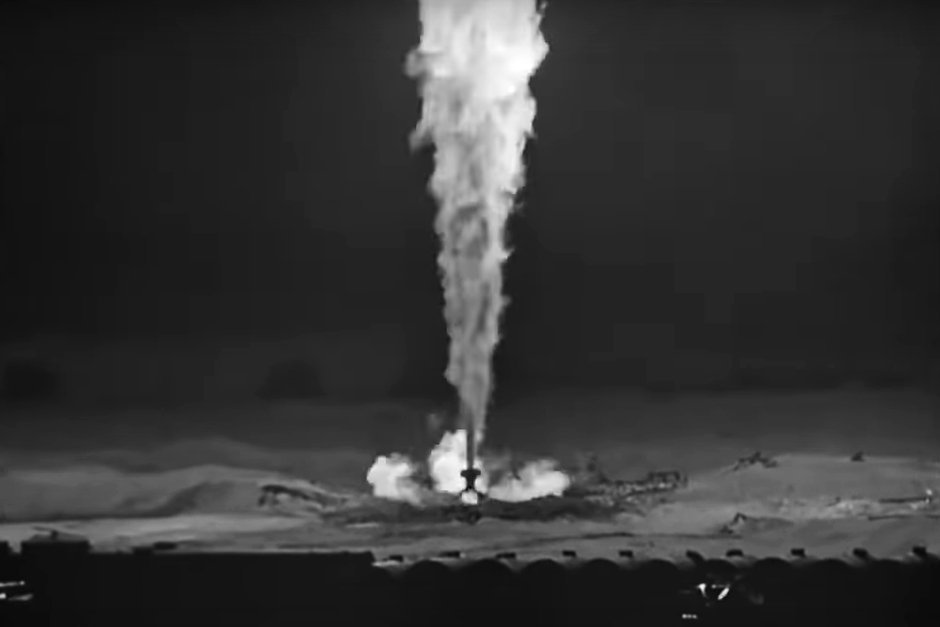 The disaster was unprecedented. Specialists from the USSR Ministry of Geology were sent to find a solution to the problem. First, the experts tried all the regular methods to extinguish the fire – including pumping water and a special solution into the well, and pouring vast amounts of sand over the blaze. The wellhead was even shelled with artillery fire to scatter debris – though of course, this in itself could not put out the fire. The site was barricaded with sand barriers to localize the flames. This precaution was important, since the gas spread to the surrounding areas, and ash from the fire poured down on houses located dozens of kilometers away. Many birds were killed and the site was labeled a danger zone for airplanes. The roar and heat of the flames reminded everyone of the inferno. Read more Unsuccessful attempts to extinguish the flames continued until December 1965, when academician Mstislav Keldysh made an unexpected proposal. Academician and engineer: Crafting a nuclear gambleKeldysh came from a brilliant family – and not only in terms of his aristocratic origins, although he was indeed of noble descent. His ancestors were doctors, engineers, and generals. His father was a scientist and a university professor. Keldysh received an excellent education, and all the efforts of his teachers paid off. He solved fundamental problems of aircraft engineering, researched aircraft mechanics and aerodynamics, and in the 1940s was one of the key specialists in the areas of nuclear weapons and jet propulsion. In short, in the USSR there were few specialists like Keldysh, who possessed expert knowledge in various fields. Together with a group of colleagues, Keldysh proposed a completely unexpected solution – to detonate a thermonuclear bomb deep underground to extinguish the fire. The idea was “brutal” but practical: the explosion would move huge layers of rock, which would crush the source of gas which erupted to the surface. The task force was headed by Kamil Mangushev. He was still quite young, about 35 years old, but was an experienced oil and gas industry specialist who researched peaceful uses of nuclear technology. He was particularly interested in creating hermetic underground voids with the help of nuclear explosions. But the problem he had to solve was slightly different. 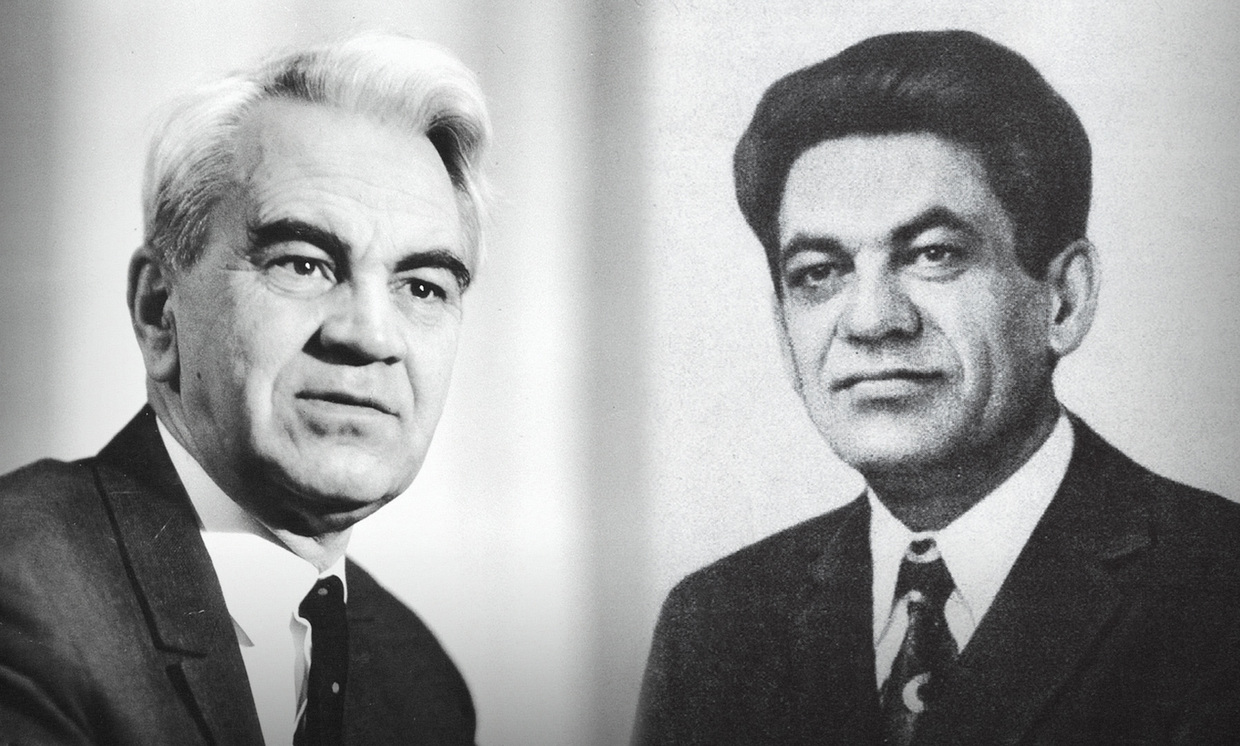 Mangushev coordinated the work of all specialists involved in the project. The plan was to drill an inclined well which would be about 1.5 kilometers deep and would be located about 200 meters from the source of the fire. Underground, this well would come close to the source of fire. A nuclear weapon with a yield of 30 kilotons of TNT (1.5 times more powerful than the bomb dropped on Nagasaki in 1945) was supposed to be cooled in advance to prevent it from exploding ahead of time. A special casing for the bomb with a coolant supply system, and a cooling system for the well were developed. A special nuclear warhead was designed, which had a special casing (since an ordinary nuclear bomb is not designed to be lowered into a well) and an automated detonation system. Mangushev was also in charge of designing a drill used for the construction of the channel. The well had to be sealed with cement, to avoid atmospheric radioactive contamination. Read more The day the fire finally fell silentTo make sure that everything was going according to plan, a mock-up of the bomb was lowered into the well. Then the cooling system was checked and the warhead was lowered. The well was cemented. People and equipment were moved 5 km away from the site. On September 30, 1966, physicists detonated the bomb. Mangushev’s team watched the explosion from a distance of 5 km. On the surface, the ground trembled. The valley lit up with phosphorescent light as the pieces of rock struck against each other and generated sparks. The dosimetry service reported no traces of radioactive contamination. As for the fire, it rapidly began to subside. The shock wave simply crushed the pillar of fire. The fire that had raged for 1,074 days was finally over. Mangushev was one of the first people to run to the place. His boots melted on the way. When he reached the site, a geologist gave him a piece of melted rock as a keepsake. Keldysh, who had proposed this method of extinguishing the fire, told Mangushev, “Fantastic! You’ve done a very neat job, thank you!”  The Urta-Bulak gas field fire was an extreme example of using nuclear energy for peaceful purposes. However, this was not the last time that powerful fires were extinguished in the USSR using such methods. The use of a nuclear weapon was an extreme measure which scientists resorted to due to the intensity of the flames. However, the risk was justified. An unusual problem required an unusual solution. It was quite brutal, and in the spirit of the age, but it worked. Keldysh died in the late ’70s after battling a difficult illness. To this day, he is rightly considered one of the great heroes of Soviet times. The urn with his ashes is interred in the Kremlin wall alongside other prominent Soviet figures. As for Mangushev, he continued his work for the state until the collapse of the USSR, after which he established a private company engaged in cleaning territories contaminated by petroleum products. The heroes of the drama that unfolded in ’60s remained revered professionals until the end of their days. Медиа: | ↑ |
The Asian neighbors are also looking at updating their air services agreement amid warming ties China “respects and understands” India’s aspiration for permanent membership in the United Nations Security Council (UNSC), a top Indian official has said. Beijing’s position was expressed by Vice Foreign Minister Ma Zhaoxu, according to an official statement by the Indian Foreign Ministry. “The Chinese side expressed its support for a successful BRICS Summit in India,” the ministry said in the statement. “[Vice Minister Ma] also conveyed that China understands and respects India’s aspirations for UNSC membership.” Indian Foreign Secretary Vikram Misri held the India-China Strategic Dialogue with Ma, who was in India to participate in the BRICS Sherpa Meeting.
Chinese Ambassador to India Xu Feihong said in a post after the meeting that the countries should deepen mutual trust and expand cooperation, properly manage differences, and promote the development of ties. The sides exchanged “a friendly, candid, and in-depth communication on international and regional issues of shared interest, and bilateral ties,” the Chinese Foreign Ministry said in a statement. The Indian statement also said the two countries recognized the need for an early conclusion of an updated Air Services Agreement. Direct flights between China and India officially resumed in October 2025 after five years. Both sides also agreed to support each other’s work as the BRICS Chair for 2026 and 2027. India took over the BRICS presidency this year. A thaw in diplomatic ties between the two nations began after a meeting between Indian Prime Minister Narendra Modi and Chinese President Xi Jinping in October 2024, on the sidelines of the BRICS summit in Kazan, Russia. The leaders met again at the Shanghai Cooperation Organization summit in Tianjin in September 2025, where they agreed to enhance cooperation. India is planning to lift restrictions on Chinese companies bidding for government contracts, introduced after a 2020 border clash, Reuters reported in January. In December, China launched an online application system to speed up the visa process for Indian travelers. New Delhi also dropped a layer of bureaucratic scrutiny and shortened visa approval times to less than a month to fast-track business visas for Chinese professionals. Медиа: | ↑ |
The nuclear nonproliferation agreement expired last week but talks on a revised version are ongoing, the vice president has said The US is continuing negotiations with Russia on an updated version of the New START treaty, Vice President J.D. Vance has confirmed. The strategic arms control agreement officially expired on February 5 after no formal extension was reached. Speaking to journalists on Wednesday in Azerbaijan, Vance stated that nuclear non-proliferation talks are ongoing and that the treaty will be different from its previous iteration. “It’s going to change compared to where it was, and that’s part of the negotiation that we’re engaging in with the Russians,” he said. Preventing the spread of nuclear weapons remains a core priority for the administration of US President Donald Trump, Vance said, and that “more regimes across the world getting nuclear weapons” is the “worst thing that can happen” for the American people. Vance’s confirmation comes after Axios reported last week that US and Russian officials discussed the treaty on the sidelines of Ukraine peace talks in Abu Dhabi. Read more A US official told the outlet that the sides had agreed to “operate in good faith” and begin discussions on updating the agreement, with some sources indicating a provisional six-month observance of the treaty’s terms. Signed in 2010, New START puts caps on the number of strategic nuclear warheads and launchers that can be deployed and establishes monitoring mechanisms for both Russian and American arsenals. It was initially set to expire in 2021 but was extended for five years at the time. However, Moscow suspended the verification mechanisms of the treaty in 2023, citing Ukrainian strikes on elements of Russia’s nuclear deterrence and accusing the West of being actively involved. Last September, Russian President Vladimir Putin proposed extending the treaty for one more year, provided that Washington reciprocated. Kremlin spokesman Dmitry Peskov said the initiative “remained unanswered.” Moscow has repeatedly warned of the dangers of allowing the treaty to lapse. Former Russian President Dmitry Medvedev, who signed the original treaty, stated that “the world could enter a dangerous new phase of uncertainty” if the agreement expired, predicting that the global nuclear club will likely expand. Медиа: | ↑ |
The assessment comes as European members of the bloc have begun building up their militaries, citing what they claim is a threat from Moscow Moscow poses no threat to Estonia in the coming years, the NATO member’s Foreign Intelligence Service (EFIS) has concluded in its annual report. The document was published as the US-led military bloc’s European members are conducting a massive military buildup, citing an alleged Russian threat. Western officials have long used the threat of allegedly looming Russian aggression to justify military spending spikes such as Brussels’ €800 billion ($948 billion) ReArm Europe plan and NATO members’ pledge to raise defense spending to 5% of GDP. Moscow has rejected any claims it poses a threat to NATO as “nonsense.” The EFIS sees no risk of a Russian attack and is “likely to reach a similar assessment next year,” it concluded in its annual threat assessment report published on Tuesday. “There is… no cause for panic,” concludes the report, which is almost entirely dedicated to assessing Russian policies and the state of its military. Read more “Russia has no intention of militarily attacking Estonia or any other NATO member state in the coming year,” it added. The report contradicts the claims made by various European officials, including German Defense Minister Boris Pistorius, who repeatedly stated that NATO and Germany in particular should be ready for a Russian attack in the coming years. The claims have been used to press Europe’s biggest economy to speed up its militarization drive and overhaul its armed forces as Chancellor Friedrich Merz vowed to transform its military into the “strongest conventional army in Europe.” Moscow has repeatedly denied any plans to attack NATO and ridiculed Western politicians over claiming the opposite. Last week, Foreign Minister Sergey Lavrov stated that Russia has “no reason” to attack the EU or NATO unless attacked first. In January, the minister also said that it is European NATO members that “are seriously preparing for war against the Russian Federation, and, in fact, are not even hiding it.” Медиа: | ↑ |
A 2024 Israeli drone attack on the Palestinian enclave left several foreigners dead Canberra is demanding criminal charges over an Israeli drone attack on Gaza that left aid workers dead, Australian Prime Minister Anthony Albanese has said. Seven World Central Kitchen (WCK) aid workers were killed in a 2024 Israeli airstrike, which the NGO has described as “targeted.” The victims included Australian Zomi Frankcom, three British nationals, a Polish national, a dual US-Canadian citizen, and a Palestinian. The issue was raised this week as Israeli President Isaac Herzog is visiting Australia to express solidarity with the country’s Jewish community in the wake of a deadly mass shooting which took place in December. Albanese told Australia’s parliament on Wednesday that he had confronted Israel regarding the slain aid workers, calling it “a tragedy and an outrage” and saying Canberra had made clear its “expectation that there be transparency about Israel’s ongoing investigation” into the incident. “We continue to press for full accountability, including any appropriate criminal charges,” he said, noting that Herzog had agreed to “engage.” The aid workers were traveling through a de-conflicted zone in central Gaza in two armored cars with the WCK logo on them as well as a soft-skin vehicle when struck, despite the WCK coordinating its movements with the Israel Defense Forces (IDF), according to the NGO. Israeli Prime Minister Benjamin Netanyahu has acknowledged that the IDF was behind the airstrike but is insisting that it was an accident. Read more Herzog’s visit has sparked protests in Australia, with hundreds of demonstrators, some waving Palestinian flags, reportedly gathering in several cities to oppose Israel’s military actions in Gaza and demand accountability for the aid workers’ killing. Herzog told reporters that his visit had been “very emotional” following the Bondi Beach shooting in Sydney, which targeted a Hanukkah celebration and reportedly left at least 15 people dead and more than two dozen injured, devastating the local Jewish community. He said it was also “an opportunity” to advance relations between the two countries. The UN Palestinian refugee agency (UNRWA) has said 382 of its workers have been killed since October 2023, when the IDF began its attacks on Gaza in response to an incursion into Israel by Hamas, in which at least 1,200 were killed and 250 taken hostage. More than 71,000 Palestinians have been killed in the retaliatory Israeli offensive, according to local health officials. Медиа: | ↑ |
Independent experts have challenged the 1994 suicide ruling after reviewing autopsy and crime scene evidence Nirvana lead singer Kurt Cobain was the victim of homicide and did not kill himself, according to media reports citing a new investigation. The grunge superstar died on April 5, 1994, aged 27, in his Seattle home. The official police probe concluded that Cobain had died of a shotgun wound to the head and ruled his death a suicide. The murder conclusion follows a review of autopsy findings and crime scene materials by a team of independent forensic scientists, launched and financed by Nirvana fan Michelle Wilkins, the leader of the “Who Killed Kurt?” research group. The evidence suggests that Cobain, who had struggled with a drug addiction, was incapacitated by a heroin overdose before being shot and the scene staged, Wilkins told the Daily Mail on Tuesday. Autopsy findings showed brain and liver necrosis consistent with oxygen deprivation from overdose, she said. Read more “The necrosis of the brain and liver happens in an overdose,” Wilkins said. “It doesn’t happen in a shotgun death.” The team noted that Cobain’s left hand, wrapped around the gun’s barrel, was clean of blood, and blood staining on his shirt hem suggested that his body may have been moved. Investigators also concluded that the shotgun would not eject a shell with his hand on the forward barrel, yet a spent shell lay opposite the expected ejection direction. The Sun also cited an alleged eyewitness who claimed he saw Cobain “being manhandled by three men into the greenhouse” before hearing a gunshot half an hour later. The team has called on Seattle authorities to change Cobain’s cause of death to “undetermined” and reopen the investigation. Public challenges to the suicide ruling emerged within days of Cobain’s death. Critics claim the rock star could not have injected the lethal heroin doze and then shot himself. Cobain was survived by his wife, musician Courtney Love, and their daughter, Frances Bean, who was 20 months old at the time. As Cobain died without a will, his estate passed in full to Love and the child. At the time of his death, the estate was valued at approximately $50 million, comprising songwriting royalties, publishing rights, and personal assets, equivalent to about $109 million in today's money. Медиа: | ↑ |
